












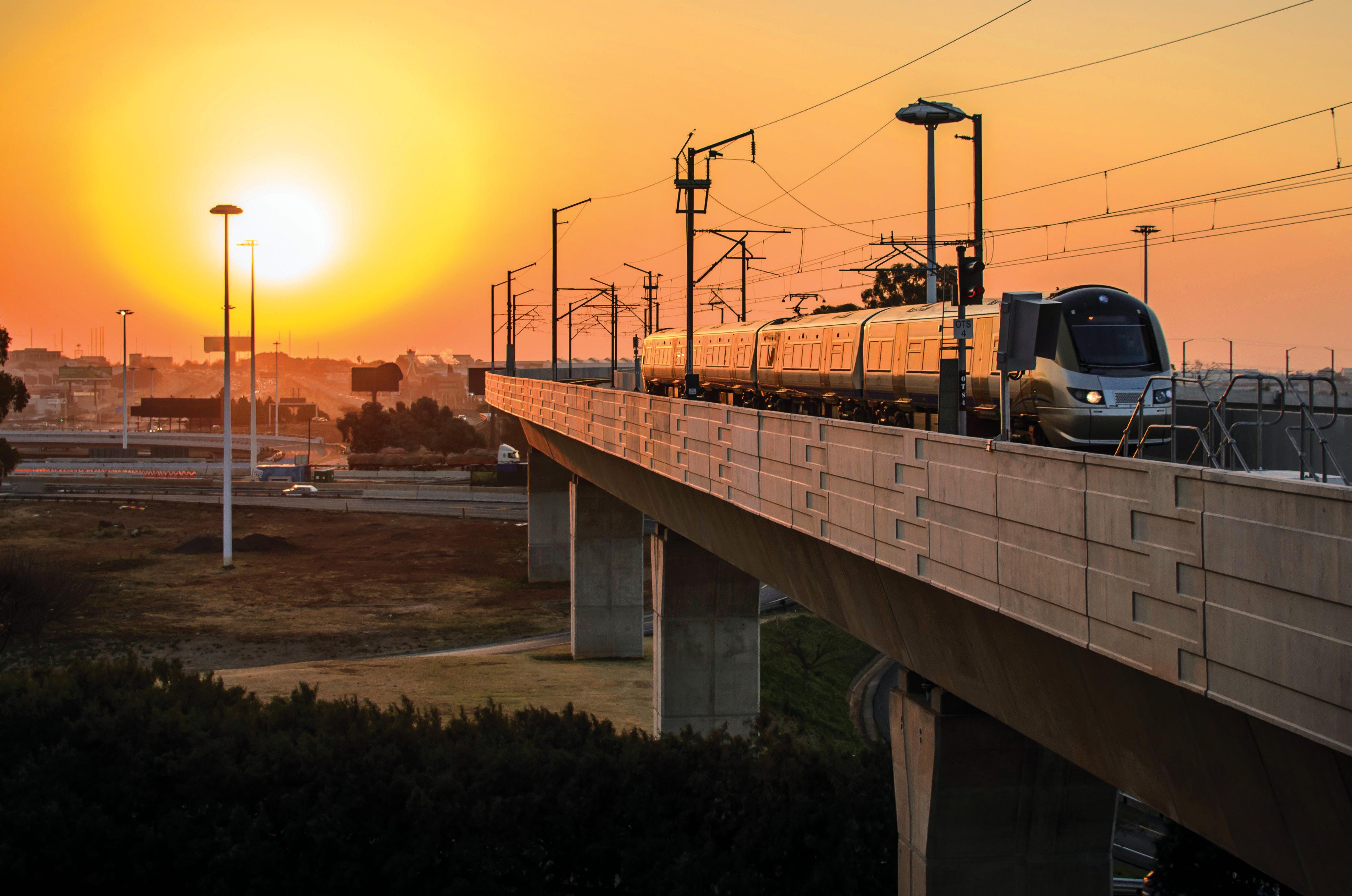
The Gautrain is not just a transport project, it is an economic development project focusing on reaching objectives of stimulating economic growth and job creation, promoting investment and new development.

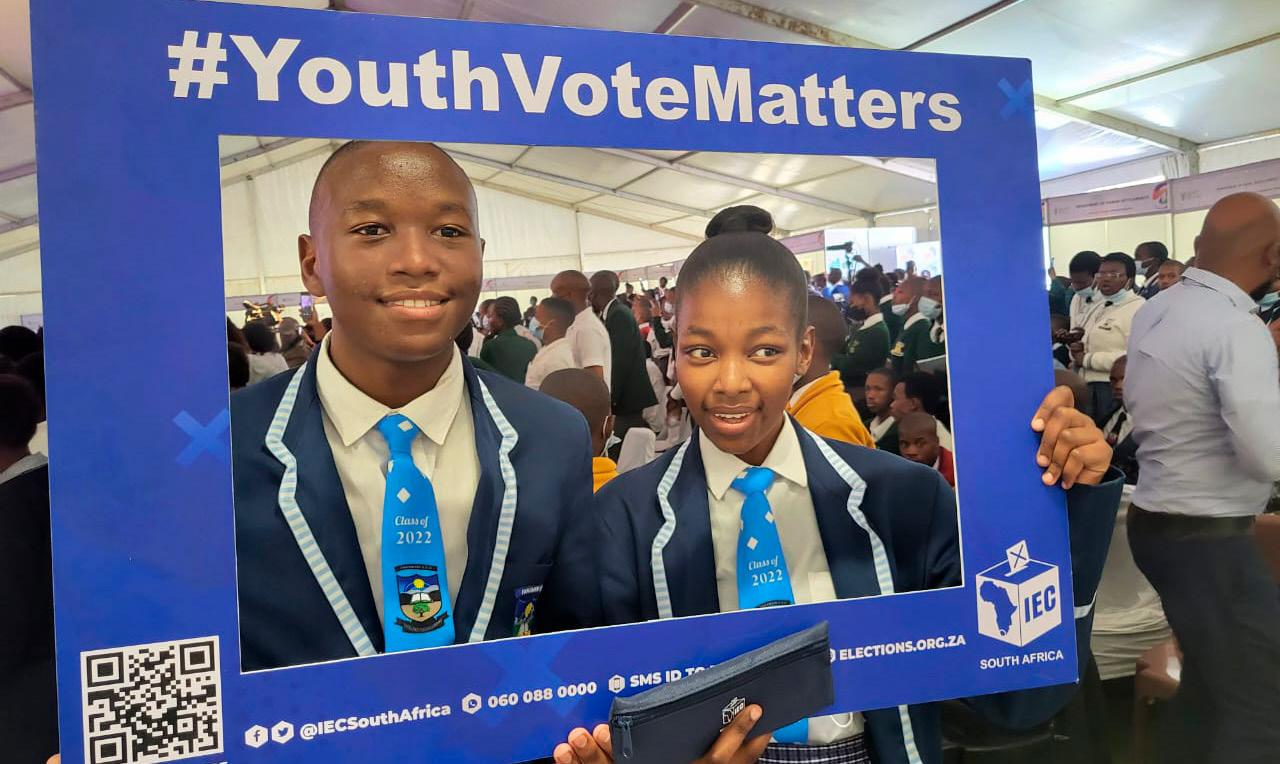
"On 27 April 1994, millions of South Africans cast their ballot in the first democratic election, many for the first time in their lives. That momentous day was the culmination of centuries of struggle for freedom, the struggle to liberate our people from suffering and oppression, from dispossession and exploitation, from poverty and inequality.
"Over the last three decades, government has been on a journey, striving to transform the lives of millions of South Africans, providing the necessities of life and creating opportunities that never existed before."
- President of South Africa, Cyril Ramaphosa
In his 2024 State of the Nation Address (SoNA), President Cyril Ramaphosa also stated that, “Just as we cannot deny the progress South Africans have made over the last 30 years, we should not diminish the severe challenges that we continue to face.”
As we celebrate 30 Years of South Africa’s
Democracy, Municipal Focus looks at the strides that have been made by government, and in collaboration with the private sector and civil society, that has impacted our lives and brought us to a new era of hope, reconciliation and nation building.
Our Front Cover Feature focuses on the countdown to the historic 2024 elections to be held on the 29 May 2024. In the words of Chairperson of the Electoral Commission, Mosotho Moepya, “It is a moment for citizens to exercise their democratic right, hold their leaders to account, and shape the direction of the country.”
In line with the celebration, the Department of Sport, Arts and Culture (DSAC) takes pride in showcasing our national symbols and national orders.
The MTN SA Foundation, a proud contributor to the development of our country and supporter of our communities, have tackled the digital divide by equipping the youth

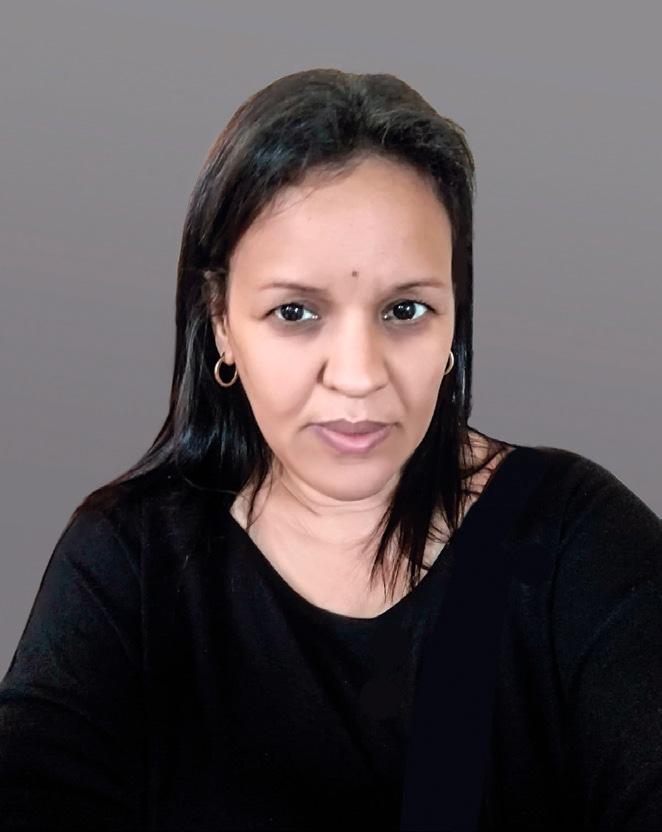
with ICT skills that will enhance their longterm career prospects.
The Leadership Academy for Guardians of Governance in a quest to supply South Africa with high-performing credible and reliable Governance, Risk and Compliance professionals, has unpacked their value proposition of in-house, on-line and mobile training programmes. Lead by CEO Shirlene Sidall, the Academy will host its inaugural annual Leadership Academy Governance Conference this year.
Our Municipal News section looks at the homes that have been handed over to citizens of the Bitou Municipality, the new state-of-the-art Takealot Distribution Centre in eThekwini that will bolster the economy, and the impressive state-of-theart newly constructed Middleburg Hospital in the Steve Tshwete Local Municipality in Mpumalanga, amongst other local government initiatives.
This edition is about the determination of all South Africans to continue to build an inclusive, prosperous and resilient South Africa for all who live here.
Enjoy the read and keep safe!









36
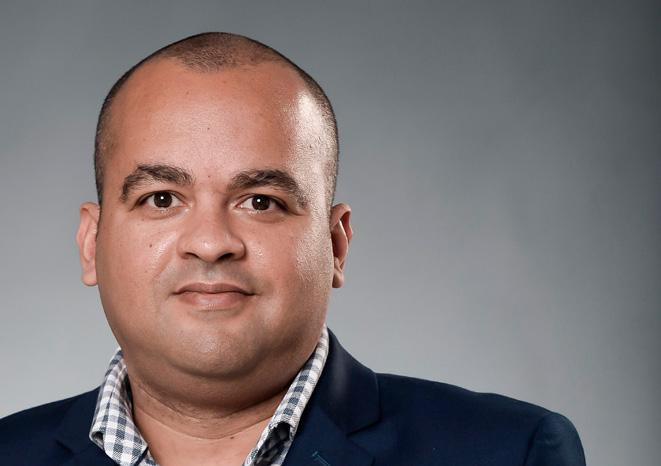

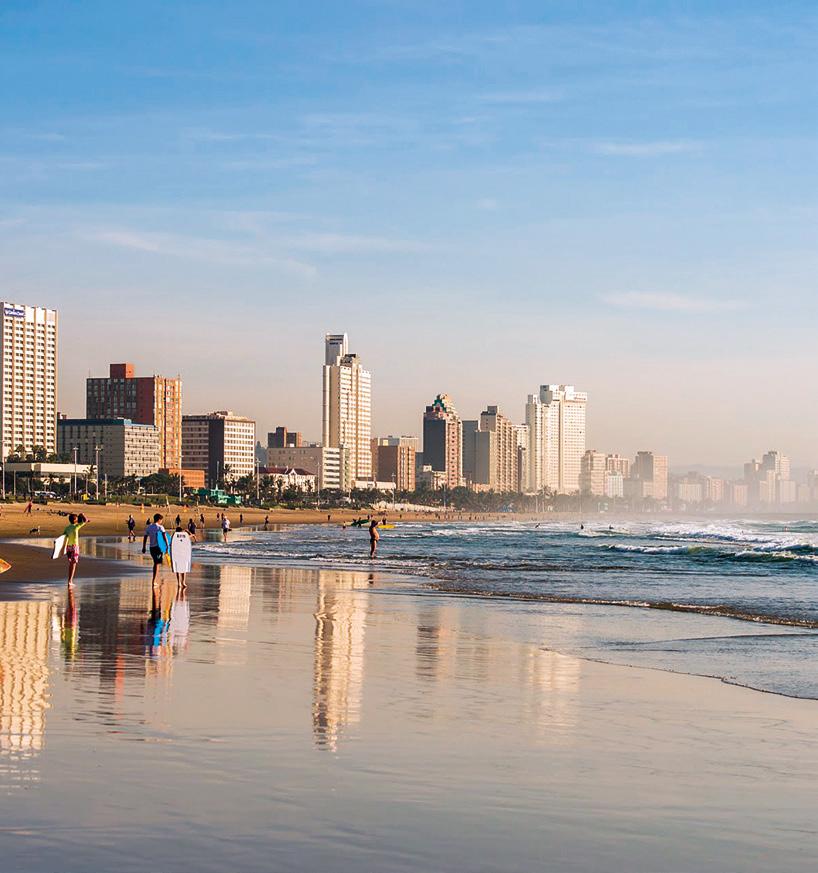

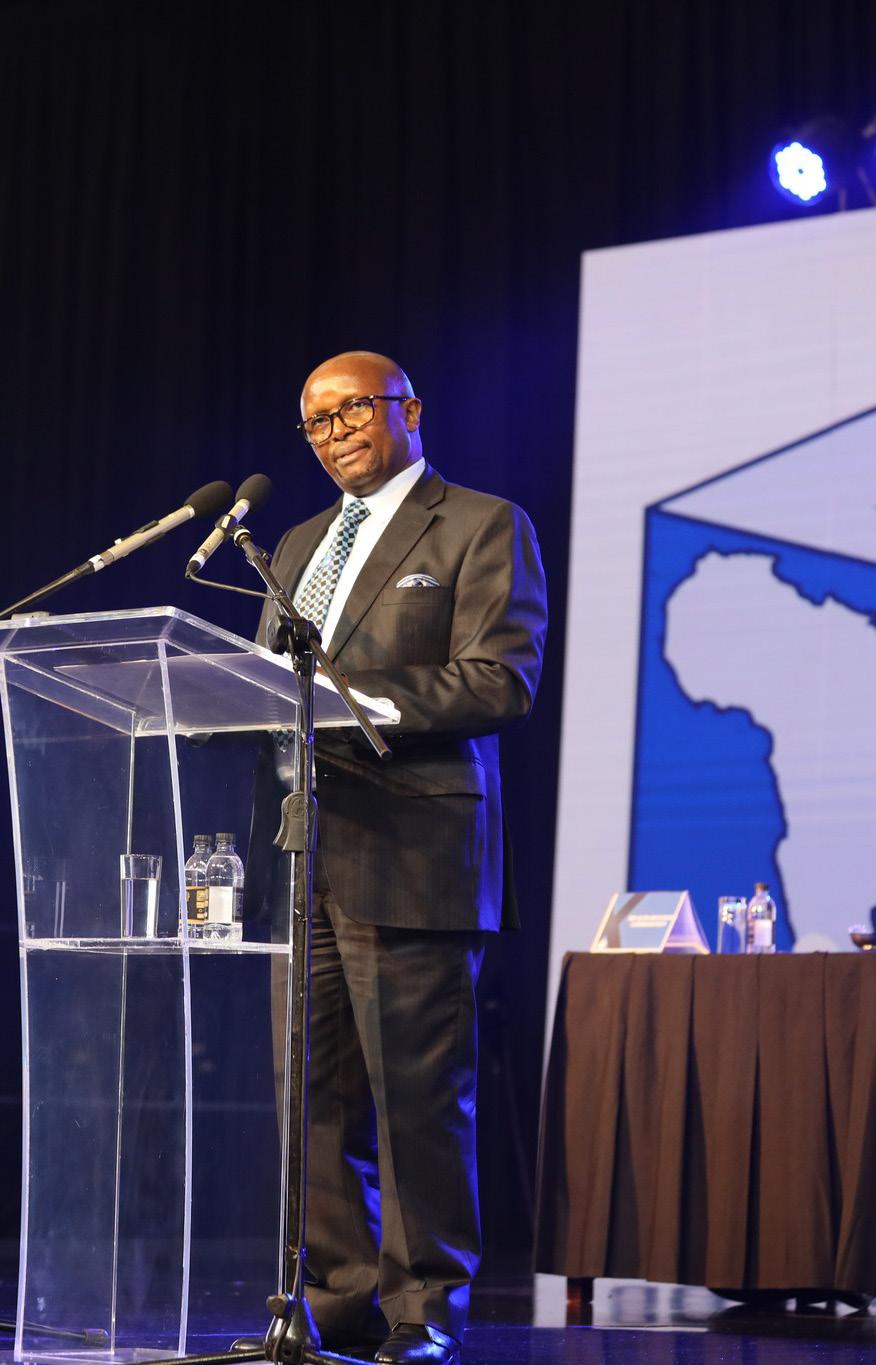
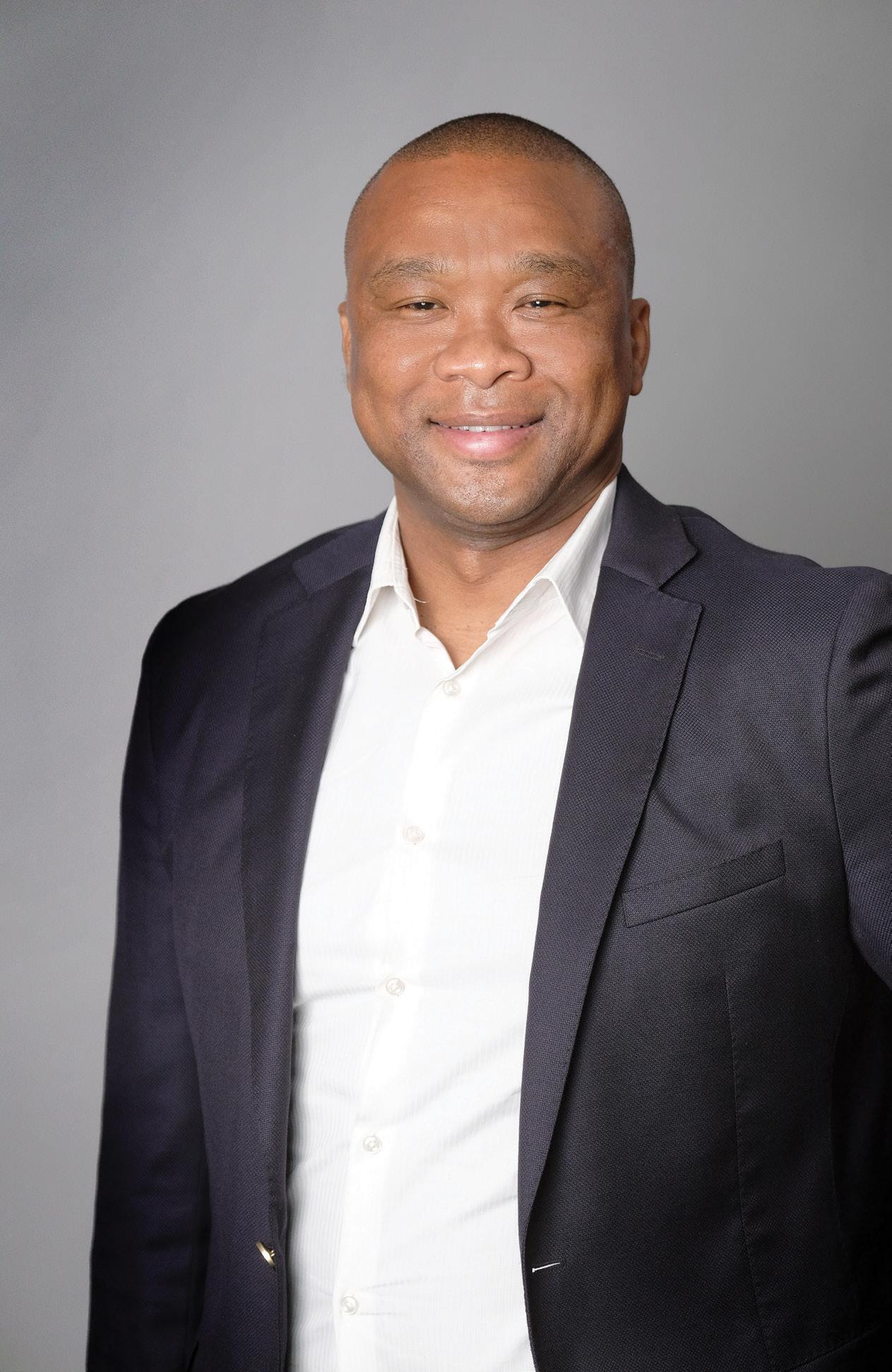


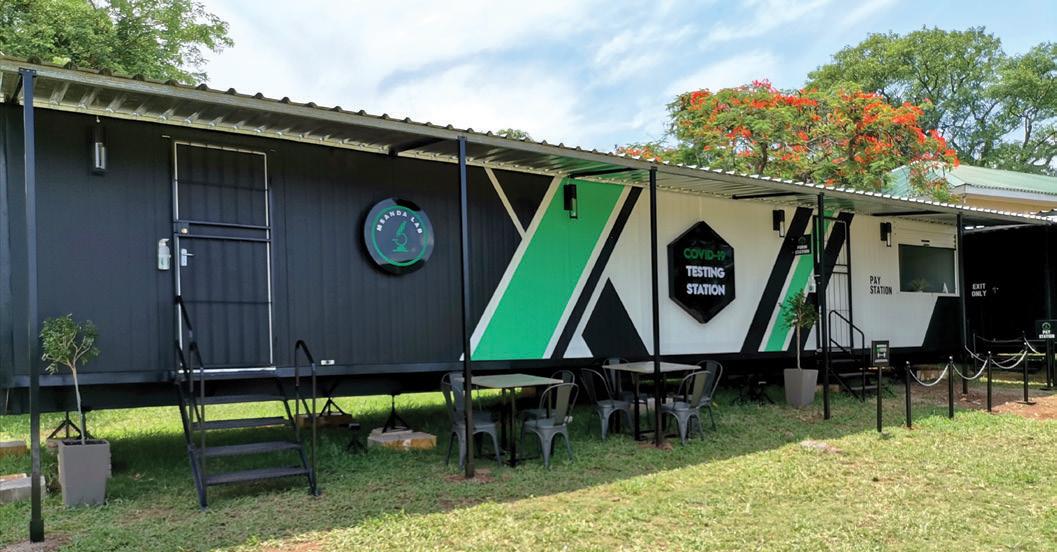
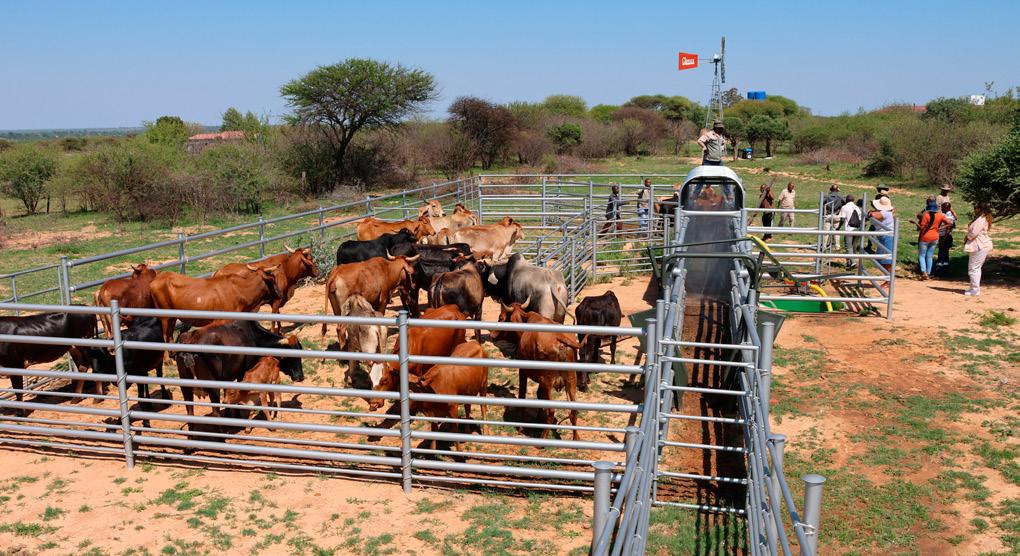
44 MTN SA FOUNDATION - Committed to empowerment in the digital economy
48 NSG-UNICEF - Partnership on a positive rise
50 LEADERSHIP ACADEMY - For Guardians of Governance
54 NRCS - Empowering consumers and ensuring Fair Trade
58 CSOS - Why register your scheme with the CSOS
70
73
74
76 Mangaung
77 Bitou Municipality
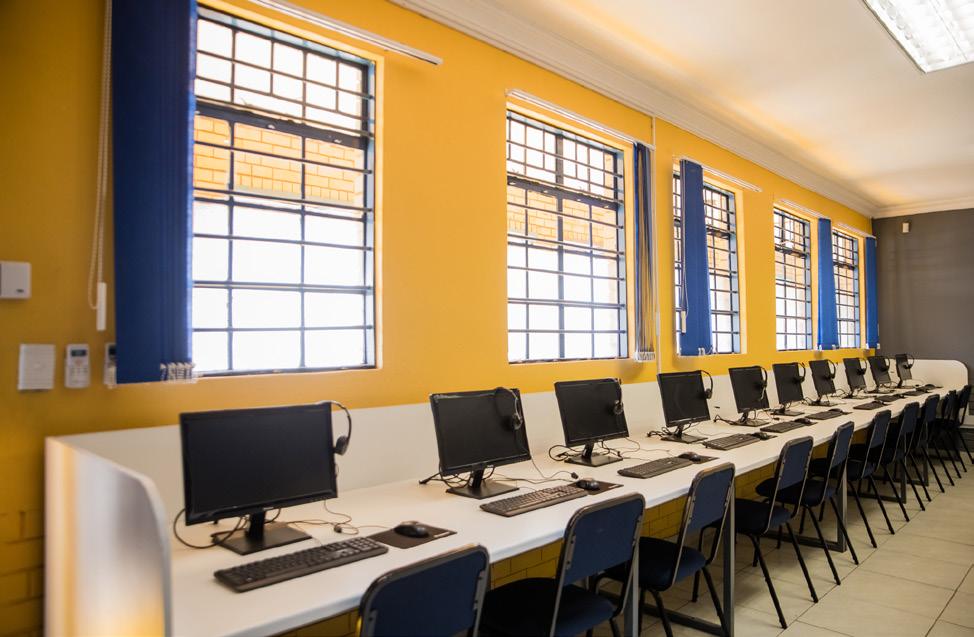
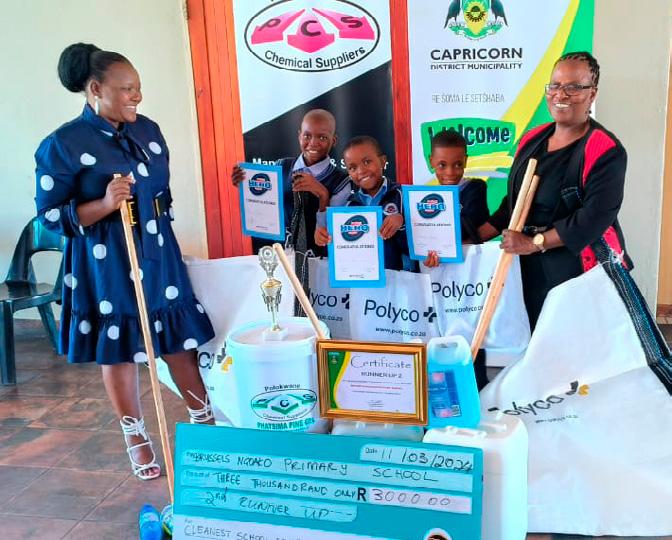

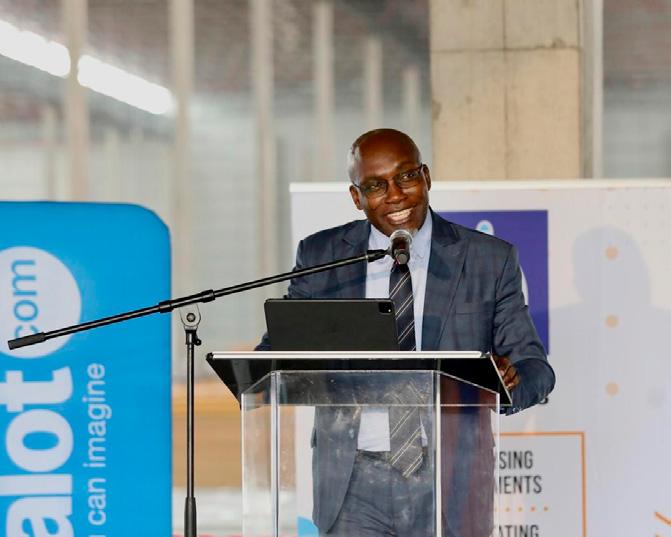
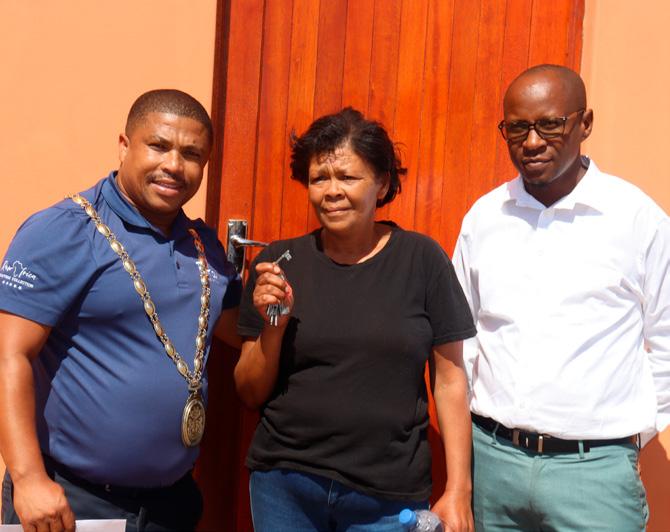





“Communications, Marketing and Advertising are indispensable tools towards success and growth in any business venture…”
“Communications, Marketing and Advertising are indispensable tools towards success and growth in any business venture…”
Kweda Media & Communications offers a diverse range of business and sales solutions, strategies and ideas that are customised to meet our clients’ standards and exceed their expectations.
Kweda Media & Communications offers a diverse range of business and sales solutions, strategies and ideas that are customised to meet our clients’ standards and exceed their expectations.
Our Vision is driven by the passion to inspire, assist and elevate business enterprises by forming strategic collaborations that will yield multiple benefits of success and growth for all.
Our Vision is driven by the passion to inspire, assist and elevate business enterprises by forming strategic collaborations that will yield multiple benefits of success and growth for all.
Kweda Media and Communications is a Proudly South African, 100% black female owned company located in Plumstead, Cape Town, registered as a private company since May 2014 - we hold a level 1 B-BBEE certificate. We are a team of multi skilled staff members who have a fresh, innovative and diverse approach to working and always willing to put in the extra time and attention to ensure great service delivery on time.
Kweda Media and Communications is a Proudly South African, 100% black female owned company located in Plumstead, Cape Town, registered as a private company since May 2014 - we hold a level 1 B-BBEE certificate. We are a team of multi skilled staff members who have a fresh, innovative and diverse approach to working and always willing to put in the extra time and attention to ensure great service delivery on time.
Your vision… our drive
Your vision… our drive
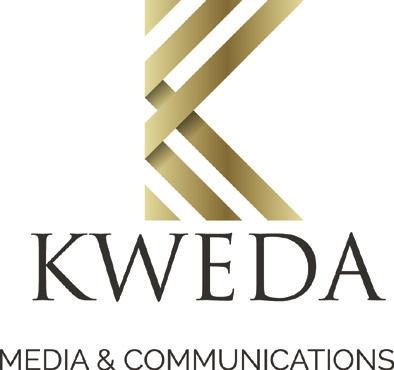
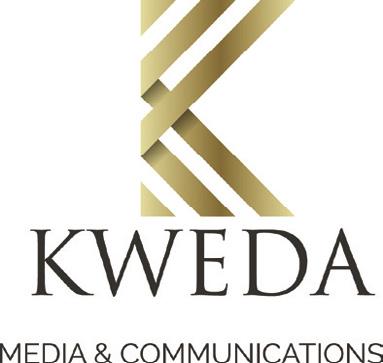





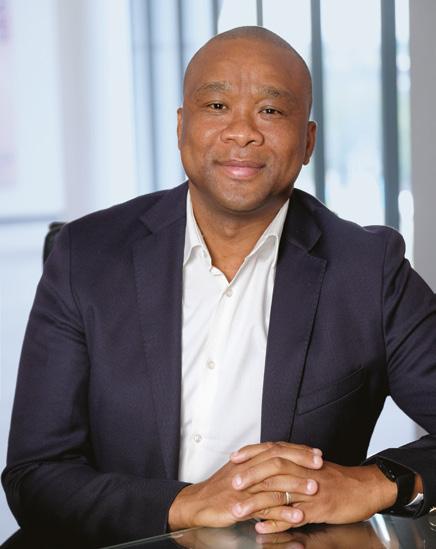
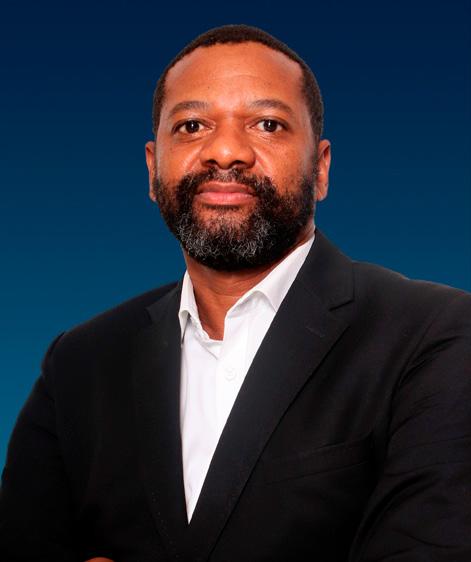
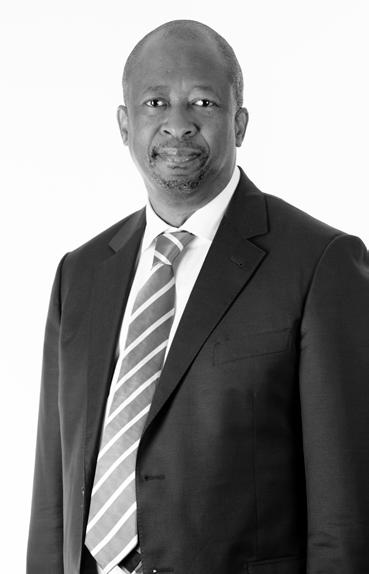
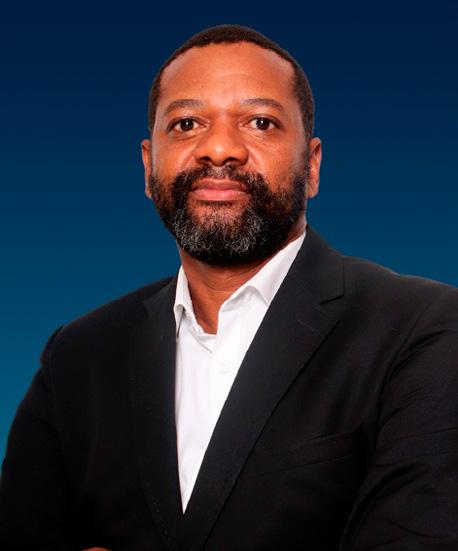
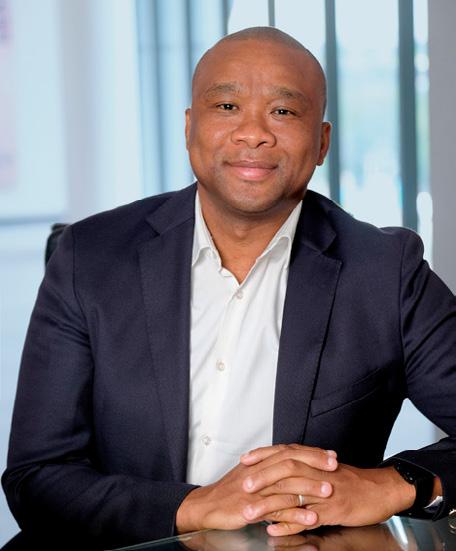
PUBLISHING EDITOR
PUBLISHING EDITOR Nardine Nelson nardine@kwedamedia.co.za +27 82 739 3932
(IEC) Chairperson: Mosotho Moepya
SITHOLE MBANGA
nardine@kwedamedia.co.za
+27 82 739 3932
Nardine Nelson nardine@kwedamedia.co.za +27 82 739 3932
EDITORIAL CONTRIBUTORS
EDITORIAL CONTRIBUTORS
Contributors
Happy Nkhoma
Isaac Mahlangu
Contributors Happy Nkhoma
Madala Thepa
Jamie Louw
Isaac Mahlangu Madala Thepa
Nwabisa Pondoyi Madala Thepa
Nwabisa Pondoyi
Jan Venter
Madala Thepa
MAGAZINE DESIGN & LAYOUT
MAGAZINE DESIGN & LAYOUT
MAGAZINE DESIGN & LAYOUT
Digital Pixels Studio
MAGAZINE DESIGN & LAYOUT Digital Pixels Studio Paul Sampson paul@digital-pixels.co.za
KCDA Design Agency Jaco Kotze jk@kcda.co.za
Digital Pixels Studio Paul Sampson paul@digital-pixels.co.za
Paul Sampson paul@digital-pixels.co.za
Advertising
Advertising
Zelda McKop zelda@kwedamedia.co.za Bongani Matwa bongani@kwedamedia.co.za
Advertising Mphumzi Njovana mphumzi@kwedamedia.co.za Nazly Leite nazly@kwedamedia.co.za
Advertising Mphumzi Njovana mphumzi@kwedamedia.co.za Nazly Leite nazly@kwedamedia.co.za
Advertising Mphumzi Njovana mphumzi@kwedamedia.co.za Nazly Leite nazly@kwedamedia.co.za
Nazly Leite nazly@kwedamedia.co.za
Mphumzi Njovana mphumzi@kwedamedia.co.za Nazly Leite nazly@kwedamedia.co.za
Production
Production production@kwedamedia.co.za
Production
Production production@kwedamedia.co.za
Production production@kwedamedia.co.za
Rayhaan Suleiman production@kwedamedia.co.za
Rayhaan Suleiman production@kwedamedia.co.za
Administration
admin@kwedamedia.co.za
Administration Tameryn Moses tameryn@kwedamedia.co.za admin@kwedamedia.co.za
Administration Tameryn Moses tameryn@kwedamedia.co.za admin@kwedamedia.co.za
Administration/Finance Tameryn Moses tameryn@kwedamedia.co.za
Marketing / Distribution Nozi Mbanjwa marketing@kwedamedia.co.za
CEO: SA CITIES NETWORK
SIMO MKHIZE
SITHOLE MBANGA
CCO:
IEC Chief Electoral Officer (CEO): Sy Mamabolo
CEO: SA CITIES NETWORK
CCO: CELL C
DISTRIBUTION
DISTRIBUTION
National Assembly, National Municipalities:
GCIS, Assembly, National Provincial Municipalities:
GCIS, National Assembly, NCOP, National & Provincial Departments, Municipalities: Mayors, Managers, Heads of Procurement, Tenders and Purchasing Officers, Conferences and the Private Sector
GCIS, National Assembly, NCOP, National & Provincial Departments, Municipalities: Mayors, Managers, Heads of Procurement, Tenders and Purchasing Officers, Conferences and the Private Sector
Officers, Conferences Sector
Procurement, Tenders and Purchasing Officers, Conferences

DIGITAL E-BOOK CREATION
DIGITAL E-BOOK CREATION

www.digital-pixels.co.za
www.KCDA.co.za
www.digital-pixels.co.za
PUBLISHED BY
PUBLISHED BY
PUBLISHED BY
Media
1
Communications
Communications
Kweda Media & Communications
Kweda Media & Communications
Village Main Road, Plumstead, Cape Town
1 The Village Square, Main Road, Plumstead, Cape Town
1 The Village Square, Main Road, Plumstead, Cape Town
1 The Village Square, Main Road, Cape
Tel: +27 (21) 768 0115
Tel:
Tel: +27 (21) 768 0115
Tel: +27 (21) 768 0115
+27 (21) 768 0115
www.kwedamedia.co.za
www.kwedamedia.co.za
www.kwedamedia.co.za
www.kwedamedia.co.za






Administration subscriptions@kwedamedia.co.za
subscriptions@kwedamedia.co.za
Subscriptions / Distribution subscriptions@kwedamedia.co.za
Subscriptions / Distribution subscriptions@kwedamedia.co.za
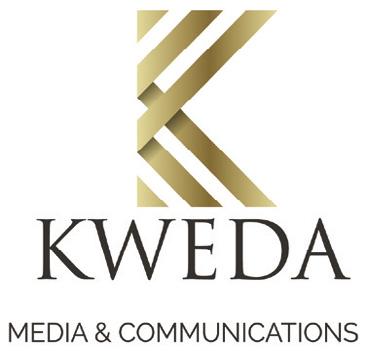
All editorial, business and production correspondence should be addressed to Municipal Focus, PO Box 12454 Plumstead 7800. Manuscripts, illustrations and other material must be accompanied
editorial, and production correspondence should be addressed to Municipal Focus, PO Box 12454 Plumstead 7800. Manuscripts, illustrations and other material must be accompanied by a stamped, self-addressed envelope. No responsibility can be accepted for unsolicited material. The editor reserves the right to amend and to alter copy and visual material as deemed necessary. Copyright by Kweda Media & Communications. All rights reserved. No part of this publication may be reproduced, stored in a retrieval system or transmitted by any form or any means without prior permission of the publisher. The opinions expressed in Municipal Focus are not necessarily those of the publishers.
All editorial, business and production correspondence should be addressed to Municipal Focus, PO Box 12454 Plumstead 7800. Manuscripts, illustrations and other material must be accompanied by a stamped, self-addressed envelope. No responsibility can be accepted for unsolicited material. The editor reserves the right to amend and to alter copy and visual material as deemed necessary. Copyright by Kweda Media & Communications. All rights reserved. No part of this publication may be reproduced, stored in a retrieval system or transmitted by any form or any means without prior permission of the publisher. The opinions expressed in Municipal Focus are not necessarily those of the publishers.


Nedbank is committed to being the business banking partner for the public sector. Our bigger-picture approach to banking is designed to provide groundbreaking solutions for your municipality. With the expertise and knowledge of our community specialists, we can ensure continuity, accessibility and quick decision-making that guides your business growth.
Think bigger.
Think Nedbank Commercial Banking.

For more information email us at publicsector@nedbank.co.za.














With little over two months remaining until election day on 29 May 2024, the Electoral Commission (IEC) is diligently orchestrating preparations for what promises to be landmark seventh general elections in South Africa's political democratic history.
As South Africa marks three decades of democracy since the end of apartheid, it stands at a crucial juncture in its history. The upcoming 2024 National and Provincial Elections hold immense significance as they represent another milestone in this journey of transformation and consolidation of the country’s democratic ideals.
“The 2024 Elections present an opportunity for South Africans to reaffirm their commitment to democracy and chart the course for the nation's future. It is a moment for citizens to exercise their democratic rights, hold their leaders to account, and shape the direction of the country,” says Electoral Commission (IEC) Chairperson Mosotho Moepya.
Chairperson Moepya emphasises the IEC’s unwavering commitment to upholding electoral integrity, stating: "Our primary objective is to ensure that the electoral process remains transparent, credible, and reflective of the will of the people."
IEC Chief Electoral Officer (CEO) Sy Mamabolo echoes this sentiment, underscoring the meticulous planning involved in executing a seamless Election Timetable. “From certification of the national common voters’ roll to candidate nominations to the enforcement of the Electoral Code of Conduct and, finally, to the design and
printing of the ballots, every aspect of the electoral process demands meticulous attention to detail,” he affirms.
The IEC welcomed proclamation of the election date on 23 February 2024, noting that it provided an unambiguous motivation for the IEC to pull out all the stops in the intensification of preparations for Election Day. The election is guided by the legally binding Election Timetable, as gazetted on 24 February 2023.
The announcement came after successful voter registration campaign which included two general registration weekends, an overseas voter registration drive, campus activations and registration within Correctional Services centres. Following this voter registration campaign, the voters’ roll now stands at 27.8 million voters.
The formal proclamation of the election date, 29 May, followed two days later on 23 February 2024, signalling the closure of the voters’ roll.
A day later, on 24 February 2024, the IEC published the Election Timetable in the Government Gazette after consultation with the National Party Liaison Committee.
Mamabolo delves into the intricacies of the 2024 election cycle, clarifying that the Election Timetable will outline the various cut-off dates for the performance of certain electoral activities.
Significant dates on the timetable relate to:
• Certification of the voters’ roll
• Publication of voting station addresses
• Political party and independent candidate nomination
• Notice to vote outside of the >
country, known as the VEC 10 process
• Notice to vote outside of a voters’ voting district, known as the Section 24 a process
• Applications for special votes.
Find the full Election Timetable on the IEC’s website, www.elections.org.za.
Commenting on reports that some political parties were unhappy about the timetable, Mamabolo stressed that the release of the Election Timetable should not have come as a surprise to political parties wanting to contest the May elections.
“Anyone who is preparing to contest the elections should know that once an election date is proclaimed, the train starts moving because we must follow the Election Timetable. The timelines set out in the election timetable are cast in stone. It is essentially an unstoppable moving train, but let us travel on it together,” he adds.
With various deadlines looming, political parties and candidates are now engaged in a flurry of activities, vying for the electorate's attention and support.
In terms of the legislation, unrepresented political parties and
independent candidates are required to submit signatures to support their contest of a region, and parties not represented in Parliament or the legislature need to submit 15% signatures of the quota that was in the last election.
Mamabolo indicates that the Online Candidate Nomination Portal, first launched ahead of the 2021 Municipal Elections, was open from 26 January 2024 for capturing signatures, and contestants had quite some time to begin the process.
Candidate nomination closed on 8 March 2024, and the IEC is to finalise the lists of parties and candidates contesting the 2024 Elections by 10 April 2024, and will issue certificates to candidates by 12 April 2024.
Mamabolo says at the last count there were 350 registered parties who could nominate a candidate for the elections, so time will tell how many parties and candidates will eventually be contestants.
“For the first time in the country’s history, these candidates will appear on three ballot papers that are to be issued to voters at voting stations.
In previous elections, there were only two ballots, a National Proportional Representation, or PR, ballot for the National Assembly (Parliament), and a Provincial Ballot for the Provincial Legislature of the province.
“Now we have a third ballot which is for the regional seats to the National Assembly,” explains Mamabolo.
He adds that he terms “regional” and “provincial” are used to distinguish between the seats reserved for that region in Parliament (regional seats) and seats in the Provincial Legislatures of that province (provincial seats). A region essentially covers the same territorial area as a province.
Another crucial change in the forthcoming general elections that the IEC is actively creating a heightened awareness of among voters is the requirement that all South African residents are required to vote where they are registered. There are three categories of special votes.
“Firstly, if you plan to be outside your voting district on 29 May, but still in the country, it is now mandatory to notify the Electoral Commission in advance during a specified timeframe in terms of Section 24 A of the Electoral Act,” points out Mamabolo.

"Our primary objective is to ensure that the electoral process remains transparent, credible, and reflective of the will of the people."
The IEC has invested time and resources to encourage youth participation in elections because it helps combat political apathy and disillusionment.

In terms of the Election Timetable, this Section 24 A notification to the IEC to vote in a voting district where you’re not registered to vote must be submitted between 15 March and 17 May 2024, to allow for election administrative planning.
Secondly, voters who wish to vote at the voting station where they are registered, but can’t make Election Day on 29 May for whatever reason, have the option of casting a special vote on the two days prior, that is 27 and 28 May, from 9am to 5pm. Voters must apply for such special votes between 15 April and 3 May 2024.
Lastly, as a South African citizen, your vote knows no boundaries. Whether you reside within or outside the country, you have the right to vote in the national elections (but not provincial elections).
With the new Electoral Amendment Act, voters abroad are no longer obliged to notify the IEC about their voting intentions, unless they intend voting at a different mission or country then where they are currently registered. In this case, they will be required to notify the CEO, just as
South Africans voting in-country are required to do when voting outside of their voting district. These VEC 10 notices are due by 22 April 2024.
Against the backdrop of socio-political upheavals and economic challenges, the electorate's participation assumes heightened significance, symbolising a collective assertion of democratic agency. Anticipation is mounting as South Africa braces for what is expected to be a historic voter turnout.
The IEC is spearheading initiatives to enhance balloting education and foster robust voter turnout. CEO Mamabolo emphasises the significance of voter education, stating, “Empowering citizens with knowledge about their electoral rights and responsibilities is pivotal in ensuring widespread participation in the democratic process.”
Mamabolo is hopeful of voter turnout of 70% of the 27.8 million registered voters in the upcoming general elections, substantially more than the 66% recorded at the general elections
five years ago, fully expecting the youth to drive this turnout.
Amidst the fervour of electoral campaigns, the spectre of disinformation looms large. Chairperson Moepya issues a stern warning against the dissemination of false information, asserting, "In an era marked by digital proliferation, combating disinformation has become an imperative for safeguarding the integrity of our electoral process.”
Recognising disinformation as an emerging threat to free and fair elections, the IEC has partnered with Media Monitoring Africa to use the organisation’s Real411.org platform to govern and engage with disinformation during the election period.
“In addition to reporting disinformation on the platform where it’s shared, instances of disinformation can be reported on the Real411 platform. They will be evaluated by a committee, and if found that the complaint is a meritorious complaint so far as the matter relates to disinformation, >

a number of actions may be taken,” Mamabolo explains.
The consequences of disseminating disinformation included requesting the social media platform in question to take down the post, and depending on the gravity of the disinformation, a warning could also be issued.
Spreading disinformation and misinformation about the elections is prohibited by the Electoral Act, and those who do this could be tried in the Electoral Court once a relevant investigation had been completed. Punishment includes imprisonment of between five and 10 years.
Mamabolo warns that once the Electoral Code of Conduct comes into force on 4 April 2024, acts of disinformation can be escalated to the Electoral Court, but this only relates to independent candidates and political parties.
“Candidates may be removed, and a political party may be barred from participating in the election if it can
be proved that perpetration of the alleged disinformation is at the insistence of that party.”
Mamabolo calls on all role players, including party leaders, supporters and candidates, to exercise restraint and take care when making statements. “Don’t take to a public platform and poison the atmosphere in which the election is going to be taking place. That is anti-democratic and is not in the best interest of our democratic society,” Mamabolo cautions.
The 2024 elections carry profound historical resonance, emblematic of South Africa's enduring commitment to democratic consolidation and inclusive governance. As the nation commemorates the thirtieth anniversary of its first democratic elections, the 2024 polls serve as a poignant reminder of the progress made and the challenges that lie ahead.
Beyond the confines of South Africa, the 2024 elections assume global significance, resonating with the wave of democratic fervour sweeping across nations worldwide. With half the world poised to hold elections in 2024, South Africa's electoral journey stands as a beacon of hope amidst a tumultuous geopolitical landscape.
As South Africa stands on the cusp of history, the countdown to the 2024 elections encapsulates a nation's aspirations, challenges, and collective resolve. With the IEC at the helm, navigating the complexities of democracy's crucible, the path forward beckons with promise and possibility.
South Africa prepares to forge its destiny anew, guided by the beacon of electoral integrity and the indomitable spirit of its rainbow people.
Even before the first ballot is cast, the 2024 National and Provincial Elections have set several unprecedented milestones.
The first major milestone is the recordbreaking registration of 27.8 million eligible voters – the highest number since the dawn of democracy, marking the largest voters' roll in South Africa's history. A comparative analysis of past elections' registered voters showcases the remarkable growth:
On 23 February 2024, President Cyril Ramaphosa proclaimed 29 May 2024 as Election Day, closing voter registration.
Following this, the Electoral Commission will have certified the voters' roll on 12 March 2024.
The national common voters’ roll is a lynchpin for democracy, ensuring inclusivity, fairness, and accountability, contributing to the stability and legitimacy of the democratic system.
An in-depth analysis reveals that 97% of the 27.8 million voters have a complete address recorded. Gauteng leads with 6.5 million registered voters, and the focus on young voters (aged 18-39) has proven fruitful, constituting 42.4% of the total. Female representation continues to be strong, with 55.2% of the voters being women.
Milestone 2: Engaging the Youth through Innovative Campaigns
The second milestone highlights the impressive progress in attracting young voters, a direct outcome of the IEC's dedicated efforts. Utilising digital platforms, it has created animation videos, audio recordings, social media toolkits, infographics, and factsheets to engage young voters not only in person, but also online, on television and on radio.
Encouraging all eligible voters to participate is crucial, especially for the youth, as they make up a significant portion of the population. Their involvement ensures representation, influences policies, promotes civic engagement, and builds a better future.
The IEC has invested time and resources to encourage youth participation in elections because it helps combat political apathy and disillusionment. By actively engaging in the electoral process, the youth can challenge the perception that their voices do not matter or that politics is irrelevant to their lives. By registering and voting, they can demonstrate that they care about the future of their country and are willing to take part in shaping it. Their involvement is vital
for a vibrant, inclusive, and sustainable democratic society.
Milestone 3: Celebrating 30 Years of Electoral Democracy
This election coincides with the 30th anniversary of South Africa's electoral democracy, a testament to the Electoral Commission's constitutional commitment to regular elections. As Time Magazine deems it the "ultimate elections year," over 64 countries worldwide, representing about 49% of the global population, will witness unprecedented voter participation.
Milestone 4: Pioneering Independent Candidates
The fourth milestone marks the first elections allowing independent candidates to contest seats in the National Assembly and provincial legislatures, a result of the Electoral Amendment Act enacted in April 2023. This transformative change has necessitated adjustments in the Electoral Commission's operations to accommodate independent candidates.
Strict criteria have been established for independent candidates, including South African citizenship, residency, and meeting mental and criminal history standards. The election timetable, available on the IEC’s website, www. elections.org.za, outlines crucial dates for contesting parties and independent candidates.
Milestone 5: Transformative Changes in Voting
The fifth milestone represents a historic shift in the voting process, with voters now receiving three ballots instead of two. Despite these changes, South Africa's electoral system retains its two-tier multimember compensatory proportional representation system.
As the nation stands at the threshold of this monumental election, the Commission encourages all eligible voters, including South African citizens abroad, to actively participate. Stakeholders, especially voters, have been prepared through extensive voter education programs.
The 2024 National and Provincial Elections mark a pivotal moment, possibly the last under the current system. Post-election, the Electoral Reform Consultation Panel will commence an investigation, making non-binding recommendations for future electoral system reforms. The active participation of the youth, engagement of stakeholders, and the celebration of 30 years of electoral democracy underscore the significance of this historic event.

2 0
As we look back in history and celebrate our 30th Anniversary of Democracy, there is a lot that we have gained as a country. Our national symbols, may be new, as compared to other countries, but they have made a mark and are recognized internationally. The South African flag, which is our primary identity, is always flown high during international sporting events as well as in the music scene. This is testimony to the never dying spirit of the people of South Africa.
South Africa is a country respected in terms of conflict resolution. The peaceful transformation to democracy was widely observed by the media with interest. Now that South Africa has reached the 30th Anniversary of Democracy, we can look back with pride at the achievements gained thus far. What made this country succeed is a quest for unity and nation building. This quest is best expressed in the national symbols designed since 1994.
Each and every country in the world has national symbols. The raising of the new flag always marks the birth of a new country. This also happened when this country marked the passage from the apartheid era to the dawning of democracy.
National symbols are not innocent graphic works but are strong statements communicated to the citizens of a country, and to the world as a whole. The symbols are designed and used with a clear vision. To us in South Africa, that vision was and still is unity and nation building. This vision was in response to a divided past under apartheid policies. On studying South African national symbols, a common thread can be noticed – that of a quest for nation building and social cohesion.
National Symbols are those symbols adopted by the country and its people. With the dawn of democracy in South Africa, it has been an imperative matter to ensure that national symbols are representative of a new value system, and also that they are accepted by all.
The South African flag is unique in the world. Whilst most of the flags are predominantly three colours, the South African flag has six. One would argue that the design is not cost effective, but the objectives were not economically motivated, but to display a deep desire for unity in diversity approach. The central design expresses the idea of unifying what started as two separate streams.

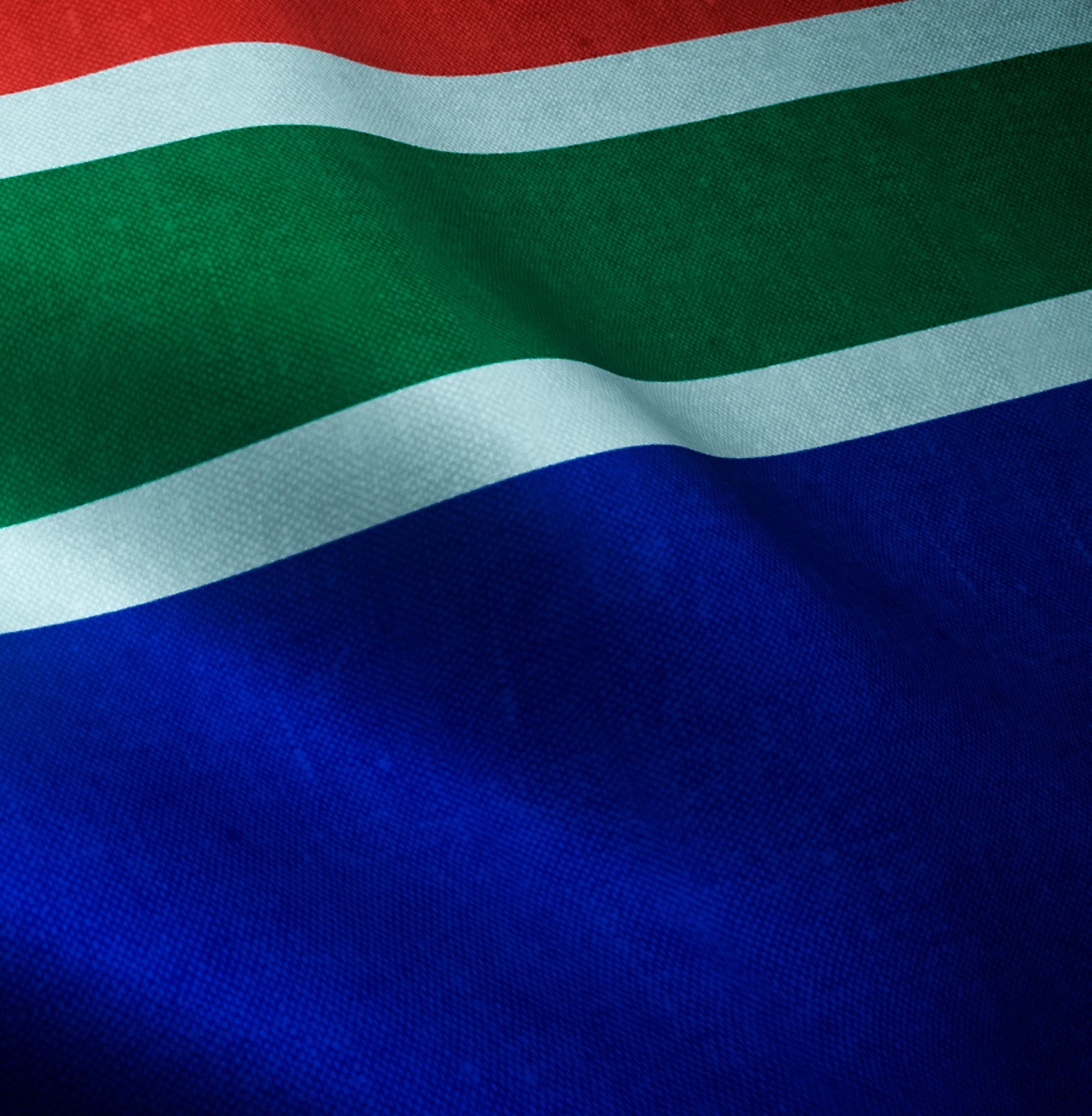
comprising of Mr. Cyril Ramaphosa and Mr. Roelf Meyer. The recommendations of this sub-committee saw the then President Nelson Mandela proclaiming both anthems as official. This proclamation was published in the government Gazette on 20 April 1994. Both anthems were sung during the inauguration of the new President.
The former President of South Africa, Mr. Nelson Mandela promoted both anthems and warned that they should not be used to divide but to unite the nation. Singing the two anthems proved to be effective in terms of nation building but was time
• Land marking of South African history
• The expression of love, faith, hope, and loyalty towards South Africa and the continent.
The story of the finalization of the anthem displayed the willingness of South Africans to compromise for the sake of unity. It is this quest that has made South Africa to be fancied by other nations.
The National Coat of Arms is the national symbol that overtly expresses the theme
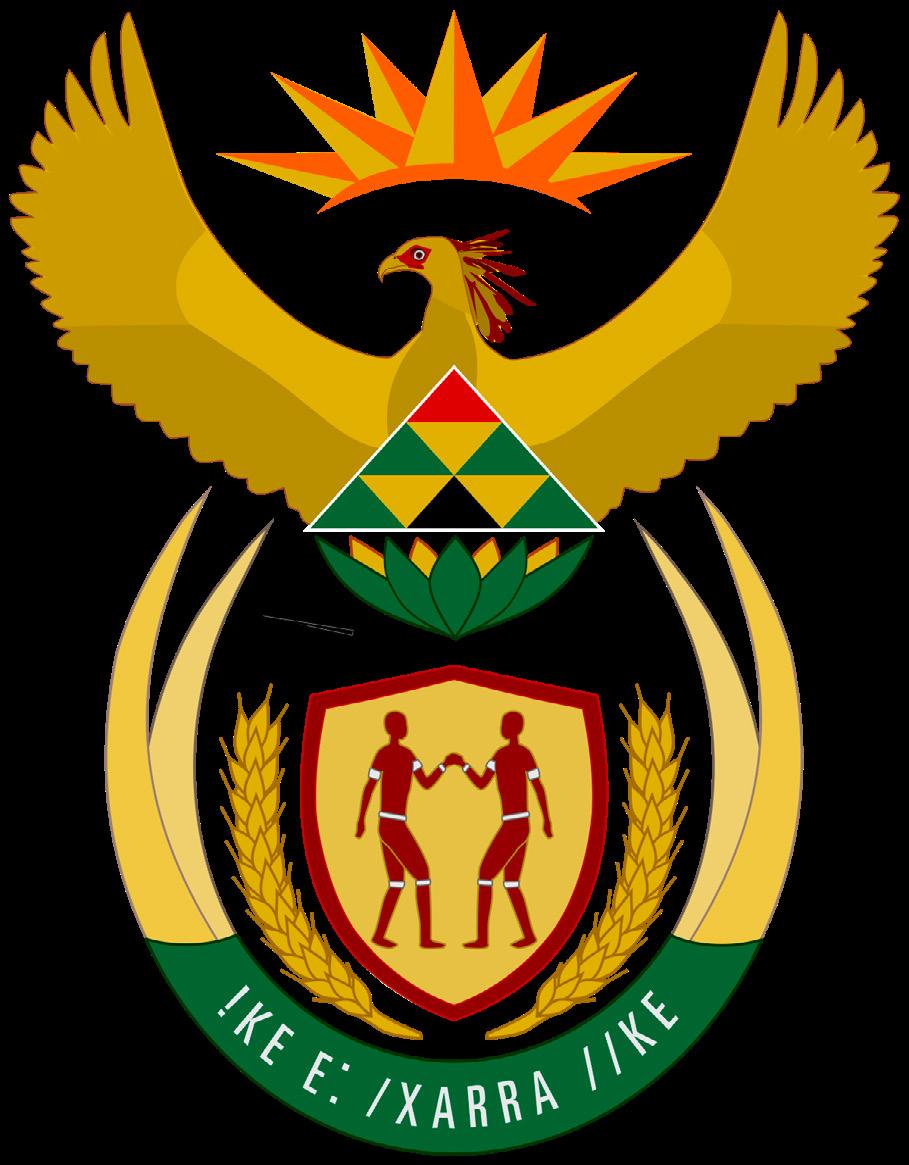
The secondary national symbols, sometimes referred to as the living national symbols, were adopted from the past. These include the national flower: King Protea, the national animal: the springbok, the national tree: the yellowwood, the national bird: the blue crane, and the national fish: the galjoen.
These living symbols are testimony to wide and diverse natural inheritance this country is endowed with.
The birth of a new non–racial and non-sexist democracy in South Africa necessitated a critical review of the system of Nation Orders. The previous system consisted of one decoration and four orders, whose symbolic aesthetic was representative of the past.
Seeking to move away from the past, in May 1998, the newly – instituted President’s Advisory Council on National Orders was given the task and responsibility to review the system of National Orders and awards.
To implement the task, a technical committee was set up. This committee embarked on an extensive and inclusive research process that involved public consultations, interviews with stakeholders on a national scale, group discussions focusing on alternative systems, the commissioning of historical research, and the gathering of jewelry and medal designers to design and medals through a design brief.
As part of this process, the then Department of Arts, Culture, Science and Technology in co-operation with the Government Communications and Information Systems investigated further symbols and symbolism to capture the essence of a new aesthetic that will reflect the spirit of a new country.
A panel of academics and specialists versed in indigenous symbols and symbolism were asked to identify key factors and elements that denote the collective and inclusive history and


experience of Africa with South Africa as the main point of reference. That is how the new National Orders were developed.
National Orders are the highest awards that a country, through its President, bestows on its citizens and eminent foreign nationals.
The emphasis on the design for the National Orders is:
• That they must be simple
• That they capture indigenous symbols and cultural heritage
• That they reflect an inclusive history of South Africa as an African state
The objectives of the new designs are:
• To reflect the ethos and values of the rich diversity of South African traditions
• To include indigenous symbols and systems of awards
• To redress imbalances created by the past policies.




This Order is awarded to South African citizens for innovation, excellence, and exceptional achievements.

This Order is awarded to South African citizens for distinguished service. It is an award for exceptional and distinguished contributions in the following categories: Nation-building; business and the economy; Science, medicine and technological innovation, and Community service.

This Order is awarded to foreign nationals (Heads of State and Government. And other foreign dignitaries) for friendship shown to South Africa. It is therefore, an order of peace, co-operation and active expression of solidarity
And support. The Order constitutes and essential pillar of international and Multilateral relations. The Order has four elements: a walking stick, neck badge,A miniature and lapel rosette.

This Order is awarded to South Africans who have made a meaningful contribution to the struggle for democracy, human rights, nation-building, justice and peace, and conflict resolution.

This Order is awarded to South African citizens who have performed an extraordinary act of bravery by loosing or risking their own live while saving or trying to save the life or lives of others, or by saving or trying to safe property. There is a long and growing list of the South African National Orders since its inception in 2002. The list includes athletes, political figures, writers, scientists, and even ordinary South Africans.

Awarded to South Africa citizens who have excelled in the field of arts and, culture, literature, music, journalism, and sport.
The Department of Sport, Arts and Culture has since 2002 embarked on a massive project to popularize the national symbols. This has seen flags installed in schools, flag images on minibus taxis, informative publications published and distributed widely, workshops and other activations held through all nine provinces. Most of all, national symbols are now part of the school curriculum, educating and uniting the youth of our country and making them proud to be a part of South Africa and all its achievements.
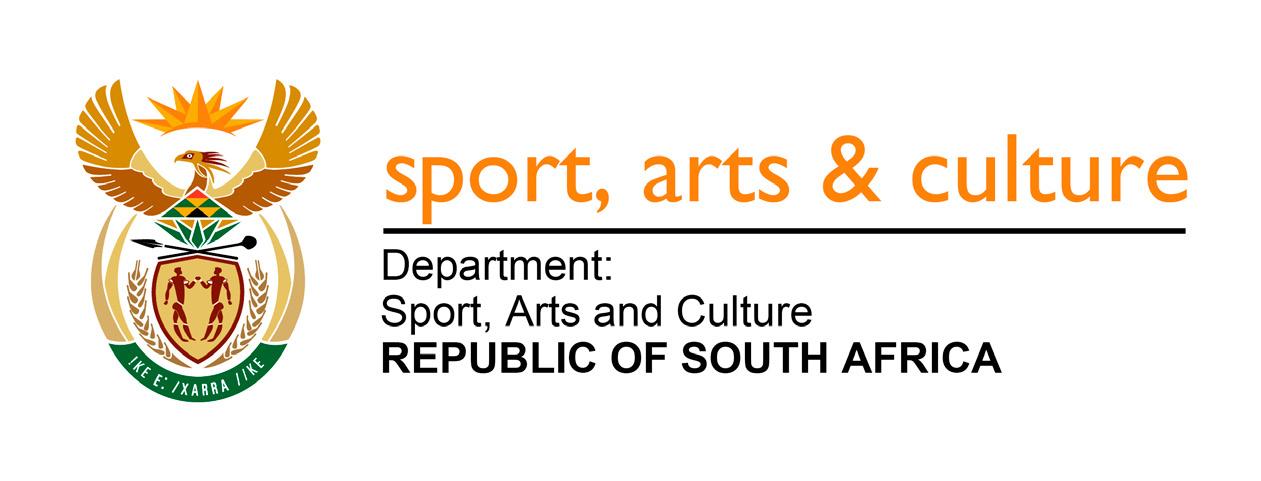

The 2024 Budget Speech delivered by Finance Minister Enoch Godongwana shed light on the profound financial constraints facing South Africa, with approximately 75% of Gross Domestic Product (GDP) encumbered by gross debt.
This staggering debt burden has doubled interest repayments since 2014, exacerbating the challenges posed by a shrinking revenue base. In the face of a burgeoning population, nearing 62 million, and escalating inflation and unemployment rates, the imperative for a paradigm shift in the country's trajectory is evident.
However, amidst these economic woes, the implications for South Africa's facility management industry remain significant.
Budget cuts and fiscal constraints have not only strained government operations but also jeopardised the maintenance and safety of public buildings. Recent incidents, such as fires in Johannesburg buildings due to poor health and safety standards, underscore the urgent need for improved facilities management protocols. Run-to-fail approaches are no longer tenable; instead, a more inclusive and informed strategy is imperative to preserve assets and ensure their continued functionality.

Tendering processes have been plagued by delays, hindering timely project implementation and exacerbating economic inefficiencies. Streamlining these processes is crucial for restoring confidence in the tender system and fostering productive collaborations between government and service providers. Moreover, concerns regarding irregular spending and mismanagement in public entities have necessitated a reassessment of governance mechanisms. Rewarding
well-performing departments while defunding underperforming ones can incentivise fiscal compliance and mitigate the risks associated with institutional failures.
The fight against corruption remains a paramount concern, requiring strengthened enforcement mechanisms and impartial judicial processes. By empowering anticorruption agencies like the Hawks and the National Prosecuting Authority (NPA), the government

can signal its commitment to accountability and bolster public trust.
Municipalities, as frontline service providers, require enhanced capacity and reduced political interference to deliver effective governance. Merit-based appointments and depoliticised decision-making are essential for addressing structural challenges and improving service delivery.
In this challenging landscape, property owners must prioritise the maintenance and optimisation of their facilities. Embracing established facilities management frameworks and outsourcing to professional firms can yield cost reductions and efficiency gains, contributing to overall economic resilience.
The downturn in construction activities presents both challenges and opportunities for the facilities management sector. While reduced construction projects may constrain market growth, innovative strategies such as total cost of ownership planning can optimise asset utilisation and inform future budgeting processes.
Proposed policies in this year’s budget, such as enhancing fuel levy efficiency, can alleviate transportation costs. Moreover, measures to streamline logistics, reduce red tape, and combat crime can create a conducive environment for industry growth and innovation.
Ultimately, realising these objectives hinges on political will and effective implementation. By prioritising transparency, accountability, and meritocracy, the South African government can foster an environment conducive to economic recovery and sustainable development. Only through concerted efforts and collaborative partnerships can the facilities management sector thrive amidst the current financial challenges, contributing to the country's longterm prosperity.

Deputy President Paul Mashatile has emphasised the need to strengthen multi-sectoral partnerships to increase opportunities for youth empowerment and participation in the labour market.
Speaking at the National Council of


Provinces during a question-andanswer session on 12 March 2024, Deputy President Mashatile said: “Together, we can contribute to national efforts to create employment and get South Africans working.”
This is in line with the Deputy President’s delegated responsibility of leading the Human Resources Development Council of South Africa and fostering collaboration between
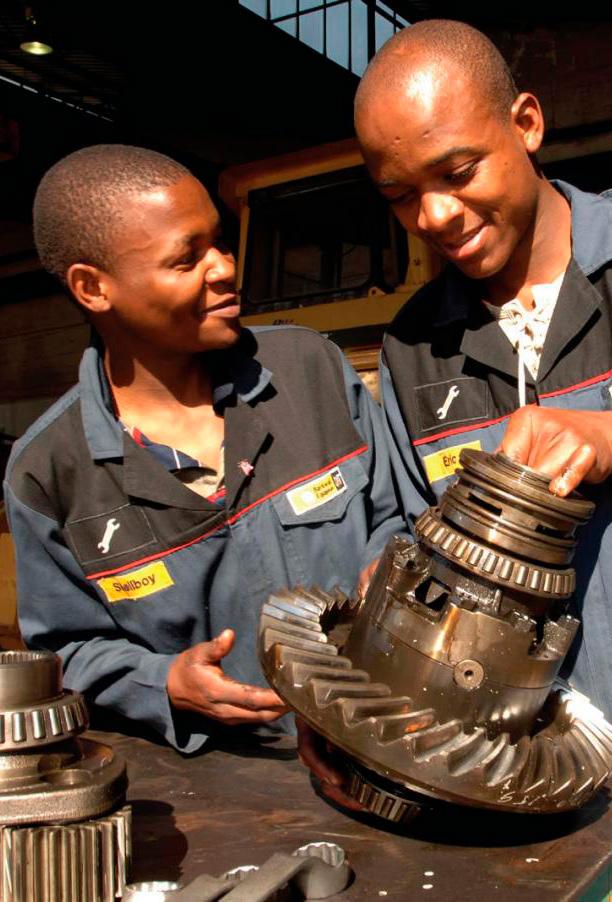


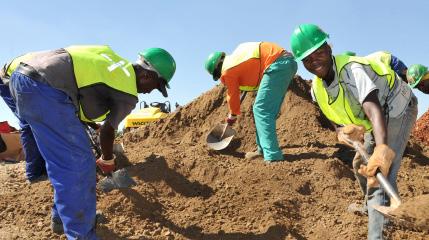

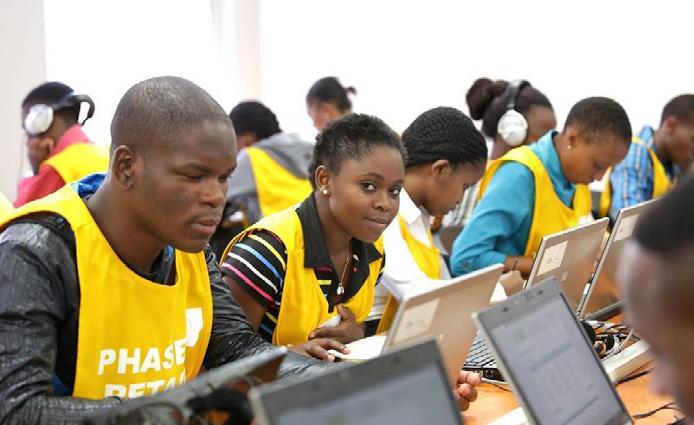
government and social partners towards addressing the shortage of skills in critical sectors of the economy.
Mashatile said Cabinet had approved the National Youth Policy (NYP) 2030 in 2020.
The NYP is a cross-sectoral policy intended to redress the injustices of the past and deal decisively with new challenges affecting the youth.
To reduce youth unemployment, the Deputy President said the Minister of Finance has set aside R7.4 billion for the Presidential Employment Initiative for the 2024/25 financial year.
“Thus far, the Presidential Employment Initiative has assisted over 1.7 million people through a combination of job creation, job retention and income and skills support interventions," Mashatile said. He also touched on the South African Employment Services System, which serves over seven million job seekers, and provides nationwide platforms for youth to register for employment, match with employment opportunities, and receive placement counselling.
To reduce youth unemployment, the Deputy President said the Minister of Finance has set aside R7.4 billion for the Presidential Employment Initiative for the 2024/25 financial year.
Through public-private partnerships, government supports various internships, learnerships, and apprenticeship programmes across various government departments to provide experiential learning and facilitate entry into the labour market for young people.
By supporting the growth of Small,

Medium and Micro Enterprises (SMMEs), he stated that government is playing a critical role in addressing South Africa’s youth unemployment crisis.
“Government is also implementing the Preferential Procurement Policy Framework Act to promote SMMEs that are key to job creation, and economic growth,” he added.
Shifting his focus to agricultural land, Mashatile said government is accelerating land redistribution through a variety of instruments, such as land restitution and expropriation of land, to boost agricultural output.
In 2023, the Minister of Public Works and Infrastructure announced that 221 land parcels measuring 148 796 hectares have been released to the Department of Agriculture, Land Reform, and Rural Development for transfer to the approved land claimants.
“Approximately 1 576 hectares of land is earmarked to be released before the end of this financial year,” he announced.
In addition, he said 125 land parcels, measuring 25 549 hectares of agricultural land were released to support subsistence farming and food security.
“This is in keeping with what we have been doing over the last 30 years,” he
explained.
Meanwhile, the government is transferring State agricultural land, through Financial Assistance Land (FALA) properties, where there has been compliance with the rent-to-buy agreements.
On top of that, the Department of Agriculture, Land Reform and Rural Development, he said, is developing criteria for category 3 and commercial farmers as part of the rollout plan for the release of state land.
“Category 3 includes medium to large-scale commercial farmers who have already been, or intend to farm commercially at various scales, but are disadvantaged by location, size of land, and other resource constraints limiting their growth,” the Deputy President explained.
As per the country’s second-incommand, the Department of Public Works and Infrastructure holds national State-owned land. It receives requests from the Department of Agriculture, Land Reform and Rural Development for releasing land to settle claims for restitution and agricultural purposes as part of the land reform programme.
“As a government, we will prioritise providing extension and technical support to ensure that we distribute properties that are productive and contribute to South Africa’s food security,” Mashatile said.
In a move designed to reduce the 44% youth unemployment rate among South Africans, Vodacom South Africa and Microsoft South Africa have joined forces to provide free access to digital training courses on the Mzansi Digital Learning platform.
Recognising the digital skills gap in a country with one of the world's highest youth populations, this partnership aims to address the urgent need for relevant skills in the modern job market.
It underscores both companies' commitment to drive digital inclusion, ensuring that no one is left behind in the quest for digital literacy, providing access to opportunities in the digital economy, and proficiency in key technological advancements such as Artificial Intelligence (AI).
"We are extremely grateful to embark on this transformative partnership with our longstanding partner Microsoft South Africa. Collaborating with a like-minded brand who share our values and ambition is testament to our collective commitment to address unemployment and empower individuals through innovative digital training," says Mathys Venter, Managing Executive for Prepaid and Loyalty at Vodacom South Africa.
"Affording youth with much needed digital literacy is just one way we strive to fight the scourge of unemployment, one skill at a time. We believe that this partnership reinforces our purpose of creating an inclusive digital society,
leaving no one behind," added Venter. The Mzansi Digital Learning platform will be hosted on the new NXT LVL rewards platform, and integrated into Vodacom's ConnectU - a zero rated platform that gives customers access to content without mobile data charges.
The Mzansi Digital Learning platform also removes the cost of connectivity when it comes to access to educational content, and it also focuses on important topics to help users understand the changing landscape of business in a digital world of Generative AI, entrepreneurship, and cybersecurity. Certification is provided upon completion of the course, and all the programmes on the platform have been designed to align with the most sought-after jobs in South Africa.
"We are fully committed to supporting and enabling our youth as we collectively work towards closing the skills gap and empowering every person to achieve more in this era of digital transformation. It is increasingly about ensuring young people are equipped with the skills they need for the jobs that exist today and, in the future," says Asif Valley, National Technology Officer at Microsoft South Africa.
Microsoft South Africa works closely with its local partner Afrika Tikkun to deliver training, tools, and platforms to boost youth employability and entrepreneurship. The courses will appeal to youth and entrepreneurs who want to upskill and equip themselves with the skills essential for success in today's
digital market and an AI-driven world.
Commenting on the partnership, Onyi Nwaneri, the Group CEO of Afrika Tikkun said: "Afrika Tikkun's vision is to help young people gain skills that will enable them access and sustain access into the digital economy. The partnership with Microsoft and Vodacom ensures that this access is affordable, meaningful, empowering, and sustainable. Young people are encouraged to embrace this opportunity and leverage it for their advancement. This is a milestone, and we are so grateful to be part of this pioneering initiative."
Ultimately, both organisations aim to reach 300,000 people with the Mzansi Digital Learning platform over the coming months. Much of the success of this initiative will come down to how young people embrace the digital skills courses as a tool to give them the proficiencies they need and the entrepreneurial know-how to become active members of the economy.
"This is the first time we are working with Vodacom to bring an initiative of this scale to the local market and drive a common social goal. We know that when we empower people to harness digital technologies effectively, we help to create sustainable businesses," says Valley.
South Africans interested in equipping themselves with these in-demand digital skills can register for the programme on:
www.mzansidigitallearning.co.za


Plastics SA is the umbrella organization representing the South African plastics industry. With a focus on sustainability and innovation, Plastics SA promotes the responsible use and recycling of plastics while supporting the growth and competitiveness of the industry.

In his opening remarks at the State of the Nation Address (SONA) delivered on February 8, 2024, President Cyril Ramaphosa's acknowledged that the country is still dealing with the fallout from state capture, load shedding, deteriorating infrastructure, and a lack of investment. “For a decade, individuals at the highest levels of the state conspired with private individuals to take over and repurpose state owned companies, law enforcement agencies and other public institutions. Billions of rands that were meant to meet the needs of ordinary South Africans were stolen. Confidence in our country was badly eroded. Public institutions were severely weakened,” the President said.
Plastics SA, the umbrella body representing the local plastics industry, has issued a response to President Cyril Ramaphosa's State of the Nation Address (SONA), with Executive Director, Anton Hanekom commenting that although the President’s address highlighted the challenges facing the nation as a whole, the impact of many of these obstacles are profoundly felt by the plastics industry.
The South African government stated
that it has taken certain steps to address the youth unemployment challenge in the country. Despite this, our unemployment rate is the highest it has ever been.
“The plastics industry was identified as a priority sector for the South African economy as it provides employment to 60,000 people. However, the recent economic downturn, energy crisis and labour challenges are forcing many plastics manufacturers and recyclers to downscale their operations and risk the jobs of many workers. Immediate and drastic measures are needed to protect and restore the entire manufacturing sector, but especially
to revitalise the competitiveness of the plastics sector,” Hanekom said. He also urged the Government to extend the RAF fuel rebate offered to food manufacturers on diesel for generators to the to include plastic packaging manufacturers.
“Because recognise the need for a skilled and trained workforce that can add value in each sector, we continue to provide cutting edge, hands-on training in the latest manufacturing and leadership techniques that not only address our unemployment crisis, but also help to stimulate economic growth and ensure our competitiveness on a global stage,” he added.
Plastics play a crucial role in modern infrastructure, offering durability, versatility and cost-effectiveness in various construction applications. Explains Hanekom: ”In infrastructure projects, plastics are utilised in numerous forms, including pipes, cables, insulation materials, and roofing membranes. High-density polyethylene (HDPE) and polyvinyl chloride (PVC) pipes are commonly used for water distribution and sewage systems due to their corrosion resistance and longevity. Additionally, plastics such as polystyrene and polyurethane are employed in insulation, enhancing energy efficiency in buildings. Moreover, the lightweight nature of plastics facilitates easier transportation and installation, reducing labour costs and environmental impact”.
The Department of Water and Sanitation aims to enhance water resource management by initiating infrastructure projects to secure water supply and diversifying water sources to reduce dependence on surface water. In addition, Government has committed to increase construction of infrastructure through new and innovative funding mechanisms. The industry eagerly awaits the commencement of these infrastructure projects to provide products that
will contribute to cost effectiveness, durability and a low carbon footprint.
“Plastics plays a crucial role in the country's infrastructure and food security. However, we need government support and political will to revitalise the manufacturing sector, support local businesses, and combat the influx of cheap imports coming into our country and eroding our markets,” Hanekom urged.
Finding solutions to South Africa’s pollution problem and protecting the environment continue to be a key focus area for both the Government and the plastics industry around the world. Hanekom reiterated that plastics have an important role to play in actually combatting climate change.
“Numerous studies and life cycle analyses have proven time and again that when plastics are collected and recycled as part of a circular economy, they have a smaller environmental footprint compared to other packaging materials. They can be re-used many times over. Plastics that have a one-time purpose can be recycled into useful applications with a long-term use, for example water bottles are recycled into duvets, pillows of fleece jackets, or bottles for milk, juice and shampoo, shopping bags, household containers and crates and closures can be recycled into toys, garden furniture or decking,” he explained.
For this reason, Plastics SA is relentless in its efforts to promote and educate end-users about recycling, supporting the industry with the development of end-markets and working with local and national government to improve waste management and collection systems throughout the country.
Over the last few years the Government has had to confront the effects of climate change, and
in this year’s address the President highlighted their plans to invest in green energy. He invited the private sector to participate in the expected boom that will be generated green hydrogen energy projects.
“Hydrogen is viewed as a promising alternative to fossil fuel, but the methods used to make it either generate too much carbon dioxide or are too expensive. It is exciting to note, however, that researchers have recently found a way to harvest hydrogen from plastic waste using a low-emissions method that could more than pay for itself and could provide a win-win solution for us,” Hanekom said.
Numerous other areas of focus and investment were singled out by the President where plastics have an important role to play. Says Hanekom: “Whether it is stabilising the country’s energy supply, fixing logistical problems or boosting electric vehicle manufacturing, plastics have a role to play in every area”.
In conclusion, while concerns about plastic pollution are valid, it is important to recognise the crucial role that plastics play in the future of South Africa. With proper waste management and recycling initiatives, these issues can be effectively mitigated, allowing for the continued utilisation of plastics in various sectors.
The industry's willingness to cooperate and support national objectives underscores the potential for positive change. However, it is essential for political will and decisive action to align with these efforts to steer the country and its economy towards growth and prosperity. By addressing plastic pollution, while harnessing the benefits of plastics responsibly, South Africa can forge a sustainable path forward for generations to come.
For more information, visit www. plasticsinfo.co.za

 By Jan Venter, CEO of SAPPMA
By Jan Venter, CEO of SAPPMA
In the arid landscape of South Africa, where water is a precious resource, the significance of reliable water infrastructure cannot be overstated. As the nation prepares to observe National Water Week from 20-26 March 2024, it is essential to underscore the pivotal role that dependable water infrastructure plays in
securing the country's water future. The Southern African Plastic Pipe Manufacturers Association (SAPPMA) emerges as a key player in this narrative, representing more than 80% of the local pipe industry, with a mission to uphold the highest standards for plastic pipes in South Africa.
The constitutional guarantee of access to sufficient water, enshrined in Section 27(1) of the South African Constitution, places an onus on the government to enact legislation
that ensures the realisation of this fundamental right. The Water Services Act 108 of 1997 (WSA) was conceived to give effect to this constitutional commitment. Moreover, Section 24 of the Constitution reaffirms citizens' rights to a healthy environment and emphasises the imperative to protect the environment from pollution and ecological degradation. In this context, it is imperative that water infrastructure aligns with these constitutional provisions, promoting conservation and sustainable development.
One of the pressing challenges facing South Africa's water infrastructure is the annual loss of millions of litres of water due to degraded pipes that have surpassed their natural lifespan.
surpassed their natural lifespan. SAPPMA, the vigilant custodian of the thermoplastic pipe industry, advocates for the use of locally manufactured plastic pipes that adhere to both local and international standards. Polyvinyl Chloride (PVC) and High Density Polyethylene (HDP) pipes that bear the SAPPMA mark guarantee a lifespan of more than 50 years. This longevity not only safeguards water resources but also aligns with the constitutional imperative to ensure access to water for all citizens.
Plastic pipes, with their inherent benefits, provide a sustainable solution to South Africa's water infrastructure challenges. They offer numerous advantages, such as reduced friction loss, lower energy consumption, a smaller environmental footprint, and crucially, they are heavy-metal free. These factors position plastic pipes, marked by SAPPMA's seal
extends an earnest appeal to specifiers and end-users to prioritise the use of pipes bearing the SAPPMA mark. Furthermore, a crucial call is made to politicians and decisionmakers to urgently invest in the much-needed upgrades of South Africa's pipe network. By doing so, we not only honour the constitutional commitment to water access, but also pave the way for a sustainable, resilient water infrastructure that is crucial for the nation's development.
In conclusion, the intersection of National Water Week, Human Rights Day, World Water Day, and Earth Hour serves as a poignant reminder of the interconnectedness of water, human rights, and environmental sustainability. SAPPMA's advocacy for reliable water infrastructure, grounded in high-quality plastic pipes, is a step towards securing South Africa's water future, preserving the environment, and upholding the constitutional rights of every citizen to access sufficient


In the pursuit of safeguarding our precious water resources, reliability is paramount. As the voluntary industry association representing the plastic pipe industry, SAPPMA recognises the indispensable role of quality plastic pipes in water infrastructure.
Pipes bearing the distinguished SAPPMA mark carry with them the assurance that they meet stringent international and local manufacturing and quality standards. Each pipe undergoes rigorous independent testing and auditing, ensuring unwavering performance and durability.
Join us in our mission to uphold quality, preserve trust, and safeguard our most precious resource—water.



Delivering the State of the Province Address before the North West Legislature, Acting Premier Nono Maloyi reflected on the progress government has registered in the last 30 years of democracy and the constant improvement witnessed in the provision of services in the North West to date.
More North West residents stay in formal housing –several more housing projects on the cards.
The North West Province has experienced unprecedented levels of development in the last 30 years, with the number of households increasing from 591 145 in 1996 to over 1.14 million in 2022.
When delivering the State of the Province Address Acting Premier Nono Maloyi revealed that this depicts an upward trend of eighty eight percent (88%) of formal housing in the province.
Since 2019 the provincial government has built over 19 000 houses. And in 2023 alone over 2700 we handed over to beneficiaries.
Acting Premier Nono Maloyi emphasised the Province's on-going efforts to restore the dignity of the people of the North West Province.
He maintains, the focus will now be centered on eradicating mud houses. "R198 million has been allocated to eradicate 1 356 mud houses in the province, with 579 of these units already delivered," said Acting Premier Maloyi.
Furthermore, efforts to eradicate mud houses have been strengthened by the Memorandum of Understanding (MoU) between the provincial government and the Chinese National Import and Export Corporation to build gas to electricity power stations in the province.
As part of their project investment the Chinese have made a commitment to invest further resources to assist eradicate mud houses in the province by building 500 houses every year, for the duration of the project.
The project is expected to create a minimum of over 10 000 jobs. Providing an update on the Deelpan Floods intervention programme, Acting Premier Maloyi announced that the provincial government has cleared all the hurdles that delayed the project and that 104 houses will be completed by end of March 2024.
A further 317 houses will be built following the donation of land by Kgosi Kogodi Molete of Bakolobeng and his Traditional Council.
In addition, the provincial government will be launching the R2.6 billion N14 mixed development project in Ventersdorp as part of the ongoing efforts by the provincial government to change the lives of the residents of
North West and restore their dignity.
This development will see installation of bulk services for 4000 sites and create over 600 jobs for local people through the construction of Breaking New Ground, Social Housing and bonded stock.
Acting Premier Maloyi added that the provincial government will continue to ramp up the title deeds restoration programme by handing over title deeds to rightful owners. To date 6 283 title deeds have been handed over to beneficiaries across the province. >



NPOs to receive financial support to fight gender based violence and femicide (GBVF).
The North West Province will intensify the fight against recurring incidents of Gender-Based Violence and Femicide (GBVF) by funding twenty (20) Non-Profit Organisations to provide a variety of services to victims of GBVF.
In his address, Acting Premier Maloyi said the province is saddened by a growing number of Gender Based Violence incidents, which largely affects women, girl children, the elderly and people with disabilities.
"The province through the Department of Social Development, will set aside R17 million, to fund NPOs to provide a basket of services to persons with disabilities" maintained Acting Premier Maloyi.He revealed that as part of strengthening efforts by government to fight GBFV, 792 victims received sheltering services.
“Government will continue to provide financial and professional support to 19 victim empowerment centres, to ensure that the victims are provided with accommodation, basic counselling, court preparation and psycho-social support services" said Acting Premier Maloyi.
The Acting Premier Maloyi further maintained that government will continue to work with law enforcement agencies to ensure coordinated services to the victims of gender-based violence.
He was unflinching in his commitment to ensuring that perpetrators of these heinous crimes face the full might of the law.
On women empowerment, Acting Premier Maloyi said eight women-led cooperatives and individuals will benefit from R1, 4m which has been set aside for their upskilling and business growth.
A further R4,5m has been set aside to support women cooperatives, and SMMEs to provide market access for
their products and commodities.
NW to strengthen agriculture infrastructure support as a catalyst for local food production
The North West Provincial Government has set aside R91 million for the 2024/2025 financial year to oversee the agricultural infrastructure backlog.
Agriculture infrastructure remains one of the key factors towards the impact of the sector as a key economic driver. Over 800 farmers are set to benefit from this intervention aimed at ensuring that farmers have resources to grow and produce in agriculture. This remains a foundation upon with the agricultural industry is based.
The Acting Premier has reiterated the importance of investing in the sector as a way to ensure that it grows. “The agriculture sector is yet to reach its
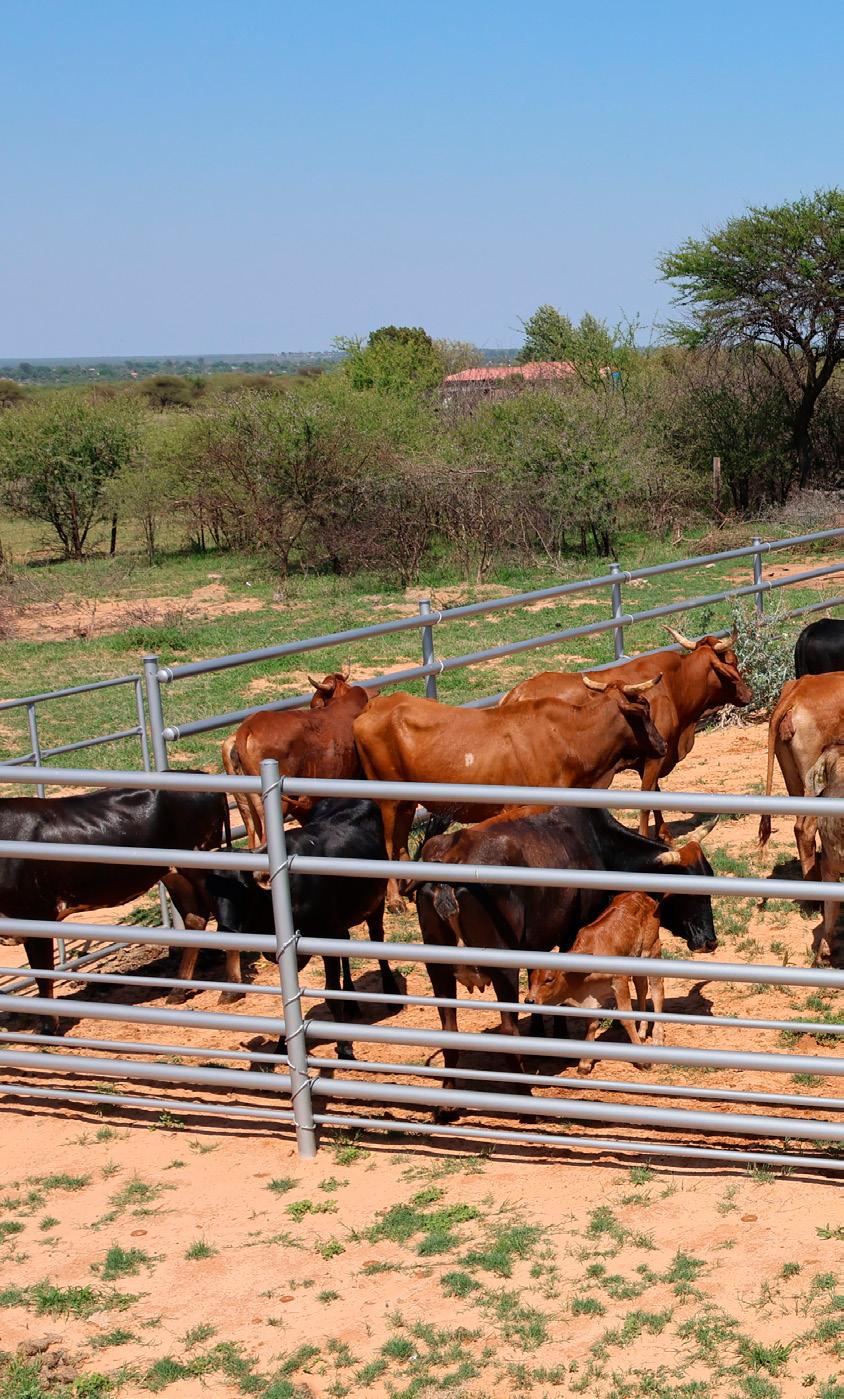
full potential through meaningful participation of emerging farmers in this growing sector,” he emphasised. As one of the critical infrastructure input, Acting Premier said in the coming financial year, land would be disbursed to 300 farmers. This will see the extension of farming to many other irrigated areas as well as dry-land farming in rural areas. The province will further transfer leased land to 614 farmers for ownership. “This intervention is intended to strengthen and empower emerging black farmers to join mainstream economy,” the Acting Premier Maloyi added.
Further to agriculture support, another R77 million will be used to empower farmers with inputs such as livestock, feeds and medication. About 81 farmers will be supported with 1 734 goats.
The Government of South Africa has rolled out different agricultural developmental programs including
the Comprehensive Agricultural Support Programme (CASP) that enables access to infrastructure for smallholder farmers so that they progress towards commercialisation.
Acting Premier Maloyi sets a roadmap for the province's economic recovery and optimistic signs for job creation
The Acting Premier made a compelling narrative of economic resurgence in the North West Province, highlighting substantial job creation and strategic initiatives set to transform the province.
Maloyi announced that the North West Province stands as one of the three provinces with the most significant employment growth during the third quarter of 2023. A staggering 61,000 jobs have been generated, showcasing the administration's commitment to addressing the pressing challenges
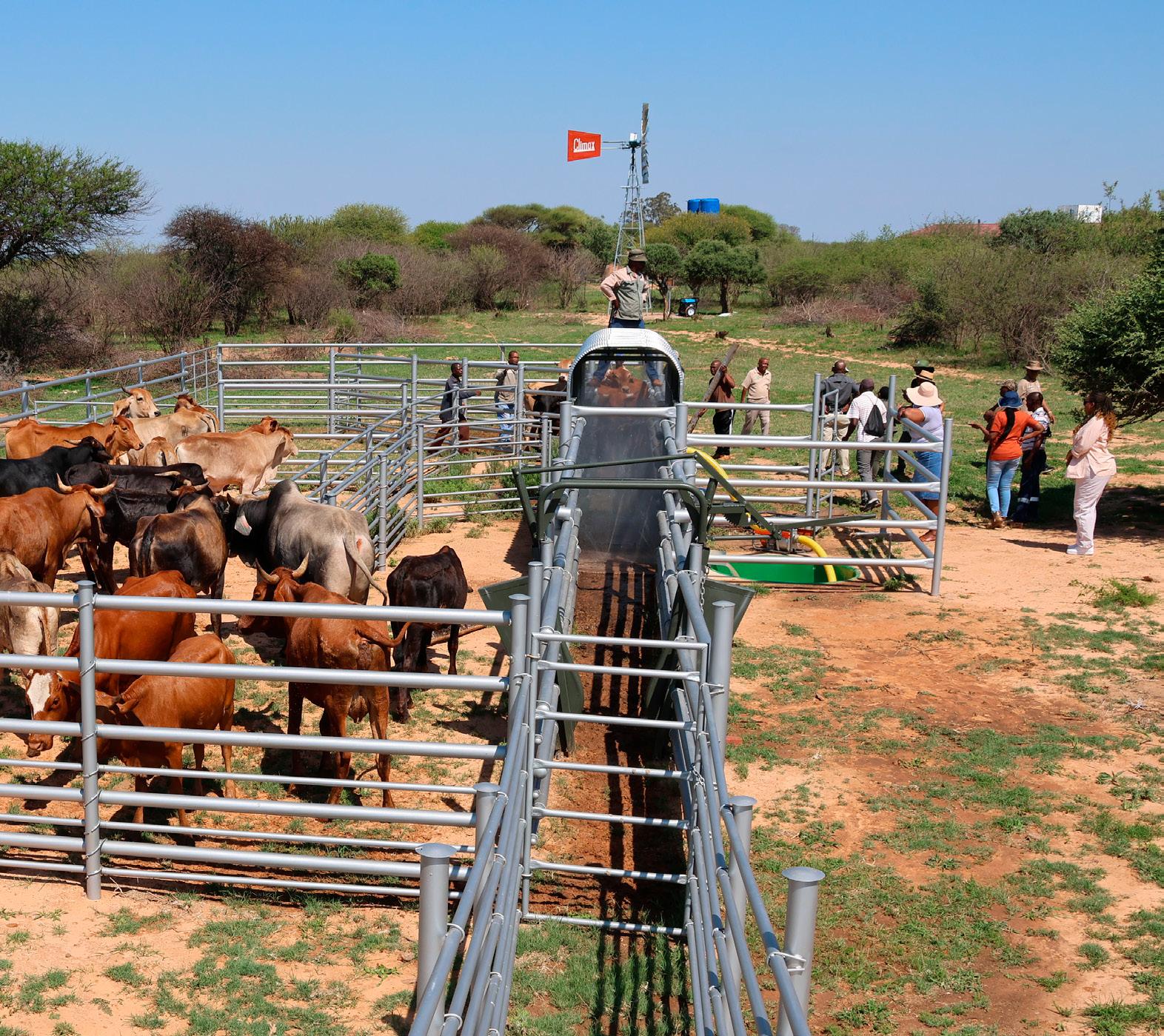
of poverty and unemployment.
Expressing deep concern over persistently high levels of poverty and unemployment, particularly among women and the youth, Maloyi underscored the urgency of addressing these issues, citing the critical role that women and young people play in the growth of the provincial economy. Despite an 11% increase in the unemployment rate from 2010 to 2023, he emphasised a comprehensive roadmap for economic recovery and promising signs for job creation.
He highlighted the Department of Economic Development, Environment, Conservation, and Tourism's pivotal role in notching two vital investment promotion events, namely, the North-West BRICS Investment Conference and the Premier's Dinner with Investors which yielded 34 investment pledges, totaling over R104.1 billion.
North West Province stands as one of the three provinces with the most significant employment growth during the third quarter of 2023.
Currently, 14 confirmed projects worth R13.5 billion are in the pipeline for the Bojanala Special Economic Zone, promising an additional 10,000 jobs.
The implementation of the Tourism Recovery Plan has already yielded growth in both domestic and international visitors. Acting Premier shared plans to revitalise Pilanesberg and George Dick Montshiwa Airports, aiming to boost tourism and create new economic opportunities in cargo hauling, hanger and airline services.
He mentioned that the Requests for Proposals have been sent out, >
and the preferred bidders are expected to commence work by May this year.
Acting Premier Maloyi announced the completion of the resuscitation of the Premier's Economic Advisory Council, a crucial step in ensuring strategic support and coordination for the implementation of the PGDS. The Council will play a pivotal role in promoting integrated economic planning and sector contributions. The imminent announcement of Economic Advisory Council members is scheduled within the next two weeks following consultations with critical stakeholders.
The Acting Premier, said the Provincial Government through the Department of Cooperative Governance and Traditional Affairs, is coordinating extensive intervention efforts to assist municipalities in the province to implement renewable and alternative energy sources.
He said that in an effort to end load shedding, a Memorandum of Understanding (MoU) has been signed with the Chinese National Import and Export Corporation to construct R16 billion gas to electricity power stations at both the City of Matlosana and Moses Kotane Local Municipalities.
“The first phase of this project will see the City of Matlosana Local Municipality producing 198 megawatts of electricity and construction is earmarked for a maximum of ninety days per one hundred megawatts”, he stated.
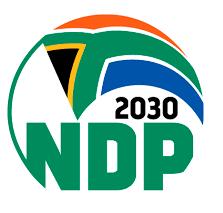
He said this latest development is part of the continuing efforts to ensure support and interventions in municipalities and will go a long way in resolving electricity supply challenges.
“Challenges facing municipalities include electricity supply challenges as a result of aging infrastructure faults, vandalism of transformers and loadshedding impact on infrastructure and water supply leading to a collapse in service provision. With the new power stations we should resolve these problems” he said.
He added that municipalities such as City of Matlosana and JB Marks are to insource road maintenance and pothole patching on an ongoing basis as a municipal function undertaken by municipal employees and that this initiative will be emulated in other municipalities across the province.
Furthermore, Maloyi announced ongoing efforts to provide dedicated support to all municipalities to improve financial management through the implementation and monitoring of the
Financial Recovery Plans (FRPs).
“The Executive Council has approved the appointment and deployment of Provincial Executive Representatives (PERs) to implement financial recovery plans for identified municipalities, under the joint coordination of Provincial Treasury and Department of Cooperative Governance and Traditional Affairs (COGTA),” Maloyi said.
Commenting on the progress that has been registered by the intervention team deployed to the Ditsobotla Local Municipality, he said it was not significant enough yet to reverse the extent of the governance collapse in the municipal administration.
“The Ditsobotla Local Municipality requires constant and sustained support and intervention from Provincial Government before full recovery can be declared. EXCO has deployed a team of experts and other seconded officials to the municipality to assist with capacity we remain hopeful that we will make the municipality function better.”
























































Disruptions to construction sites of large-scale city projects are a major factor in the slow rate of public infrastructure delivery.
This results in public money and
resources being wasted or not spent, and threatens the safety and wellbeing of city officials, contractors and construction workers. Media reports commonly attribute these disruptions to the so-called “construction mafia” –variously described as organised
associations of small, medium and micro-enterprises (SMMEs) in the construction industry who use violence, extortion, or threats to secure a share of a project’s subcontracts or equivalent value in cash.
While the term “construction mafia” is catchy and useful, it is in instances misleading in that it glosses over the complex and varied manifestations of this phenomenon across different urban areas and the imperative for economic inclusion spelled out in national policy. New research by the South African Cities Network (SACN, 2023, Keep the bus moving: SMME inclusion in the construction sector), traces the divergent and parallel development of the “construction mafia” phenomenon in the country through interviews with city officials from respective metros, providing a clearer picture of the problem and offering informed solutions.
The paper finds that when city officials are able to take seriously their own mandate of economic inclusion and community engagement, huge wins are made with regards to local SMME groups.
Since the early days of democracy, and as part of an effort to lift many out of poverty, government deliberately designed the subcontracting of SMMEs within the construction sector as a low-barrier-to-entry employment solution for unskilled and semi-skilled people, with few compliance requirements when registering as a construction company. Recent regulations such as the 2017 Procurement Policy had committed a share of project labour (30%) to be allocated to local SMMEs.
What has been missing in the policy framework is a coherent national strategy for SMME inclusion to balance out this loose approach to inclusion, which has left the sector vulnerable to aggressive manipulation (particularly at the procurement stage) and SMMEs unchecked to take advantage of the sector’s neglect of them.
In a context of poverty and high unemployment, the scarcity of
opportunities and the potential profit of each construction subcontract is coupled with an overly permissive registration process for first-time subcontractors, that creates a high stake, competitive and hostile environment. From around 2018, on-site disruptions and extortion by business forums spread across South African urban areas from Kwa-Zulu Natal, where the phenomenon is thought to have been started by two associations – the Delangokubona Business Forum and the KwaMashu Youth in Action Movement around 2015.
While government has strongly condemned the illegal practices of business forums, including President Ramaphosa in his 2020 State of the Nation Address, the State has not taken any significant action, creating an enabling environment for business forums to expand their activities. However, city practitioners also suggest that powerful, highly organised, and overtly violent tactics (such as experienced in Kwa-Zulu Natal) are not the norm for most business forums and that business forums’ tactics differ between cities and wards.
SACN’s paper argues that addressing
site disruptions across the country requires dealing with the underlying drivers of SMME inclusion challenges.
Interviews with city officials from three metros (Mangaung, Johannesburg and Nelson Mandela Bay), uncover innovative practices to keep projects moving, rather than relying on a law enforcement response only. The paper argues that the term “mafia” does not always accurately portray the nuances of SMME tensions in the construction sector nor its underlying drivers, and makes what should be an issue of economic development, a matter of crime and policing only.
The paper finds that when city officials are able to take seriously their own mandate of economic inclusion and community engagement, huge wins are made with regards to local SMME groups. Ultimately, the case studies find that the solution lies in incorporating SMMEs into the construction sector in a transparent, regulated and developmental manner.
Because city departments and project managers have been left on their own to figure out what to do, different cities and departments within cities have very different approaches to engaging with SMMEs. >

On infrastructure projects, the city or public entity procures a private contractor who is responsible for subcontracting local SMMEs for certain portions of the work, but often cities have to engage directly with SMMEs in order to keep projects moving smoothly.
The cities’ approaches to engaging with SMMEs range from reactive and hands-off “business-as-usual” to proactive, engaged “social compacting”.
The research finds that the SMME engagement approach that cities choose to utilise on their projects have a major effect on how the process will unfold, and the degree to which site disruptions will destabilise the project’s construction.
The business-as-usual approach refers to the city relying solely on the main contractor to manage the relationship with SMMEs. This is a relatively common approach, as the contractor is legally responsible for the subcontracting process. However, managing the subcontracting process is complex and requires time and dedication, as well as sensitivity when engaging with communities.
Contractors are understandably more concerned with making a profit and are “not in the business of SMME development”, as one city official noted.
As a consequence of this hands-off, unsupervised approach, an unregulated laissez-faire environment is created for SMMEs leading to challenges later in the project that the city must respond reactively to.
Examples of reactive responses by cities and contractors at this late stage are typically adversarial and include interdicts, additional security, accommodating extortion and negotiations with business forums. At the other end of the spectrum is a hands-on, participatory approach, that cities or entities use to engage proactively to include and

through a transparent and rigorous process of engagement that begins long before the construction phase of the project, and includes practical support throughout the construction process, such as on-site supervision, expenditure tracking, and business development.
Development entities, such as the Mandela Bay Development Agency (MBDA) in Nelson Mandela Bay and the Johannesburg Development Agency (JDA) in Johannesburg, are particularly hands-on in their approach to SMME engagement and have dedicated SMME Development Managers and Social Facilitators. This has proven to have a hugely positive impact on the inclusion and development of SMMEs, and in turn prevents disruptive and extortive practices from taking root.
This approach is time-heavy and requires expert social facilitators to guide the engagement process, which is invariably sensitive and prone to tension.
No matter the approach taken, the process of SMME inclusion will never be without complexities and tensions. But SMME inclusion is a non-negotiable element of all public construction processes that cannot be wished (or paid) away. City officials and contractors alike need to come to terms with the footwork that is
required to keep projects moving, navigating a delicate and sensitive process, bringing on board adept social facilitators, and finding ways to manoeuvre through the tensions, complexities and blockages.
Off the back of its research, the South African Cities Network is currently working on a set of practice guidelines to assist city officials with developing coherent and holistic approaches to SMME inclusion that is governed by transparency and hands-on engagement. Business forums have the potential to be crucial pieces of the local economic development puzzle and provide opportunities for SMMEs to grow and develop without the use of violence and extortion.
For more information please contact:
Media Contact:
SHAUN WATSON
shaun@sacities.net
Sponsorships and Partnership Queries:
PHOLISA MAGQIBELO
pholisa@sacities.net
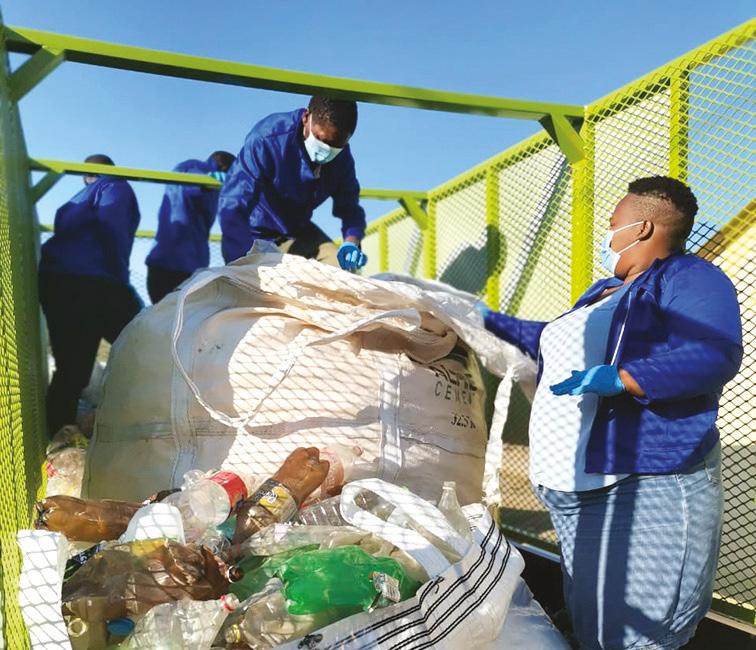
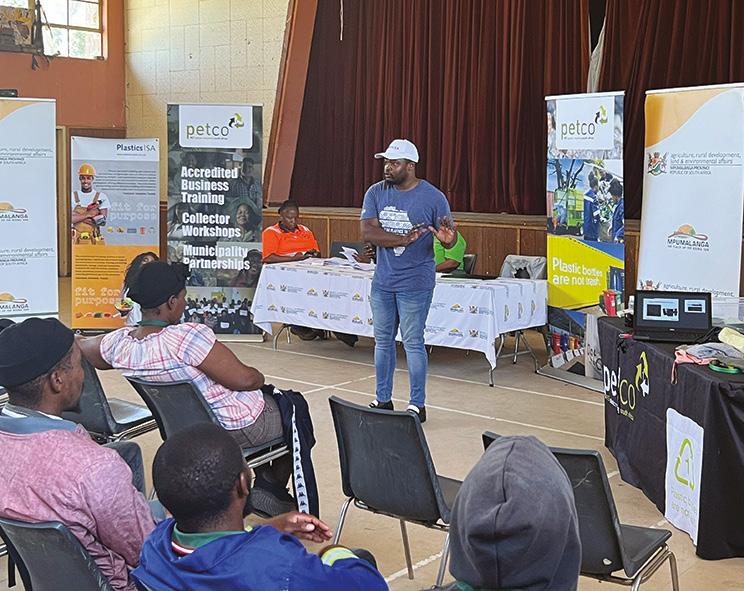
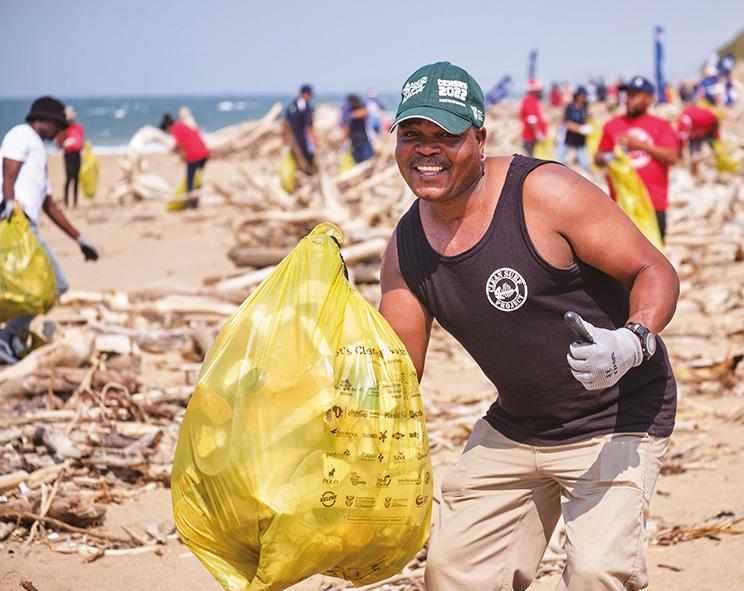
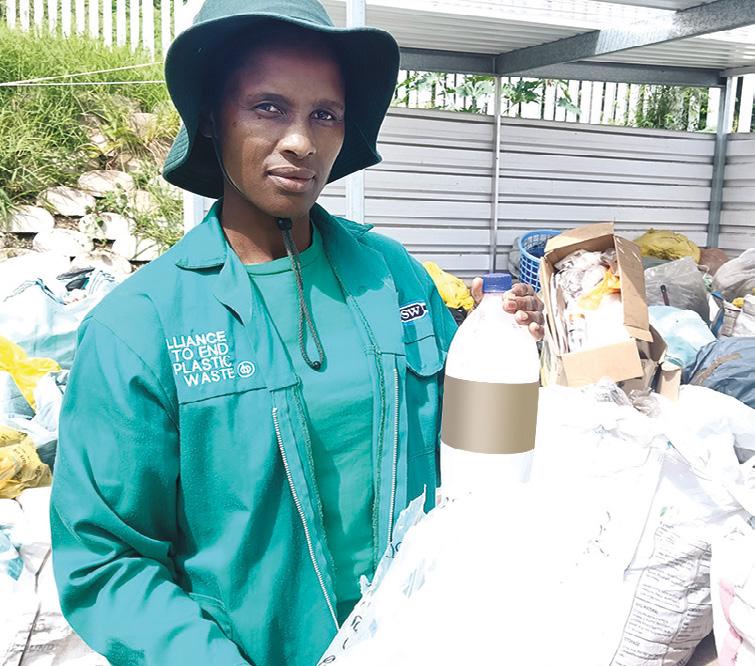




Thungela has taken a significant step towards environmental conservation by launching an innovative fish breeding facility in Mpumalanga's Loskop Dam Nature Reserve. This initiative comes as a response to the 2022 incident at the Khwezela Colliery’s Kromdraai site, where mine-impacted water was released, affecting the Wilge-Olifants river catchment.
Determined to rectify this, Thungela has collaborated with key stakeholders and secured approval from the Department of Water and Sanitation to embark on a project that not only aims to restore but enhance the aquatic ecosystem.
The facility, a testament to Thungela's commitment to environmental stewardship and community engagement, is set to rejuvenate biodiversity and serve as a cornerstone for future conservation efforts.
July Ndlovu, CEO of Thungela, expressed pride in the company's fulfillment of its commitment, emphasising the legacy of responsible mining and environmental restoration. Through partnerships with the Mpumalanga Tourism and Parks
Agency (MTPA) and leading aquatic scientists, Thungela's vision became a reality, culminating in the commissioning of the fish breeding facility.
The facility symbolises not only the restoration of fish populations but also a beacon of hope for future environmental research and conservation efforts. With water quality restored and macroinvertebrate activity flourishing, Thungela's fish breeding project aims to reintroduce up to sixteen native fish species, marking a significant milestone in ecological revival.
Beyond the river restoration project, Thungela's partnerships extend to the farming community and society at large, emphasising a shared commitment to environmental stewardship and community well-being. Mduduzi Vilakazi, CEO of Mpumalanga Tourism and Parks Agency, lauds the collaboration as a model for sustainable resource management and community empowerment.
The fish breeding facility is just one facet of Thungela's comprehensive conservation initiatives, which include renewable energy solutions and
advanced water treatment systems. The company remains dedicated to transparency and ongoing updates on rehabilitation measures, with the ultimate goal of achieving full ecological revival and safeguarding against future environmental incidents.
Thungela's efforts underscore the transformative power of corporate responsibility and collaborative conservation, setting a precedent for sustainable development and environmental resilience in the region. As we celebrate this milestone, we are reminded of the invaluable impact of collective action in preserving our natural heritage for generations to come.
In addition to the establishment of the pioneering fish breeding facility at the Loskop Dam Nature Reserve, Thungela has also implemented a range of complementary measures to restore and preserve the region's fragile ecosystem. These include comprehensive water quality monitoring programs, innovative reclamation techniques, and community engagement initiatives aimed at fostering a culture of environmental stewardship among residents.
Through strategic partnerships with government agencies, environmental NGOs, and academic institutions, Thungela has leveraged collective expertise and resources to maximise the effectiveness of its restoration efforts. By championing a collaborative approach to environmental management, Thungela aims to set a new standard for sustainable development in the mining industry and beyond.
As the flagship project of Thungela's broader environmental stewardship strategy, the fish breeding facility represents a tangible manifestation of the company's long-term commitment to ecological restoration and conservation. By reintroducing native fish species to the rehabilitated waterways of the WilgeOlifants river catchment, Thungela seeks to not only mitigate the environmental impacts of past mining activities but also contribute to the long-term resilience and vitality of the region's aquatic ecosystems.
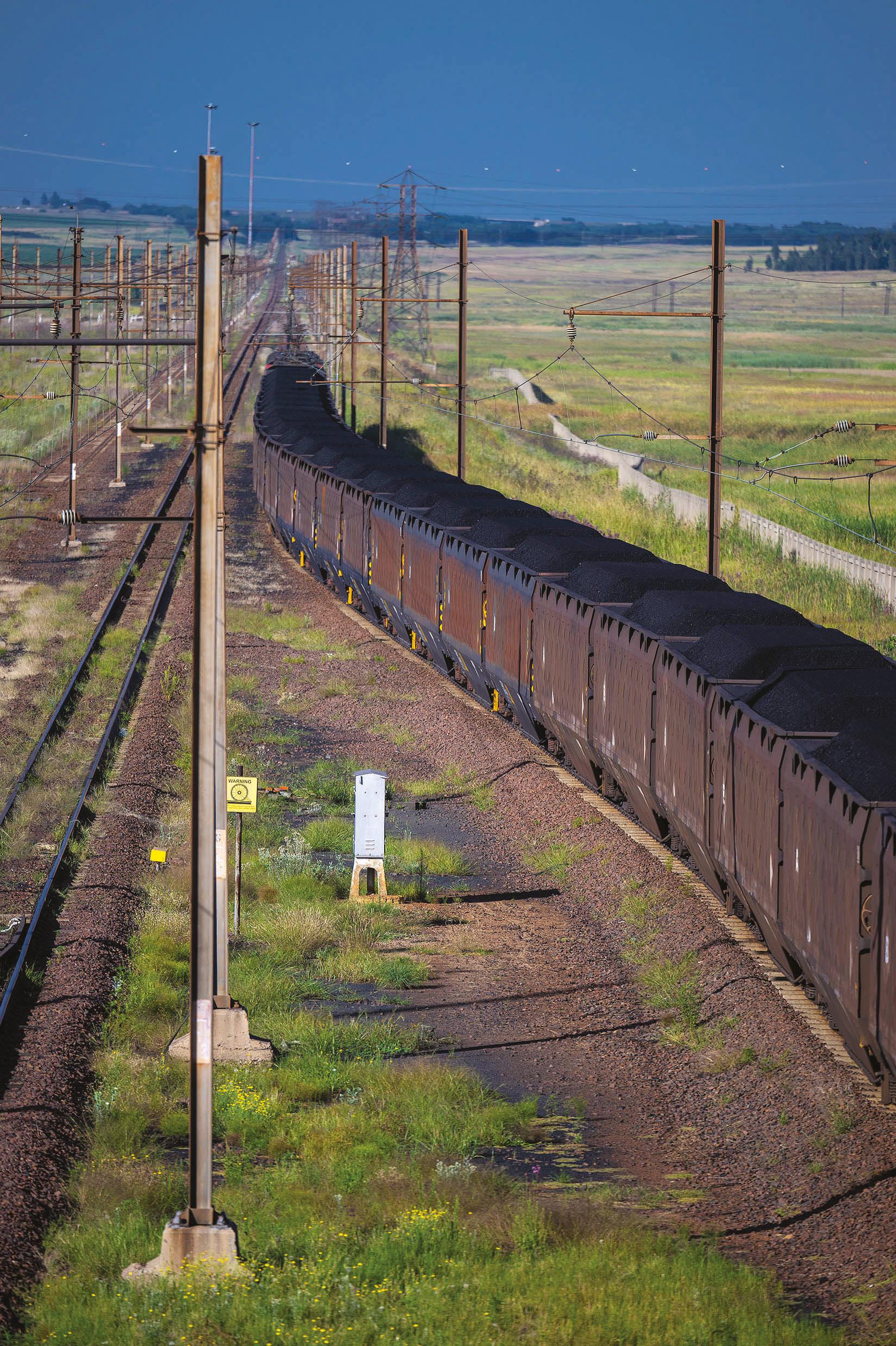

We understand the critical role that coal plays in energy security and affordability. Weʼre committed to harnessing this resource responsibly and ensuring a reliable energy source for a sustainable future.


frican Metering Solutions (AMS) has firmly established itself as a leader in Smart Metering Solutions in South Africa and now Africa, a proudly South African Level 1 BWO company. Our Smart Water and Electricity Meters play a key role in safeguarding two of the most precious resources in South Africa, Water and Electricity!
Throughout our multi-decade history, we have led innovation in:
• Metering
• Smart load management Outage management
• Revenue recovery
• Revenue management
• Job creation
• Localisation
• Grid digitisation (Smart Infrastructure Management)
• Data analytics
• AI, BI; and
• The enablement of Small-Scale Embedded Generation (SSEG).
At AMS, we pride ourselves in being adaptable and able to meet the diverse needs of private clients, commercial clients, municipal and government entities within the utilities and revenue recovery and management sectors.
We’ve assisted numerous (public and private) clients in reducing their operating expenditure, increasing their revenue recovery, protecting their assets, digitizing their grid and improving their customer service.


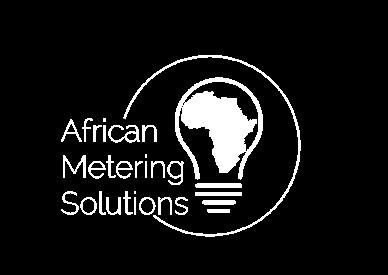


Our Johannesburg located Manufacturing Facility has a dedicated team of experts who use the latest innovative technology to produce a variety of Smart Electricity and Smart Water Meters bespoke to our clients’ requirements. The team firmly believe in creating African Solutions for African Problems.
Our unique solutions incorporate innovative technology in the design and development of our Smart Meters.
This enables utilisation of our products in the battle to minimise water and electricity losses and maximise conservation and energy saving efforts in Africa - with the ability to recover revenue through postpaid and or prepaid vending for all clients.
The result of this is accurate customer readings, verified billing, maximum revenue recovery, reduced water and electricity losses and the enablement of
infrastructure digitization with maximum efficiency and “happy” customers.
AMS is the only local meter manufacturing facility with a recycling plant on premises. This enables our participation in reducing the negative environmental impact industry has on our planet, and keeps us active in the fight to save our natural resources while fostering local job creation.
AMS trains people local to our customers’ areas. We have a full in-house training facility and are mobile training enabled as well. AMS holds multiple international OEM training accreditations and prides itself in creating sustainable local empowerment in the Smart Electricity and Smart Water Meter industry.
Through partnerships with local informal traders, AMS creates economic opportunities for these traders in collecting waste for recycling.
AMS through its deployment of the “ONE” Platform is able to ensure maximum local revenue retention, thus growing the local economy wherever AMS Solutions/Services are deployed.
AMS holds multiple ISO certifications, NRCS approvals, ICASA Certifications and is a member of the statutory organisations’ governing the utility’s industry.
AMS has exhibited at numerous conferences and shows in South Africa as well as participated indirectly by supporting AMS customers at exhibitions and expos in South Africa and numerous other African Countries.
ENCA has featured the AMS factory in an in-depth visit and interview at our premises in recognition of the contribution AMS has made in job creation, empowerment and technology.



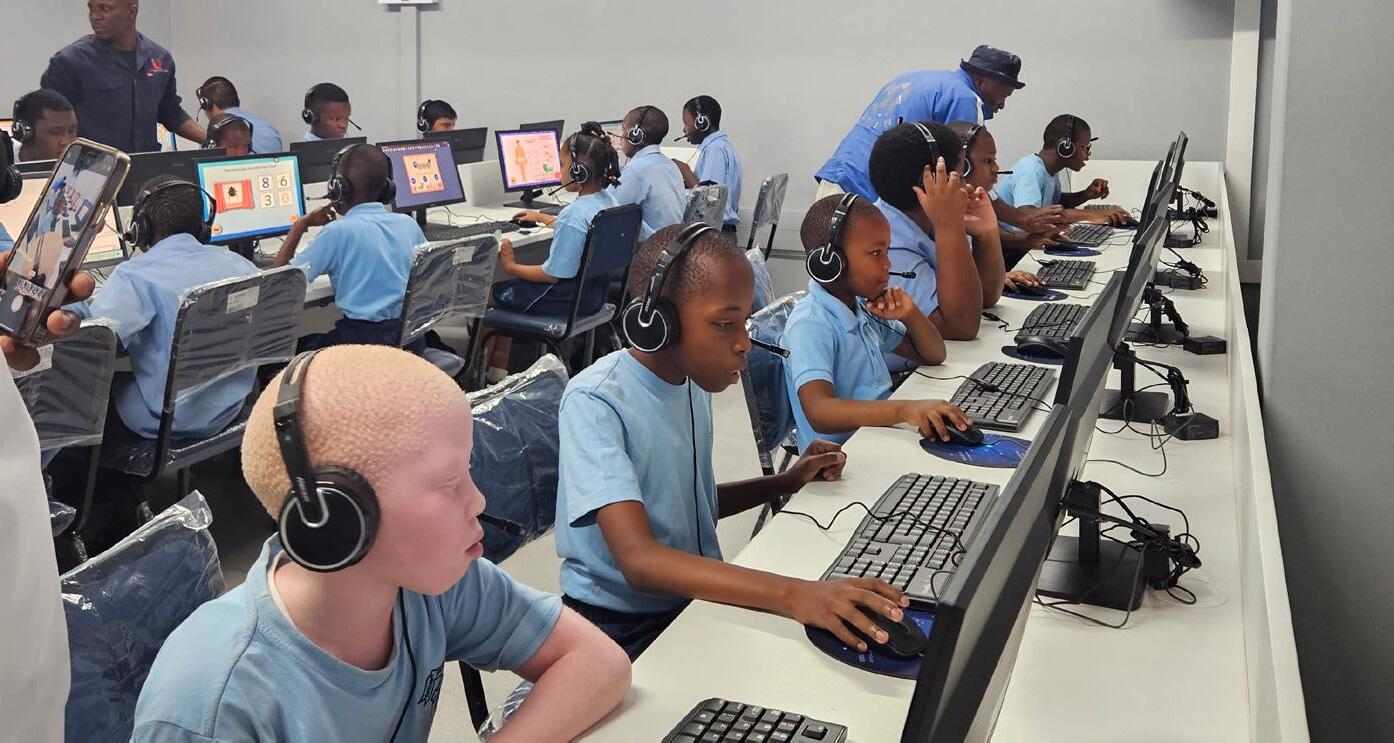
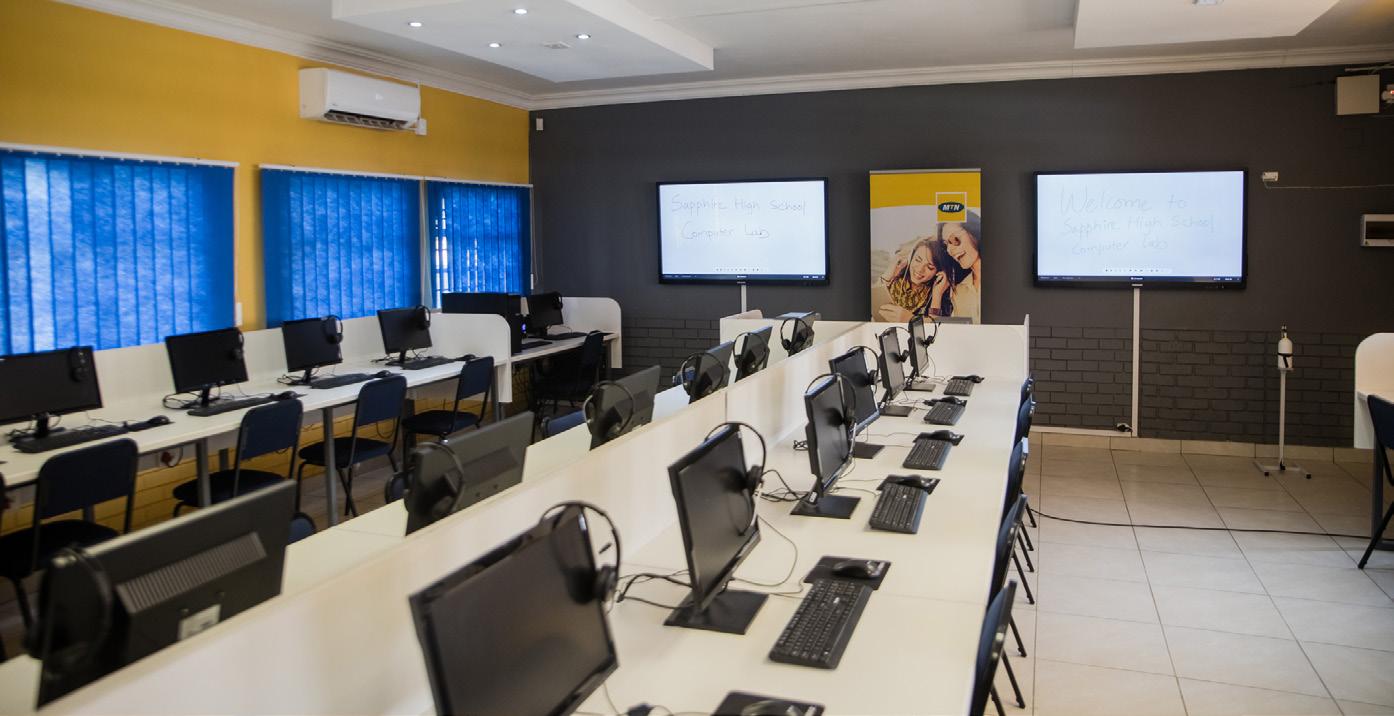
If South Africa is to achieve its aim of becoming an ‘e-skilled’ economy, South Africans need to be empowered and ready to participate in the IT sector and growing gig economy.
While there are many ways to tackle the pressing social issues facing South Africa today, the MTN SA Foundation’s approach is to use technology to create shared value in education.
As MTN’s primary vehicle for contributing to transformational social change, the MTN SA Foundation works to deliver a number of structured corporate social investment interventions while contributing to building a more developed socioeconomic environment for current and future generations.
As the Fourth Industrial Revolution deepens and the digital environment rapidly evolves, it is natural that
South Africa should aspire to become an ‘e-skilled’ economy. There are, however, stumbling blocks on the path, including our lack of science, technology, engineering, and mathematics (STEM) matriculants and, where these skills do exist, the development of the entrepreneurial skills required to broaden participation in the IT field.
Helping to increase the number of STEM matriculants lies in educational policy and in the development of initiatives that the government must implement if it aims to make South Africa an ‘e-skilled’ nation. Accomplishing national objectives by assisting IT entrepreneurs to obtain the business skills required to energise further and expand the sector, is where the private sector and its partners can make a significant contribution.
Medium-sized IT companies, for example, can become role models in their communities, guiding and encouraging others to become established and competitive in the digital world. In support, >
the MTN SA Foundation has undertaken the task of empowering entrepreneurs by implementing programmes which aims to foster an entrepreneurial mindset through training, mentorship, and small business support.
As a major player in the telecommunications industry and employer of a large workforce, MTN believes it has an important role to play in providing youth with opportunities to enhance their ICT skills and long-term career prospects. MTN also has a role to play in enabling an environment for innovation, entrepreneurship, and job creation to grow in the digital economy.
In 2021, the MTN Foundation, in partnership with the Department of Basic Education, unveiled the MTN Online School—a transformative digital learning platform catering to learners from Grade R to Grade 12. This initiative reflects a commitment to advancing education through technology.
MTN Online School is a free integrated online educational portal developed in partnership with the Department of Basic Education (DBE) and the National Education Collaboration Trust (NECT). The platform provides a comprehensive digital curriculum for grades R-12, covering a wide range of subjects and topics. Learners can access video lessons that supplement classroom learning. These videos cover various subjects and help reinforce concepts.
The platform offers assessments to test learners’ knowledge and understanding also provides extratuition lessons to enhance their understanding of specific subjects.
The MTN Online School initiative continues to pave the way for a


technologically advanced and inclusive education landscape in South Africa.
To bridge the digital divide and accelerate digital access and digital literacy, MTN has over the years invested heavily in digitizing education through the investment of over 300 multimedia centres in schools and communities across South Africa. Additionally, we have partnered with the Department of Basic Education to assist digitize Grade 10 to 12 curriculum aligned textbooks and workbooks for Information Technology (IT) and Computer Applied Technology (CAT), over R9 million was invested in this project.
The MTN SA Foundation fulfils its mandate through a range of community programmes designed to allow for agility and responsiveness
in delivering solutions to the most disadvantaged communities across South Africa. The interventions are underpinned by an entrepreneurship programme targeting small and medium enterprises (SMMEs), university students and high school learners nationally.
A digitally empowered society is a winning society. If South Africa is to retain and develop its promise as one of the continent’s leading economies, the digital divide that separates the “haves” from the “have-nots” must be breached, and therefore in 2023 the MTN SA Foundation, invested R14 million in its ‘Digital Skills for Digital Jobs ‘ drive to equip 900

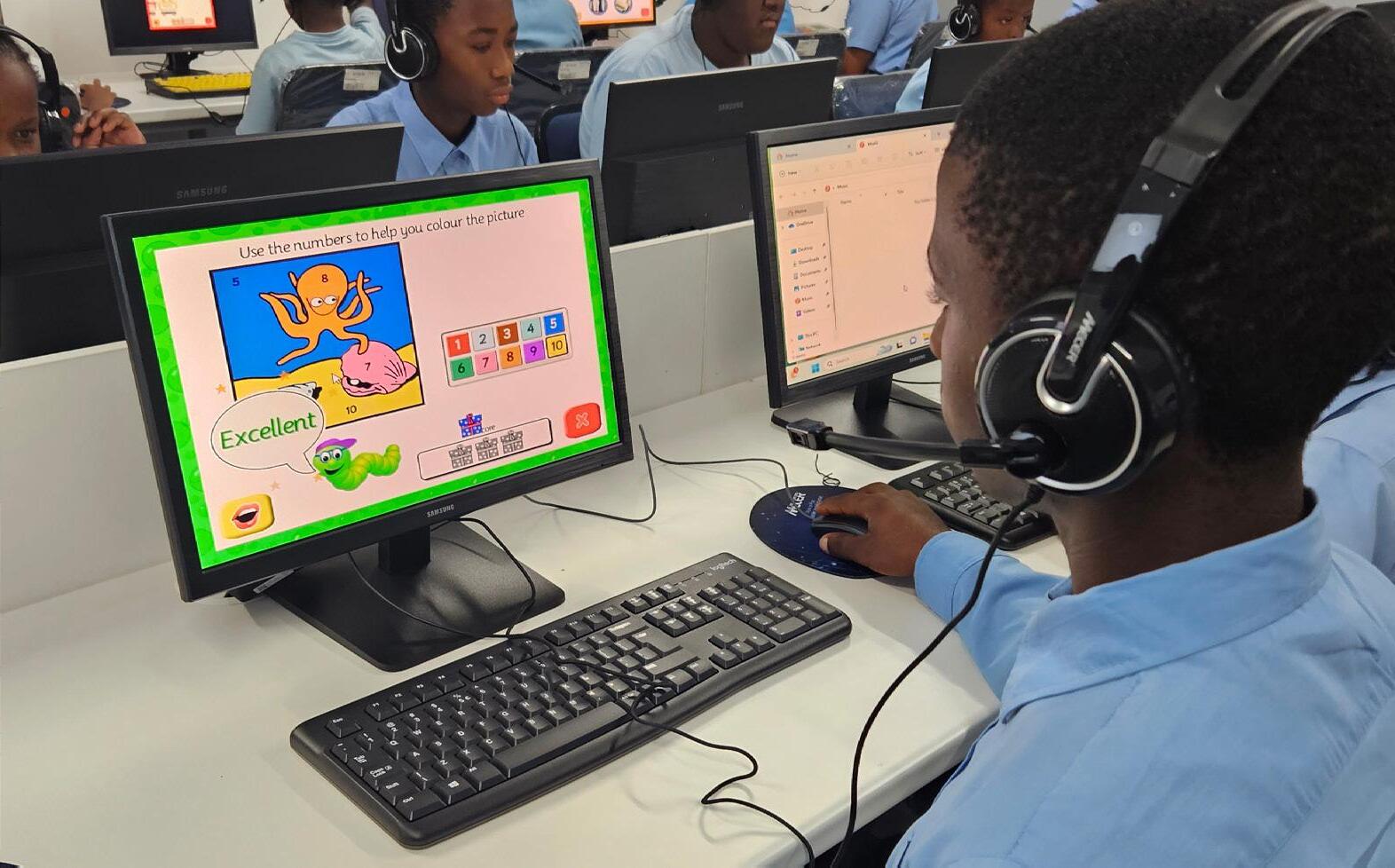
unemployed South African youth nationally, 100 candidates per province with the skills they need to grow into innovative entrepreneurs and even find employment.
The programme also assists with developing and improving the entrepreneurial skills and business processes of small businesses within the ICT sector.
As an extension of the existing ICT SMME accelerator programmes, the Foundation has introduced the MTN Women in Digital Business challenge (MTN WDBC) through existing implementation partners.
The programme looks to provide financial and other resources to a cohort of deserving black womenowned ICT businesses, with the view of further accelerating their business for growth, sustainability, and job creation. The challenge is only open to female graduates/ alumni members from previous MTN Accelerated Business Development programmes.
Through the MTN WDBC the Foundation provides ICT business owners with the tools to create businesses that are robust, innovative, and able to succeed in a challenging and ever-changing operating context. The programmes are implemented at three levels and aim to foster an
entrepreneurial mindset through training, mentorship, and small business support.
One of the MTN SA Foundation’s most significant youth skills development initiatives is the MTN Digital Skills Academy. Launched in December 2023, the portal focuses on career guidance and preparing young learners and unemployed youth for jobs of the future.
With innovation and growth at the forefront of our economy in our modern, connected world, our digital skills training broadens user thinking and the ability to innovate.
Through trusted relationships that we have with our implementing partners, we hope that we can help more South Africans realise their potential through programmes such as the Digital Marketing programme.
At completion of the programme, we believe that candidates will walk away more resilient, with creative and critical decision-making skills to start or grow their business. The programme is also an invaluable networking opportunity where candidates and mentors can interact on challenges facing our sector. We are trying to bridge the gap between the learning material and the real world, where candidates can put the skills to practice.
At university-level, the MTN SA Foundation partners with Enactus South Africa to deliver business training and mentorship to tertiary students across the country. The programme brings together students, academics and business leaders who are committed to using the power of entrepreneurial action to improve the quality of life and standard of living for people in need. Young people are challenged to design projects that demonstrate their entrepreneurial skills and aptitudes.
The MTN Digital Innovation challenge is an extension of the overarching Enactus programme, and the aim of this challenge is to facilitate the development of digital services to address socio-economic challenges within the health, education and agricultural sectors.
South Africa's future must be rooted in a digital focus now, and our Ambition 2025 strategy aims at bringing a bold new digital world closer to all South Africans. MTN SA believes that the power of technology is the key to opening opportunities. Central to our national success will be promoting and developing entrepreneurial skills and sustainable business practices in the small ICT business sector. It is a commitment that we at the MTN SA Foundation will continue to support and promote.
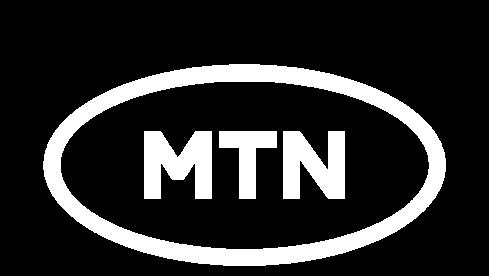
For more information on these and other MTN SA Foundation programmes, please visit www.mtn.co.za.

From 26th February to the 08th March the National School of Government (NSG) in partnership with the National University of Singapore and UNICEF hosted the second cohort of the Executive Course for Evaluation Leaders (ExCEL) Training Programme for senior government leaders and UNICEF partners.
In October 2023, the first cohort of the programme in partnership with the NSG visited the organisation.
The two-week training programme was attended by over fifty delegates from South Africa and various other countries including Brazil, Angola,
Lesotho, Mozambique, Uganda, Liberia, China, Zimbabwe, Mongolia, Sri Lanka, Ukraine and North Macedonia. The inaugural cohort of the programme in South Africa in October 2023 was attended by a total of 42 participants from countries such as Zimbabwe, The Kingdom of Eswatini, Kenya, Brazil and Singapore. Participants from the different countries, who are specialists and experts in the field of Monitoring and Evaluation, converge for the two weeks to learn how to improve their evaluation skills as managers in their different capacities.
This innovative programme is crafted for thought-leaders and decisionmakers to improve programmes and policies in their countries and contribute to building a culture
of evaluative thinking around the achievement of sustainable results.
The Programme is intentionally designed primarily for senior government officials and UNICEF staff to expand networks and communities of practice in evaluation at national and regional level, fostering a holistic, collaborative, and impactful approach to evaluation, and enabling participants to become evaluation champions and to promote a culture of evaluation.
• Culture Building: Promote a culture of culture-based policy making and a greater appreciation of evaluation to achieve sustainable results.
• Capacity Building: Enhance skills

and expertise necessary to lead more robust evaluations and related initiatives at national and regional level.
• Confidence Building: Increase confidence to guide evaluation work in the country and inspire others to use evaluation for learning and improvement.
• Network Building: Strengthen national and regional networks and communities of practice amongst evaluation leaders and champions in government.
During the two week period the course covers topics such as:
• Enabling Environment
• Importance of Evaluation Culture for Senior Leaders and Managers,
• Unique Contribution of Evaluation to Better Policies and Programs,
• Enabling Environment: Importance of Evaluation Culture for Senior Leaders
• Managers, The Role of Theory of Change in Evaluation amongst others.
ExCEL focuses on the leadership aspects of evaluation, with dedicated sessions on managerial and soft skills. It is run
as a workshop, with highly interactive sessions. A series of lectures are delivered to introduce the participants to the topics, but most of the sessions are used as engagement platforms for cases studies, exercises, and group work.
In order for ExCEL to be fully relevant to participants’ day-to-day work, the Course includes a “Practicum”, conducted by Country Delegations (partners and UNICEF staff from each country) who are guided through a series of steps to an Action Plan.
During these Practicum Sessions, Country Delegations prepare a short presentation to share the learnings on methods, findings, achievements, and challenges. During the last day of the Course, Country Delegations present their Action Plan to their peers and the Faculty.
After the 10-day ExCEL Course, Country Delegations continue to work on their Action Plan in their own locations, supported by both UNICEF and the University of Singapore.
The National School of Government (NSG) is mandated with the responsibility of ensuring that public servants comply with the provisions of established legislation, regulations and systems, and can exercise proper discretion and innovation in solving routine and complex delivery problems.
To this end, the NSG is tasked with ensuring that all public servants’ participate and complete education, training and development initiatives, as per relevant legislation and Cabinet directives. The NSG is furthermore expected to ensure service delivery impact by supporting institutional performance.
CONTACT DETAILS
Switchboard: +27 12 441 6000
General Facsimile: +27 12 441 6030
Contact Centre: +27 86 100 8326
E-mail Address:
contactcenre@thensg.gov.za
National School of Government
Department: REPUBLIC OF SOUTH AFRICA

Shirlene Wendy Siddall has held the position of Chief Executive Officer of the Leadership Academy for Guardians of Governance since 1 February 2023.
Prior to joining the Leadership Academy Shirlene was the Head of Internal Audit at SENTECH. With a career that has spanned more than 20 years, Shirlene has worked in many areas that include internal audit, financial controls, combined assurance, project management governance, risk and compliance, business process improvement, hotline reporting and investigation, and business analysis across various industries including Banking, Broadcasting, Mining, Petrochemical, and Telecoms.
She has also worked in countries and cultures other than South Africa, including the USA, and the UK, and across borders from SA with the UAE. Shirlene has a passion for developing people and assisting them to grow to their fullest potential. She is also a Gallup Clifton Strengths Coach.
Shirlene holds a BCom degree (majors in Accounting and Commercial Law) from Rhodes University and a BCom Honours degree from the Nelson Mandela Metropolitan University. She is a qualified Chartered Accountant in South Africa, CA (SA).
I look forward to seeing you at our Leadership Academy Governance Conference on 15 May 2024, to be held at Hotel Sky in Sandton, with the themeGovernance 360: Navigating and Influencing the Future of Governance.


The Leadership Academy for Guardians of Governance is a wholly owned subsidiary of the Institute of Internal Auditors South Africa (IIASA). The Academy serves and trains professionals who fall within the greater ambit of governance and supports Professional Bodies in their quest to supply the market with high-performing professionals.
Our vision and mission are to be recognised as the skills development and quality assurance provider of choice and to provide high-quality skills development programmes and quality assurance services for Governance, Risk and Compliance professionals.
The programmes we offer are not only beneficial for trainees but also of benefit for experienced internal auditors in need of skills and/ or accredited qualifications.
CPD Training Programmes are tailored to address different levels
of competency from Junior Internal Auditors through to Heads of Internal Audit. Training programmes are offered either Face to Face and Online (Instructor Led)
Categories available for CPD:
• Exam Preparation Courses for CIA and PIA
• Specialised Quality Assurance Courses
• CPD Courses - designed to assist professionals expand and enhance knowledge:
• Public Sector focused
• National Treasury endorsed courses
• Corporate Governance
• Data Analytics for Internal Auditors
• Integrated Internal Auditor –suite of IT courses
• Soft Skills
• Technical Skills in areas such as Project Management and Project Risks (APMR)
• Topical Issues like Ethics and the Internal Auditor (ETIA)
You can choose from our list of Training Programmes or we can design a programme to meet the professional development needs of your Team. Training is presented at a location of your choice. The advantages include alignment with your schedule, industryspecific case studies, and costs savings.
In partnerships with other professional bodies, we launched an on-demand skills development solution to meet individual and organisational skills development needs. Some of the benefits of this portal include, over 35 online learning programmes in different fields of study that provide over 50 CPD hours, for a once-off subscription fee for 12 months access to self-paced learning.
Our focus as the Learnerships Team is to provide all the necessary tools and systems to assist your learners in obtaining their occupational qualifications.
Objectives of our Professional Training Programme
• To provide a comprehensive and structured developmental pathway for Internal Auditors.
• To develop and improve internal audit competencies and quality of the Internal Audit Activity (IAA) work.
• To provide relevant workplace training as reinforcement of academic qualifications using a standardised logbook for each occupational qualification.
We currently offer the following occupational qualifications, which are all steppingstones on the career path of an Internal Auditor:
1. Occupational Certificate: Internal Auditor
2. Occupational Certificate: Internal Audit Manager
3. Occupational Certificate: Internal Auditor: ICT
4. Occupational Certificate: Internal Audit Manager: Quality Assurer
Our learnership programmes are accredited by the IIASA and Quality Council For Trades and Occupations (QCTO).
We can provide our training to all corners of the African region using various virtual platforms like MS Teams, Zoom, or Google Meet.
We also hold face-to-face classroom training centrally or where numbers allow at your workplace or country, as required.
The International Professional Practices Framework (IPPF) requires that the internal audit activity


must collectively possess or obtain the knowledge, skills, and other competencies needed to perform its responsibilities.
We have a team of specialists with the necessary proficiency, experience, and insight obtained through years of continuous improvement, in applying good practice in the internal audit profession, and our team’s professional input is available to you.
Our value chain of quality assurance products is designed to assist any size of internal audit activity, in the private and public sector, to achieve successful industry practices and adherence to the mandatory elements of the IPPF, and to enhance the value-add proposi-tion of the internal audit function within their organisation.
Each of the seven products we provide, as shown below, focuses on the delivery of internal audit excellence. Their goal is to raise your internal audit activity to a level of quality where it provides increasing value to its stakeholders.
Our QAS product offering includes the following:
1. Setting up a Quality Assurance Improvement Programme (QAIP)
2. Internal Assessment Support
3. Readiness Assessment
4. External Quality Assessment
a) Full Assessment
b)Self-assessment with Independent Validation
5. Audit Committee Assessment
6. Quality Tuesday Webinars
7. Follow-up Assessment i.e., File Reviews.
CONTACT INFO:
Website: www.governanceacademy.co.za
Telephone:
+27 11 609 1761
CEO: Shirlene W. Siddall: Shirlene@governanceacademy.co.za
CONTINUING PROFESSIONAL DEVELOPMENT
In-House Training: Joanne Naidoo: Joanne@governanceacademy.co.za
CPD Training:
Neo Mashike: Neo@governanceacademy.co.za
Sharene Smit: Sharene@governanceacademy.co.za
LEARNERSHIPS
Lemmy Kave: Lemmy@governanceacademy.co.za
Betty Abebrese: Betty@governanceacademy.co.za
Setsoali Ngema: Setsoali@governanceacademy.co.za
QUALITY ASSURANCE SERVICES
Unathi Mnyimba: Unathi@governanceacademy.co.za

Every year, March marks a significant period dedicated to raising awareness about consumer rights globally, and in a world where consumerism is at its peak, the importance of safeguarding consumer rights cannot be overstated.
With the World Consumer Rights Day on 15 March 2024 at its core, this month is an opportune moment to reflect on the strides made in protecting consumers and to contemplate the challenges that lie ahead.
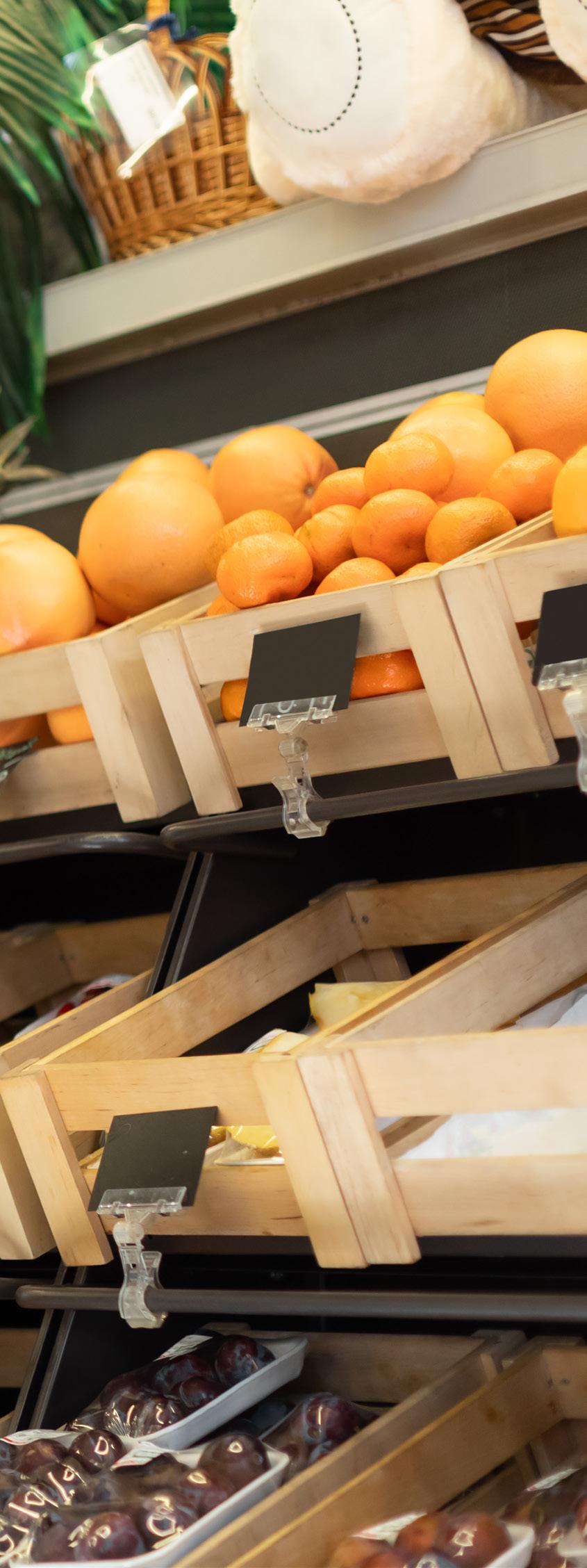
The theme for World Consumer Rights Day 2024, "Safe Products, Safe Consumers: Fostering Accountability and Compliance," resonates deeply with the mandate of the National Regulator for Compulsory Specifications (NRCS), a key player in ensuring consumer safety in South Africa. As we delve into the significance of this month and the pivotal role of the NRCS, it becomes evident that NRCS’ mandate extends far beyond mere regulation; it is a cornerstone for products safety and consumer protection.
The NRCS’s mandate is clear: protect consumers against unsafe products and ensure fair trade by enforcing these compulsory specifications and regulations. NRCS works tirelessly to ensure that products offered in the South African market do comply with safety requirements as set out in our various compulsory specifications and technical regulations.
In pursuance of this mandate, the NRCS confiscated non-compliant products worth approximately R928 million from the market in the last financial year. The majority of these were products were found non-compliant in terms of the Legal Metrology Act amounting to R675 million and electro-technical products to the value of to R160 million. Other non-compliances were for chemicals, materials and mechanicals to the value of R39,5 million, food products worth R26,7 million and automotive products amounting to R26,3 million.
World Consumer Rights Day is not just a date on the calendar; it is a global rallying point for consumer advocates, policymakers and businesses to come together and address pressing issues concerning consumer protection. In 2024, the theme underscores the crucial link between safe products and the well-being of consumers. It empha-sises the need for accountability and compliance
across the supply chain, from farm to fork in terms food safety.
At the heart of this theme lies the acknowledgment that consumers have the right to expect safe products that meet safety requirements. Consumers deserve products that are not only functional but also pose no threat to their health and safety. Achieving this requires a concerted effort from all stakeholders, including regulatory bodies like NRCS.
Established under the National Regulator for Compulsory Specifications Act 5 of 2008, NRCS plays a pivotal role in ensuring that products meet safety requirements before market distribution. These products span across the automotive, chemicals, mechanicals and material, electrotechnical, legal metrology and foods and associated industries.
Furthermore, NRCS continues to certify exported products and approval of imported products. In the last financial year, the NRCS issued over 8,000 health guarantees, facilitating the exportation of fish and fishery products valued at R6,3 billion to various export markets.
The NRCS works in conjunction with governmental bodies and various agencies to facilitate market entry for small, medium, and micro-enterprises (SMMEs), with a specific focus on the food sector. An illustrative case is canned fish, which serves as a crucial and economical protein source utilised in school meal programs throughout South Africa. Recognising the inherent risks associated with canned fish processing, the NRCS undertakes regulatory measures governing fish and fishery products.
This oversight aims to uphold food safety standards, safeguarding vulnerable consumer groups such as children, the elderly and individuals facing socio-economic hardships.
Additionally, the NRCS Published Compulsory Specifications for >

Efficiency of Electric motors, Energy Efficiency and safety of general service lamps to enhance consumer protection.
Furthermore, NRCS have developed and recommended for approval by the Minister of Trade, Industry and Competition, the Compulsory Specifications for Live Lobsters and Oysters to ensure the safety of fishery products
While the primary goal of NRCS is to protect consumers, its role extends beyond ensuring safety of products; it also contributes to economic growth and development. A safe and reliable marketplace instils confidence among consumers, encouraging increased consumption and fostering a healthy business environment.
When consumers trust that the products they purchase meet quality and safety standards, they are more likely to make repeat purchases and recommend those products to others.
NRCS certification process enhances the competitiveness of South African products in both domestic and international markets. By ensuring compliance with global standards, NRCS facilitates access to export markets, thereby boosting trade and foreign exchange earnings. This, in turn, stimulates economic growth and creates employment opportunities across various sectors.
Despite its significant contributions, NRCS faces several challenges in fulfilling its mandate effectively. One of the primary challenges is the spread of counterfeit and substandard products in the market.
These products not only pose risks to consumer safety but also undermine the credibility of legitimate businesses. Combatting this requires enhanced collaboration between NRCS, law enforcement agencies and other stakeholders to crack down on illicit trade and enforce regulations rigorously.
As we commemorate World Consumer Rights Day, it is essential to reflect on the progress made in protecting consumer rights and the challenges that lie ahead. NRCS mandate in ensuring safe products and fostering accountability is critical not only for consumer safety but also for economic growth and development.
By ensuring compliance with compulsory specifications, the NRCS enhances consumer confidence in locally produced goods and fosters international trade partnerships.
During this month, the NRCS remains dedicated to protecting consumer interests through a range of initiatives and awareness campaigns. This commitment extends to NRCS involvement in commemorating World Consumer Rights Day 2024, scheduled for March 15, at the University of Free State in Bloemfontein.
World Consumer Rights Month serves as an opportune moment for consumers to familiarise themselves with the services offered by the NRCS. Whether it is seeking assistance with product complaints or accessing information about product safety standards, consumers can rely on the NRCS as a trusted resource.
Ultimately, a safer and more sustainable marketplace benefits everyone –consumers, businesses and society as a whole. As we strive towards this goal, let us recall that consumer rights are not just a matter of regulation; they are a fundamental aspect of human dignity and well-being. By upholding these rights, we can create a world where every consumer can shop with confidence, knowing that their safety and interests are protected.
As we navigate the complexities of the modern marketplace, let us remember that consumers are at the heart of every transaction. By upholding consumer rights and promoting safe products, we can build a more equitable and prosperous society for all.

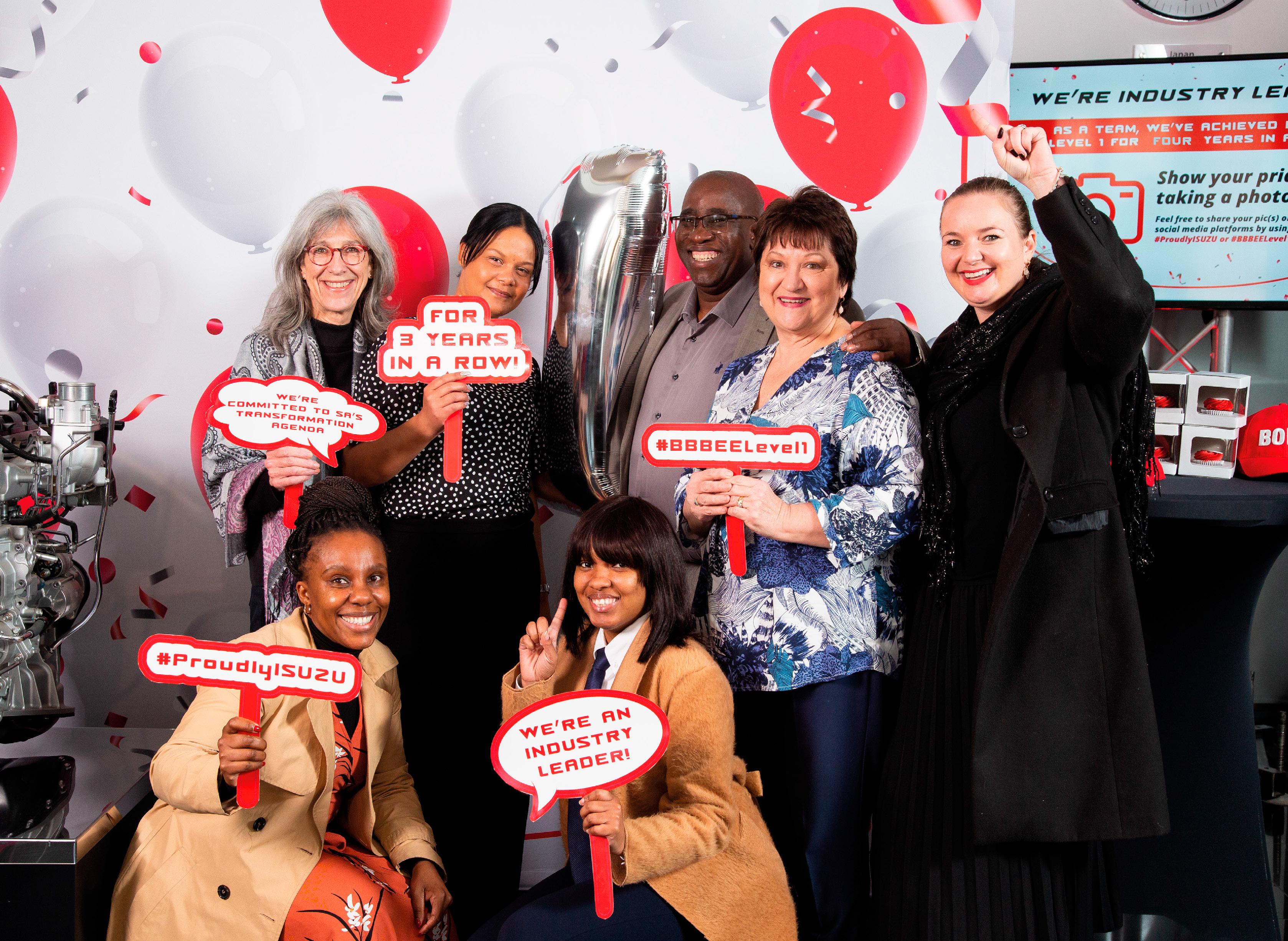

ISUZU’s trucks are celebrating a remarkable 11-year reign as the number one brand in South Africa's cab-over-chassis medium and heavy commercial vehicle (MCV and HCV) segments.
Despite market challenges, ISUZU’s trucks continue to dominate, reinforcing ISUZU’s commitment to excellence and customer satisfaction.
“These results reinforce our dedication to providing high-quality, innovative solutions. ISUZU trucks remain committed to setting industry standards and driving the future of commercial transportation, ” said Craig Uren, ISUZU Motors South Africa Senior Vice President Revenue Generations South African Customs Union Markets.
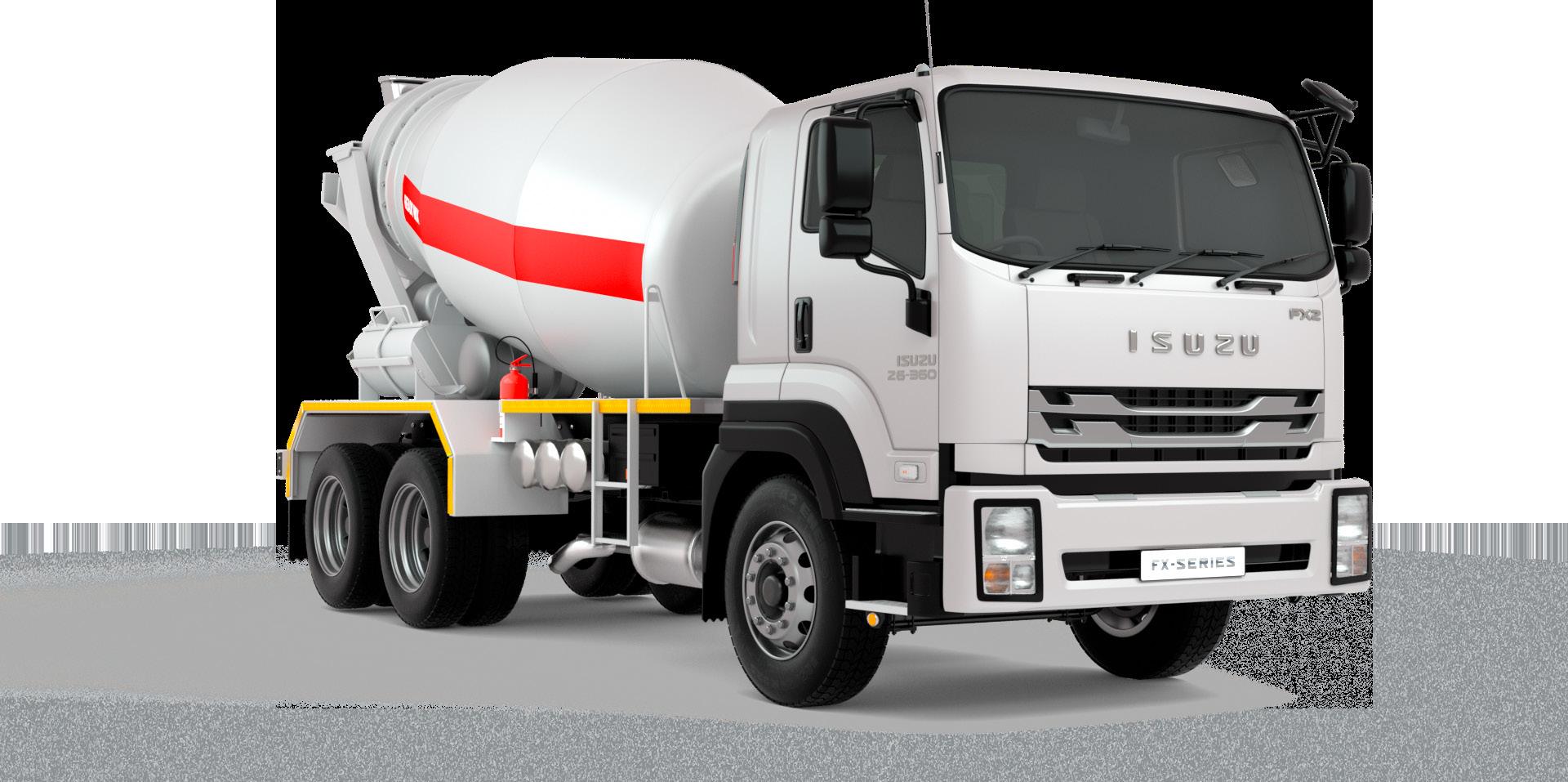



As community living becomes a cornerstone of modern society, the imperative for robust governance and effective dispute resolution within these schemes is paramount. The Community Schemes Ombud Service (CSOS) emerges as a critical institution, dedicated to safeguarding the welfare of residents and ensuring the seamless operation of communal environments throughout the nation
Established under the Community Schemes Service Act 9 of 2011, the CSOS is an entity of the Department of Human Settlements. Its mission is to regulate the conduct within
community schemes, fostering good governance that is essential for harmonious communal living. Defined by the CSOS Act as shared living arrangements with joint responsibility for land and buildings, community schemes are a unique residential dynamic that requires attentive oversight.
The CSOS’s mandate is multifaceted, encompassing the regulation and monitoring of scheme governance documentation, ensuring its quality and compliance. Additionally, the CSOS is tasked with developing a comprehensive dispute resolution service, providing essential training for conciliators and adjudicators, and maintaining a transparent repository of scheme governance
documentation, accessible to the public both electronically and through other means.
Registration with the CSOS is not merely a formality; it is a critical step for community schemes to align with statutory requirements, guaranteeing that residents’ rights and responsibilities are upheld within a framework of legal and administrative support.
One might ask why register with the CSOS?
In accordance with the CSOS Act, all community schemes are mandated to register with the Community Schemes Ombud Service (CSOS). Registration must be completed within 30 days of either the CSOS Regulations' implementation on October 7, 2016, or the community scheme's date of incorporation as per relevant laws.
And what is a community scheme?
In terms of Section 1 of CSOS Act, the term “community scheme” refers to any scheme or arrangement where there is shared use of and responsibility for parts of land and buildings, including but not limited to:
• Sectional titles development schemes;
• Share block companies;
• Home or property owners’ associations (inclusive of nonprofit companies and common law associations);
• Housing schemes for retired persons; and
• Housing co-operatives.
What are the costs associated with registering a scheme?
Remarkably, there is no registration fee required.
As a resident within a community scheme, do I have the right to verify the registration status of my scheme?
Absolutely, as a community scheme dweller, you have the legal right to >

check with the CSOS whether your scheme is duly registered or not. It’s a provision that empowers residents to be informed and involved.
Good news is that, in a move that brings a positive change, the CSOS has, since the onset of March 2024, implemented a pivotal amendment to its Practice Directive on the registration of community schemes. This amendment is designed to simplify administrative procedures across the board. The revised directive is set to expedite processes and bolster efficiency, marking a significant step forward in the management of community schemes. Residents and managing agents alike can anticipate a more streamlined experience in their administrative interactions with the CSOS.
Previously, community schemes were required to submit several documents upon registration, including prescribed forms, rules, constitutions, regulations, and financial statements. However, the


Acting Chief Ombud, Ms Thembelihle Mbatha, in consultation with the stakeholders revised the Practice Directive to make the registration process more accessible. Amendments now allow for registration through the CSOS Connect online platform www. csosconnect.org.za or via a QR Code link, ensuring authorized representation during registration.
“Support for the registration process is readily available, with options to submit forms and documents via email or through the CSOS call centre. The CSOS commits to completing the registration of community schemes within seven days of receiving all necessary documentation” says Mbatha.
Following registration, schemes must submit supporting documents within thirty days for quality assurance and approval. These documents include scheme rules, constitutions, memorandum of incorporation, sectional title plans, levy schedules, financial
statements, and audit reports.
This amendment underscores the CSOS's dedication to enhancing community scheme governance and providing a supportive operational framework. The streamlined process not only benefits individual schemes but also contributes to better management and conduct within collective living spaces.
For community schemes, this development signifies a leap forward in administrative efficiency and regulatory compliance, laying the groundwork for future improvements in the sector. Importantly, there is no registration fee for community schemes.
The heart of CSOS lies in its dispute resolution services. When conflicts arise whether over maintenance issues, noise complaints, or disagreements about levies CSOS steps in as a mediator. By providing free, equitable, and impartial resolution processes, CSOS ensures that disputes are addressed swiftly and fairly. Residents can

avoid the expense and time-consuming nature of private arbitration or lengthy litigation.
Courts recognise the importance of CSOS as the first port of call for dispute resolution. According to Section 59(a) (iii) and Regulation 18(8) of the CSOS Act, parties involved in community scheme disputes must approach CSOS before considering legal action in the High Court. This principle prevents unnecessary strain on the judicial system and encourages parties to explore alternative avenues first. Rushing to the High Court without considering CSOS is deemed an abuse of legal process.
In shared living, CSOS threads together harmony, fairness, and efficient conflict resolution. Registering your community scheme with CSOS is not just a legal obligation; it's a step toward fostering a thriving and cohesive community. So, next time a dispute arises, consider CSOS as your first stop, it’s where solutions begin and where community well-being flourishes.
Remember failure to register your community scheme is a criminal offense!
At the helm of this organisation CSOS, is the Acting Chief Ombud, Thembelihle Mbatha, a multi-talented young Chartered Accountant (South Africa).
She consistently receives recognition for her achievements in financial planning, strategic enhancements, and operational improvements. She assumed her acting duties in April 2023, Mbatha brings over 10 years of experience in finance and audit.
Her excellent reputation extends to problem-solving, enhancing customer satisfaction, and driving overall operational efficiency. Notably, she is adept at cost-saving while simultaneously increasing revenue collections.
Achievements:
• Winner of the 2018 Oliver Tambo Public Sector Leader Award
• Finalist in the CA(SA) Top Under 35 National Awards 2019
Finalist in two categories of the Standard Bank Top Women Awards in 2017:
• Top Women in Female Public Sector Leader Award
• Top Young Achiever of the Year
Beyond her professional accomplishments, Mbatha is a philanthropist at heart. She is passionate about mentoring young girls, ensuring the development of a sustainable pool of future female leaders. In her own words, “If we can lift one another as we rise, we can definitely change the world.”
Her message to all community schemes who are not registered please do, and to all that are registered and have been paying the CSOS levies, have you received any payment acknowledgment from the CSOS? Have you received a statement receipt reflecting all the levy payments made to the CSOS? If NOT,
we do ask that you come forward so we can allocate your payments accordingly.
• All proof of payments made to the CSOS and the relevant levy calculators.
• CSOS registration number. Notification of changes within the Schemes Management e.g. Managing agent, Executive Committee etc.
• We will respond within 48 hours to your email queries.
• Attend to all queries in a professional manner.
• We have our readily available qualified personnel.
• The CSOS levy amount is calculated as follows: (ADMINISTRATION LEVIES PAID PER UNIT less R500.00) *2%, OR the Lesser of R40 per unit) per month.
• The CSOS Levy Calculator is available on the website: https://csos.org.za/ payment-of-levies/

CONTACT INFORMATION
Address:
Berkley Office Park, 8 Bauhinia Street, Highveld Techno Park, Centurion, 0169
Call: 0800-000-653
E-mail: info@csos.org.za
Website: www.csos.org.za
Registration: www.csosconnect.org.za

South Africa is no stranger to droughts and extreme weather conditions which impact on water scarcity and conservation.
Linked to the scarcity, is the rising of nonrevenue water (NRW) to unsustainable levels in Johannesburg. This is due to several factors, such as, non-payment, leaks, infrastructure vandalism and theft. While addressing the challenging issue of high-water consumption, the focus for the water entity is also firmly on water demand management.
Water demand management can be described as the comprehensive reforms and actions to optimise existing water supplies. The sustainable management of water supply constitutes one of the key challenges for many municipalities across the country, this is especially true for the City of Johannesburg (CoJ).

Through its monitoring systems, Johannesburg Water has picked up an unsustainable increase in water demand, this renders Water Conservation and Water Demand Management (WC/WDM) a strong priority in Johannesburg, to ensure a continuous and sustainable water supply and to avoid putting strain on the City’s water supply systems due to high water demand outstripping supply.
Water availability is presumably easy in theory because it is based on balancing supply to need. But this water needs to come from somewhere. The levels of water use in the Johannesburg are unsustainable.
The factors that influence water demand are as follows:
• Population growth and developments.
• Water usage habits of the general population within the city.
• Climate change.
• Industrialisation and commercial water use.
• Technical and non-technical losses.
• Ageing of infrastructure.
• Operational challenges such as electrical failures and load shedding which impacts the bulk supplier and municipalities
Theft and vandalism of infrastructure also plays a huge role in hampering reliable and uninterrupted water supply to residents and businesses. The City of Johannesburg loses millions of rands a year to theft and vandalism of infrastructure and assets.
Water demand is projected to outweigh supply by 2030, thus, it is important for Johannesburg Water to ensure that it reduces its future demand. Even though water demand has reduced over the past few years, from 309 litres per capita per day (l/c/d) to 267 l/c/d, efforts need to be intensified to progressively reduce it to the norm of 175 l/c/d, as stipulated in the National Water and Sanitation Master Plan.
To mitigate the losses and improve the reliability of water supply, Johannesburg Water has in place short, medium, and long-term plans to alleviate water supply issues. The Entity has set out to reduce water demand and invest in alternative water sources and tools for water conservation, through its Water Conservation and Water Demand Management strategy. Addressing water scarcity and conservation remains at the centre of development plans of Johannesburg Water.
Johannesburg Water has also established a team to investigate the increase in NRW which includes a detailed review of the reduction in the billing volumes and enhancing the current meter reading system to enable a zonal tracking of the revenue water and non-revenue water.
Plans are in place to install advance metering for large water users and STS prepaid meters for households.
The water entity has set out to reduce water demand and invest in alternative water sources and tools for water conservation, through its WC/WDM strategy. However, it is important to highlight that infrastructure deterioration is occurring at a faster rate than the city can invest in. However, addressing water scarcity and conservation remain at the centre of development plans of Johannesburg Water.
The uncertainty of future trends in climate, economic activities, population growth, water demand and infrastructure investment needs, means Johannesburg has a to do a balancing in addressing high-water consumption which is exceeding supply.
The entity will work on improving billing and recovery rates and encouraging the reduction in water consumption. The everyday conservation efforts of Johannesburg residents and businesses in the city will help in addressing the unsustainably high-water consumption particularly during the warmer months.


In a significant leap towards sustainable energy solutions, Blue Nova Energy proudly announces the successful installation of the iESS (intelligent Energy Storage System) 6MW / 18MWh, the largest residential estate backup batter y system in South Africa. This milestone achievement comes as par t of a par tnership with Midstream Estate, a l e a
Situated within the picturesque landscapes of Midstream Estate, the newly completed project showcases BlueNova Energy's advanced lithium batter y technology, providing residents with a reliable backup power solution during grid outages or fluctuations. This state- of-the-ar t system not only ensures uninterrupted electricity supply but it also contributes to reducing the estate's carbon footprint
"We are thrilled to be par tnered with Midstream Estate and to finally see this groundbreaking project come to f r u i t i o n , "
"By harnessing the powe r of premium qualit y lithium batter y storage components, we are empowering residents to take control of their energy needs while at the same time also promoting sustainable energy practices locally."
The successful deployment of this unique record-breaking i E S S s o l u t i o n a t M i d s t
l u e N o

’s
innovation and the advancement of energy sustainability
As the demand for renewable energy solutions continues to grow, BlueNova intends to remain among the forefront of such pioneering energy advancements, paving the way to a brighter and more resilient future.

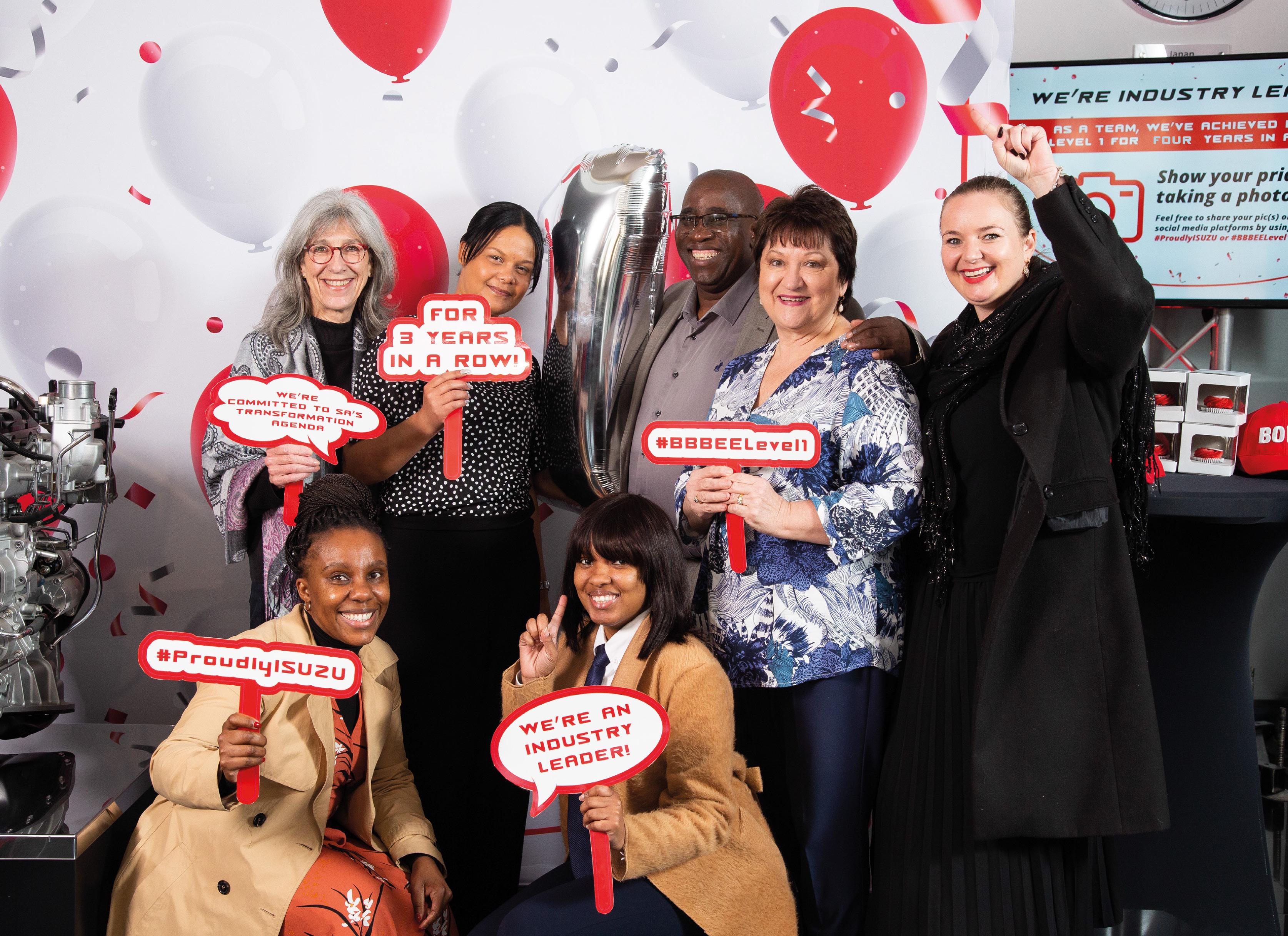


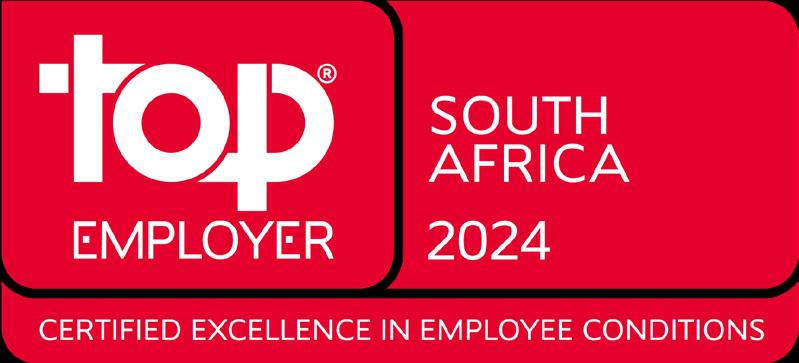
ISUZU recognised as a 2024 Top Employer for the second year in a row
ISUZU has been recognised as a 2024 Top Employer in South Africa by the internationally recognised Top Employers Institute for the second year in a row.
The Top Employers Institute is a global authority on recognising people practices. It certifies organisations based on the participation, validation, and audit of the Human Resources Best Practices Survey.
The certification as Top Employer 2024 recognises ISUZU’s efforts in promoting the best people practices and creating an inclusive world of work for all its employees.
“Our people strategy, which is informed by our business strategy, encourages us to drive a high-performance culture and to respond to the evolving needs of our workforce which include championing Diversity, Equity, Inclusion and Belonging (DEIB) initiatives.” says ISUZU Senior Vice President Human Capital and Corporate Affairs, Mongezi Hermans.
ISUZU is the first and only OEM to achieve B-BBEE Level 1 for four years in a row
As an industry leading B-BBEE level 1 contributor for four years in a row, ISUZU invests in the growth of South Africa’s social and economic transformation journey.
As part of our commitment to transform beyond compliance, we have invested in localisation to ensure we empower and grow our local value chain.


The National Fund for Municipal Workers (NFMW) is the largest fund in Local Government with approximately R27.8 billion in assets under management, serving more than 56,000 members and councillors across South Africa.
With a steadfast commitment to our members, we prioritise their needs in every decision and strategy we implement. Our dedication to excellence ensures minimal administration costs, maximising contributions towards retirement savings.
Achieving excellent long-term investment performance, puts us on par with the best global portfolios and ahead of our peers in Local Government. Recognised with numerous Institute of Retirement Funds Africa Best Practices Industry Awards, we set the benchmark for excellence in the retirement fund sector.
At the NFMW we go beyond financial support, offering comprehensive personal financial planning, retirement benefit counselling, and a unique health and wellness program for members and their families.
With our unwavering commitment to good governance, impactful investing yielding financially sound returns, care for our members, and responsible leadership, the NFMW assures unparalleled value to all our members.
Our focus remains on continuing to provide exceptional service to our members, ensuring their financial security and well-being. We aim to further improve our member value proposition to meet the evolving needs of our members and continue to contribute to socio-economic prosperity in various ways to positively impact the lives of our members, their families and communities today and tomorrow!
MUNICIPAL

KEEPING YOU UP-TO-DATE WITH THE LATEST AND MOST RELEVANT NEWS IN SOUTH AFRICA

CAPRICORN DISTRICT MUNICIPALITY

Schools motivated by CDM Cleanest School Competition
ETHEKWINI MUNICIPALITY
Economy bolstered by construction of Takealot Distribution Centre
R10 million agreement signed to set up film infrastructure
MANGAUNG METROPOLITAN MUNICIPALITY
Strategies to meet the growing water demand
BITOU MUNICIPALITY
Forges ahead with handing over houses
STEVE TSHWETE LOCAL MUNICIPALITY
Home to the new Middleburg Provincial Hospital

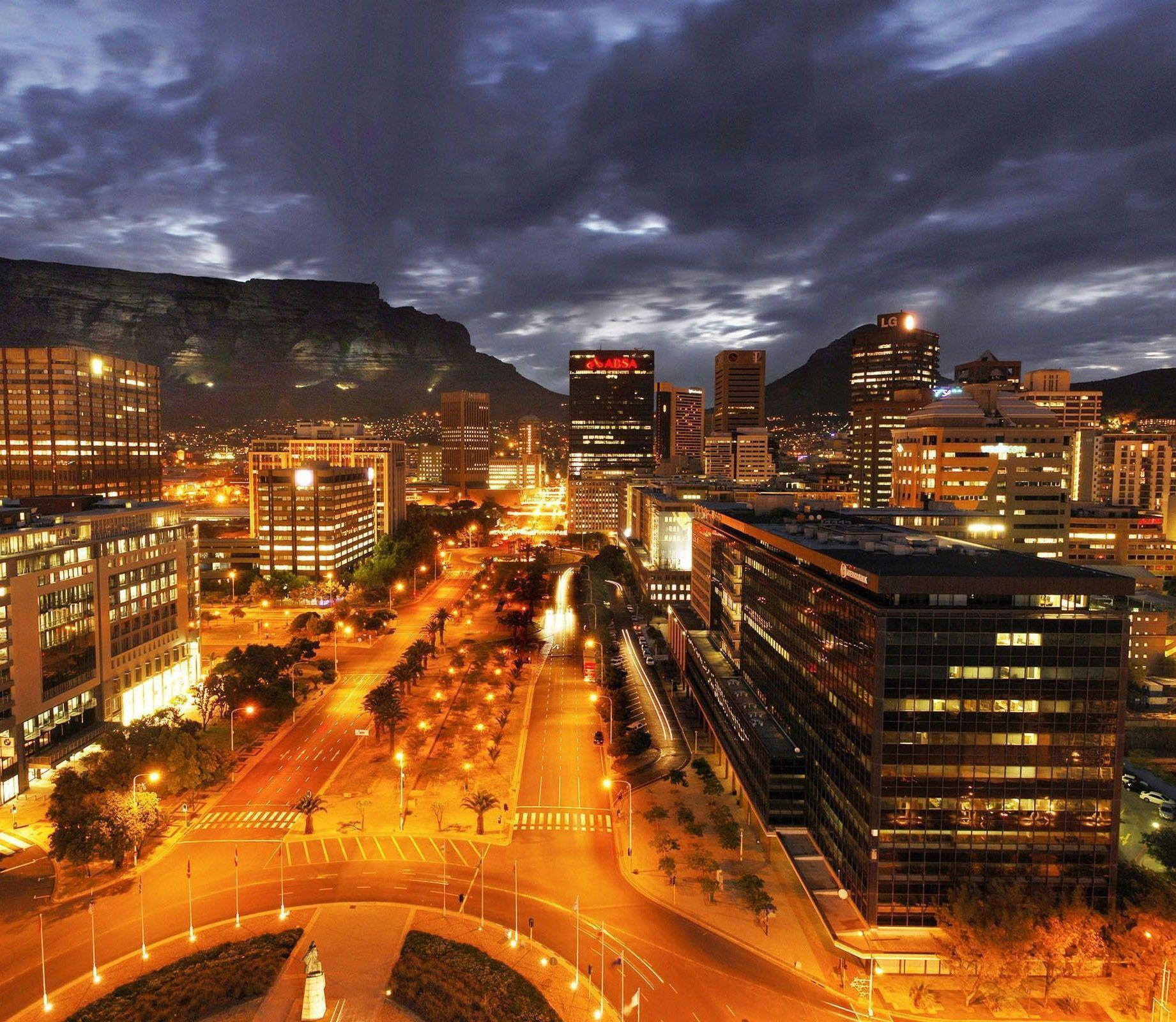
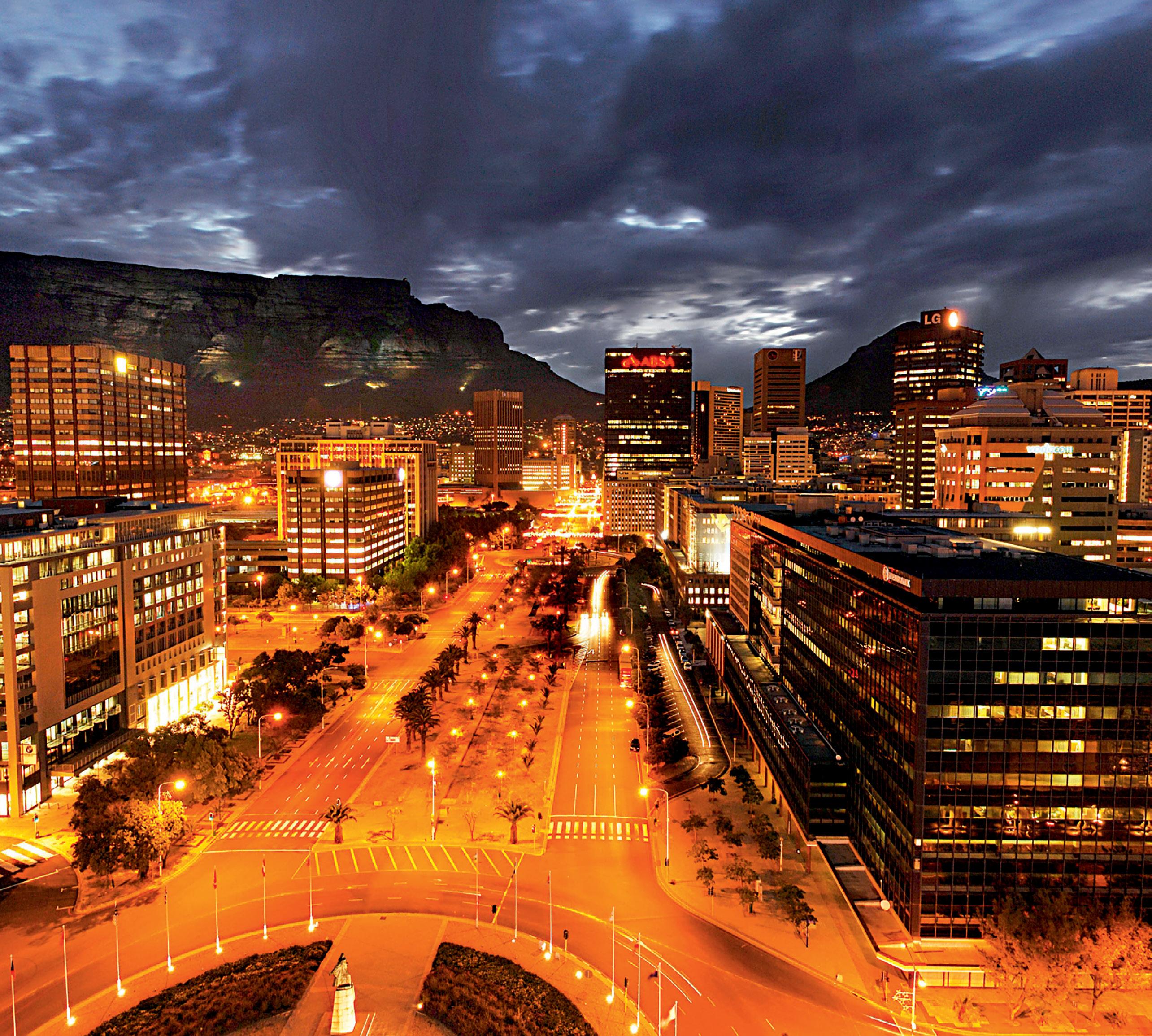
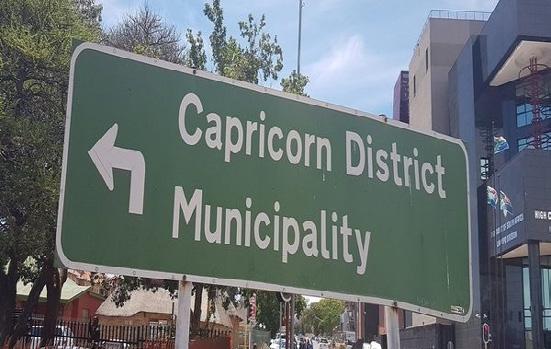
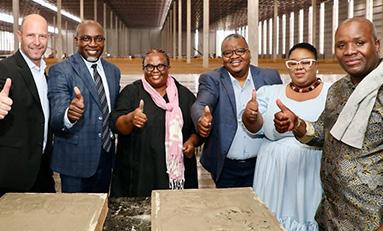
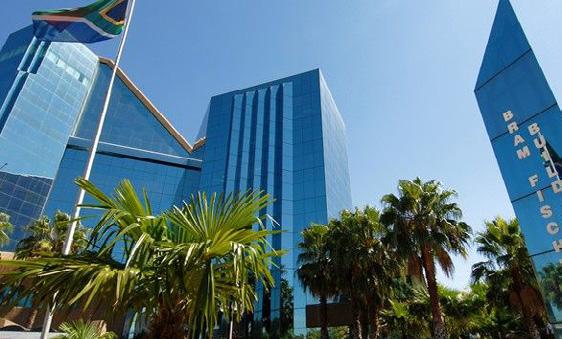
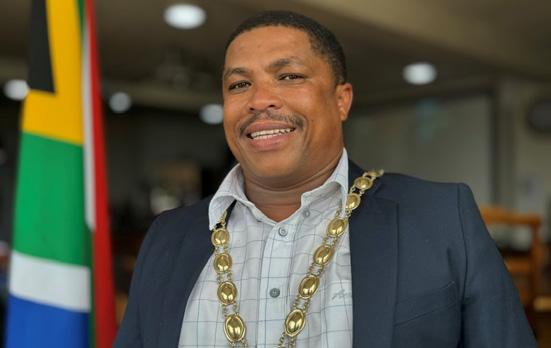

The City of Matlosana Municipality is situated approximately 164 km South West of Johannesburg, strategically located on the N12 Treasure Route, which is the North West Province’s primary tourism corridor.
The scenic N12 starts from Mpumalanga and is the gateway to the Western Cape Province. The route takes you from eMalahleni, to the vibrant Gauteng Province and the Sterkfontein Cradle of Humankind World Heritage Site, and continues to Potchefstroom, Klerksdorp, Kimberley, Beaufort West, up until George.
It is the Transformation of the N12 Treasure Route that has unlocked regional opportunities and resulted in massive activity and mobility along the Matlosana portion of the corridor. It has a multi-dimensional character that has created employment, enhanced commuter movement, enhanced investment opportunities, increased economic activity, etc.

Create unforgettable memories at our quality business and leisure accommodation venues which include conferencing, wedding and spa facilities. The City has a wealth of attractions for visitors:
The Cleanest School Competition is one of CDM’s annual programmes which continues to assist in addressing challenges faced by schools in the District relating to poor sanitation, improper waste management, inadequate water supply, and compromised health, and safety conditions.
• Adventure tourism
• Wildlife tourism
• Medical tourism
• Wellness tourism
The Cleanest School Competition was introduced as an intervention to drive environmental health sustainability in the District after continued unacceptable
been running for a period of six years. This year’s theme is aligned to the World Environmental Health Day (WEHD) which is declared by the International Federation of Environmental Health (IFEH).
Schools motivated by the CDM’s Cleanest School Competition continue to prioritize healthy learning environments in their areas. This was evident during the awarding ceremonies held between 05-11 March 2024 in each local municipality namely; and Polokwane, Lepelle-Nkumpi, Blouberg, and Molemole.
In the Polokwane Local Municipality area the 1st place winner was Kgampi Primary School from Ga-Maja who walked away with the R6000 prize, 2nd position went to Mangakane Lerate Primary School from Ga-Chuene and they received a R4000 prize. The 3rd position went to Ngwana Mphahlele Primary School from Lepotlako receiving a R3000 prize. Twenty schools entered the competition and the prize giving ceremony was held on 06 March 2024 at Meropa Casino Conference Centre in Polokwane.
conditions in schools were encountered by CDM Municipal Health officials while in their line of duty. The aim of the competition is to assist in bringing change and encourage and appreciate the good work done by some schools through their dedication and hard work towards a clean environment around schools.
The competition, held under the theme “Global Environmental Health: “Standing Up to Protect Everyone’s Health” has
To us health care is of paramount importance as a healthy city is productive and constitutes prosperity. We boast well-developed medical facilities, which enhances and promotes the competitive advantage of Matlosana as a major Medical Hub in the North West Province. Services include: general and private medical fascilities, casualty/trauma and dental services. Most clinics focus on primary health care services.
The city prides itself on having five private hospitals, two government hospitals, including the largest state hospital in the North West Province and 15 clinics including mobile clinics. It also boasts the only fully contained oncology unit in the North West Province, which offers a comprehensive service at four pathological laboratories and has the latest MRI scanner at the radiology unit.
N12 Development Route was identified by the municipality as a flagship project for golden opportunities in the following sectors: housing, business, industrial, heritage, mining, tourism, sport as well as recreation.
In the Lepelle-Nkumpi Local Municipality area the 1st position went to Sekutupu Primary School from Mathibela, and the school won the R6000 prize. 2nd position went to Ramokgotho Primary School in Moletlane ga Mogotlane with a prize of R4000, and 3rd position went to Malekapane Primary School in Malekapane and they received the R3000 prize. Nineteen schools took part in the competition held on 07 March 2024 at Sefako Makgato Fire Station in Lebowakgomo.



Agriculture is one of the mainstays of Matlosana, which proudly boasts a region rich with agricultural potential. The emphasis is focused on field crops, such as maize, wheat, sorghum, sunflowers, etc... (climatically suitable with a 70% probability of production success).
The Clean School Campaign is in response to challenges of poor sanitation and improper waste management happening in schools in the district and aims to improve the status of schools to encourage a conducive environment for learning.
Blouberg
Aside from attracting investment, the N12 Treasure Route connects communities to the economic hub of Matlosana City. The improved road infrastructure changes the lives of the City’s citizens making it easier to access employment opportunities and other services.
In the Blouberg Local Municipality area six schools participated in the competition held on 08 March 2024 at Senwabarwana. The schools that best performed are: 1st position went to Bothanang Primary School from Senwabarwana and received R6000. The 2nd prize went to Botshwa Primary School from Sweethome and received R4000. Selaelo Primary School from Marobjane scooped the 3rd prize and received R3000.
Shoppers can also be spoiled for choice between Matlosana Mall, City Mall, Flamwood Walk Shopping Mall, Tower Mall and other leading shopping centres in Matlosana.
"We are excited about winning this prize. Last year we took position three, and that encouraged us to work harder, we thank CDM and all the sponsors for the prizes we received", said Mphoka Taueatswala an Educator at Bothanang Primary School after being named the 1st prize winner within the Blouberg Local Municipality. A sentiment shared by all winners in the competition.
Molemole
In the Molemole Local Municipality area the winner, Rapoho Primary School, received R6000 from Mohodi Newstand B. The 1st runner up, Nthlodumela Primary School, received R4000 from Ga-Maponto, and 2nd runner up, Brussels Ngoako Primary School,




received R3000 from Brussels (Ga-Tibu). Eleven schools entered the competition held on 11 March 2024 at Blouberg Fire Station in Blouberg.
Collaboration
The City of Matlosana Municipality is situated approximately 164 km South West of Johannesburg, strategically located on the N12 Treasure Route, which is the North West Province’s primary tourism corridor.
The Cleanest School Competition is only one of the District’s education and environment support programmes, and has proven to be a successful public-private partnership programme.
The scenic N12 starts from Mpumalanga and is the gateway to the Western Cape Province. The route takes you from eMalahleni, to the vibrant Gauteng Province and the Sterkfontein Cradle of Humankind World Heritage Site, and continues to Potchefstroom, Klerksdorp, Kimberley, Beaufort West, up until George.
The success of the competition and prize-giving ceremony was the result of CDM’s collaboration with the private sector, that came on board and contributed hampers for the schools and all learners. The municipality was appreciative of the support from Polokwane Chemical Suppliers, Pick n Pay School Club, Polyco, Nandzu Cleaning Services and Meropa Casino Conference Centre.

each school to adjudicate. It is after this process that top three winners are selected.
It is the Transformation of the N12 Treasure Route that has unlocked regional opportunities and resulted in massive activity and mobility along the Matlosana portion of the corridor. It has a multi-dimensional character that has created employment, enhanced commuter movement, enhanced investment opportunities, increased economic activity, etc.
All winning schools throughout the competition received a R2500 PnP gift card voucher, 1st Runner-up schools received a R1500 PnP gift card voucher, 2nd Runner- up schools received a R1000 PnP gift card voucher. All learners received Polyco hampers and a R50 PnP gift card voucher.
the entire district, and schools enter voluntary through their circuit offices. Unlike previous years, in 2024 the focus was on Primary Schools targeting Grade 5, 6 and 7 learners and educators. Each school developed a file in the form of a Portfolio of Evidence (PoE) with pictures in line with the theme, to demonstrate how as a school they address and manage various aspects of Environmental Health.
This was presented covering the following six aspects as follows:
1. School Environment/Cleanliness
2. Sanitation and Waste Management
Create unforgettable memories at our quality business and leisure accommodation venues which include conferencing, wedding and spa facilities.
3. National School Nutrition Programme
The prize-giving ceremonies concluded with a sense of shared accomplishment and a renewed commitment to environmental stewardship – with the students and educators empowered by their participation and pledging to continue leading the charge for a cleaner and healthier school environment.
Portfolio of Evidence (PoE)
The Cleanest School Competition is conducted annually throughout
Create unforgettable memories at our quality business and leisure accommodation venues which include conferencing, wedding and spa facilities. The City has a wealth of attractions for visitors:
• Adventure tourism
• Wildlife tourism
• Medical tourism
The aim of the competition is to assist in bringing change and encourage and appreciate the good work done by some schools through their dedication and hard work towards a clean environment around schools.
• Wellness tourism
4. Greening (Food/Fruit Gardens)
5. School Environmental Policy
6. Water Conservation/Management
To us health care is of paramount importance as a healthy city is productive and constitutes prosperity. We boast well-developed medical facilities, which enhances and promotes the competitive advantage of Matlosana as a major Medical Hub in the North West Province. Services include: general and private medical fascilities, casualty/trauma and dental services. Most clinics focus on primary health care services.
The Portfolio of Evidence (PoE) is assessed by a team made up of Municipal Health Practitioners, Environmental Health Practitioners, Disaster Management Officers, and Fire and Rescue Service Officials within the district municipality. The panel of judges, vigorously assesses each PoE submitted and selects the top five schools in each local municipality, after which there will be a physical visit to
“This programme serves as a shining example of how collaboration between municipalities and schools can cultivate a generation of environmentally conscious young leaders,” – CDM Mayor, Cllr. Mamedupi Teffo
The city prides itself on having five private hospitals, two government hospitals, including the largest state hospital in the North West Province and 15 clinics including mobile clinics. It also boasts the only fully contained oncology unit in the North West Province, which offers a comprehensive service at four pathological laboratories and has the latest MRI scanner at the radiology unit.
The district also facilitates schools’ competitions in disaster management having partnered with the insurance company Santam that has given a lot of support over the past five years.
N12 Development Route was identified by the municipality as a flagship project for golden opportunities in the following sectors: housing, business, industrial, heritage, mining, tourism, sport as well as recreation.
The programmes’ run through the partnership include skills development and first-aid training for educators, disaster risk management schools’ competitions, career expos and community awareness campaigns.



Agriculture is one of the mainstays of Matlosana, which proudly boasts a region rich with agricultural potential. The emphasis is focused on field crops, such as maize, wheat, sorghum, sunflowers, etc... (climatically suitable with a 70% probability of production success).
Aside from attracting investment, the N12 Treasure Route connects communities to the economic hub of Matlosana City. The improved road infrastructure changes the lives of the City’s citizens making it easier to access employment opportunities and other services.

On 22 February, eThekwini Mayor Cllr. Mxolisi Kaunda launched the new stateof-the art Distribution Centre for Takealot in KwaZulu-Natal. The centre is located within The Brickworks - a 157-hectare business and logistics park being developed by Investec Property at the region’s old Corobrik factory site.
Shoppers can also be spoiled for choice between Matlosana Mall, City Mall, Flamwood Walk Shopping Mall, Tower Mall and other leading shopping centres in Matlosana.
As South Africa’s largest eCommerce provider, Takealot Group’s investment for its Distribution Centre at The Brickworks is poised to create thousands of jobs. As a catalytic project, The Brickworks development has received enthusiastic support from eThekwini as it is geared to transform the region into a leading logistics hub for Africa and will play a key role in optimising the supply chain potential of the province.
The site has been strategically designed to unlock greater efficiencies, fuelling a more connected economy for the country, and driving direct growth for KZN. Mayor Kaunda emphasised the project’s national impact saying: “The Brickworks is one of our most pivotal logistics and distribution
hubs for South Africa. This is a story of value creation and commitment to future value creation from two of our country’s top companies.”
Agriculture is one of the mainstays of Matlosana, which proudly boasts a region rich with agricultural potential. The emphasis is focused on field crops, such as maize, wheat, sorghum, sunflowers, etc...
“Seeing proudly South African brands choosing to create and operate from this connected space gives us cause to celebrate. It confirms that the business and logistics park will be an economic enabler, not only for our region but for the broader South African market,” he added.
Investec Property’s joint-CEO David Rosmarin said a collaborative partnership through the City’s innovative ‘One Stop’ Catalytic Project Unit has helped them unlock this strategic site. “The Brickworks’ prime location will enable it to boost the flow of Southern African trade through the region,” he added.
The Distribution Centre is being constructed with environmental and energy-saving technologies to ensure sustainability. Commenting on the Takealot Group’s commitment to
KZN, Executive Chairperson Mamongae Mahlare said: “As a proudly South African business, our investment into KZN reflects our vision of enabling the economy, by enabling South Africans through job creation and market access for SMEs.
We believe the socio-economic impact will be significant in boosting the potential of the province and its people.” Mayor Kaunda concluded saying that the Brickworks and the proposed Caneridge residential development, along with Northfields being developed by JT Ross, forms part of a 350-hectare Avoca Nodal Development, a catalytic project within eThekwini.
The Market is the property of the City of Matlosana and was established in 1980 and it is ranked 8th out of 17 Fresh Markets in the country according to turnover.
The new facility will also bolster same-day and next day delivery and collect capabilities for Takealot shoppers living in and around KZN.
With five Market agents, the market supplies customers as far as Botswana, Kimberly and Vryburg.
CONTACT DETAILS
Address: Cnr Braamfisher & OR Tambo Streets, Klerksdorp
Tel: 018 487 8000/ 018 487 8800
“In partnership with the Municipality, these three precincts will receive funding for portions of the bulk infrastructure for the development of this node. The R10.1 billion investment by the private sector in Ward 110 is expected to provide 51 500 construction job opportunities and 19 000 opportunities in operations over the next 15 years,” he said.
Email: communications@ klerksdorp.org
The construction of the KZN
CityofMatlosanaUpdates @MatlosanaCom
Cityofmatlosanamunicipal
Takealot Distribution Centre is planned for completion in July 2024, with operations commencing by October 2024.

R10 million agreement signed to set up film
R10 million agreement signed to set up film infrastructure
The City of Matlosana Municipality is situated approximately 164 km South West of Johannesburg, strategically located on the N12 Treasure Route, which is the North West Province’s primary tourism corridor.
The Eastern Cape Development Corporation (ECDC) and the Mandela Bay Development Agency (MBDA) have signed a R10 million agreement to bolster film sector infrastructure in the Nelson Mandela Bay region.
The scenic N12 starts from Mpumalanga and is the gateway to the Western Cape Province. The route takes you from eMalahleni, to the vibrant Gauteng Province and the Sterkfontein Cradle of Humankind World Heritage Site, and continues to Potchefstroom, Klerksdorp, Kimberley, Beaufort West, up until George.
Gracing the event was ECDC CEO Ayanda Wakaba, MBDA Board Chair Glenda Perumal, MEC Finance and DEDEAT, MEC Mlungisi Mvo and National Film and Video Foundation (NFVF) Acting CEO Ms Thobela Mayinje.
Earmarked to run over a three-year period, from 1 October 2023 to 30 September 2026, the agreement is intended to attract and retain film productions in the region, increase the induced film tourism in the region, promote the region as a film destination of choice while reducing the cost of filming in the region.
It is the Transformation of the N12 Treasure Route that has unlocked regional opportunities and resulted in massive activity and mobility along the Matlosana portion of the corridor. It has a multi-dimensional character that has created employment, enhanced commuter movement, enhanced investment opportunities, increased economic activity, etc.
Create unforgettable memories at our quality business and leisure accommodation venues which include conferencing, wedding and spa facilities. The City has a wealth of attractions for visitors:
In terms of the agreement, the ECDC will make available an initial budget of R5 million towards the realisation of these objectives. In turn, the MBDA will make available the property or land valued at R5 million to set up the desired film infrastructure. The MBDA has committed the Aberdeen building as part of the agreement as the first hub for film industry infrastructure support.
• Adventure tourism
• Wildlife tourism
• Medical tourism
• Wellness tourism
“The film industry is not just a source of entertainment; it is a platform for innovation, cultural expression and social transformation. It is also

an invaluable instrument of socioeconomic transformation, with the potential to make an indelible mark on our unemployment challenges, skills development, revenue generation and contribution to provincial gross domestic product. It carries myriad opportunities for the small business sector in the Eastern Cape.
"This is why this a R10 million memorandum of agreement between the ECDC and MBDA is critical in our film sector support packages. This strategic partnership is
To us health care is of paramount importance as a healthy city is productive and constitutes prosperity. We boast well-developed medical facilities, which enhances and promotes the competitive advantage of Matlosana as a major Medical Hub in the North West Province. Services include: general and private medical fascilities, casualty/trauma and dental services. Most clinics focus on primary health care services.
fully contained oncology unit in the North West Province, which offers a comprehensive service at four pathological laboratories and has the latest MRI scanner at the radiology unit.
N12 Development Route was identified by the municipality as a flagship project for golden opportunities in the following sectors: housing, business, industrial, heritage, mining, tourism, sport as well as recreation.
designed to lobby private and public partnership investments to establish a film studio and other related facilities in the Nelson Mandela Bay Metropolitan Municipality. Provincial government has availed financial supportthrough ECDC to make sure film studios come into reality for the benefit of our local creatives,” says Mlungisi Mvoko, Eastern Cape MEC for Finance, Economic Development, Environmental Affairs and Tourism. Mvoko says, although in its infancy, the film sector holds exciting growth


Agriculture is one of the mainstays of Matlosana, which proudly boasts a region rich with agricultural potential. The emphasis is focused on field crops, such as maize, wheat, sorghum, sunflowers, etc... (climatically suitable with a 70% probability of production success).
Through the Eastern Cape Development Corporation (ECDC) in particular, government has shone a spotlight on the sector by developing localisation support packages, which will galvanise the sector. These support instruments have yielded significant economic returns for the Eastern Cape.
Aside from attracting investment, the N12 Treasure Route connects communities to the economic hub of Matlosana City. The improved road infrastructure changes the lives of the City’s citizens making it easier to access employment opportunities and other services.
“The film industry is not just a source of entertainment; it is a platform for innovation, cultural expression and social transformation. It is also an invaluable instrument of socioeconomic transformation, with the potential to make an indelible mark on our unemployment challenges"- MEC Mlungisi Mvoko
Shoppers can also be spoiled for choice between Matlosana Mall, City Mall, Flamwood Walk Shopping Mall, Tower Mall and other leading shopping centres in Matlosana.

the Eastern Cape film industry, infrastructure development encompasses a wide range of activities, which are aimed at the establishment of the necessary physical infrastructure for production film studios and equipment hire companies. High production costs are still the main stumbling block in increasing the output of the Eastern Cape film industry, as most filmmakers do not have the upfront production cost funding needed to begin filming,” explains Wakaba.
MBDA chief executive officer Anele Qaba says this strategic partnership is poised to lobby private and public partnership investments to establish a film studio and other related facilities in the Nelson Mandela Bay Metropolitan Municipality. Provincial government has availed financial support through ECDC to make sure film studios come into reality for the benefit of our local creatives.
“The most pressing challenge that the ECDC and the MBDA identified and now agree on are challenges faced by the industry in terms of
With five Market agents, the market supplies customers as far as Botswana, prospects. Through its agencies, government is strengthening the province’s value proposition as a compelling film investment destination with a several sectorspecific development tools.
ECDC chief executive officer Ayanda Wakaba says since 2018, the ECDC has invested R39 million into 25 film productions on behalf of government.
In turn, this funding has attracted an investment revenue of R499 million into the Eastern Cape while creating short-term employment for 8 400 people, with the majority being young people. In addition, a total of 690 local small businesses have benefited from these productions being produced in the province “Developed infrastructure is critical for the growth of the industry. For
Agriculture is one of the mainstays of Matlosana, which proudly boasts a region rich with agricultural potential. The emphasis is focused on field crops, such as maize, wheat, sorghum, sunflowers, etc...
film production infrastructure. For example, people would find it hard to come shoot here as they had to bring truckloads of production equipment, which is a costly exercise for national and international film makers. In addition, the value adds, the editing and final production would need to be sent out of town, creating value elsewhere, also migrating all the skills to other centres.
We want the full value chain to remain in our city to improve job creation, revenue generation and all related benefits such as tourism growth through extended stays and spend in the city.
The Market is the property of the City of Matlosana and was established in 1980 and it is ranked 8th out of 17 Fresh Markets in the country according to turnover.
The MBDA is committing the Aberdeen’s building into this agreement as the first hub for Film Industry Infrastructure support. Our teams have just returned from a factfinding mission around the country and, in the coming days, we will unpack learnings from that trip and develop our own unique operating model with input from industry players,” says Qaba.



The City of Matlosana Municipality is situated approximately 164 km South West of Johannesburg, strategically located on the N12 Treasure Route, which is the North West Province’s primary tourism corridor.
The scenic N12 starts from Mpumalanga and is the gateway to the Western Cape Province. The route takes you from eMalahleni, to the vibrant Gauteng Province and the Sterkfontein Cradle of Humankind World Heritage Site, and continues to Potchefstroom, Klerksdorp, Kimberley, Beaufort West, up until George.
It is the Transformation of the N12 Treasure Route that has unlocked regional opportunities and resulted in massive activity and mobility along the Matlosana portion of the corridor. It has a multi-dimensional character that has created employment, enhanced commuter movement, enhanced investment opportunities, increased economic activity, etc.
With 896 000 people, the Mangaung Metropolitan Municipality housed 1.5% of South Africa's total population in 2021. Between 2011 and 2021 the population growth averaged 1.3% per annum which is very similar than the growth rate of South Africa as a whole (1.50%).
Compared to Free State's average annual growth rate (0.7%), the growth rate in Mangaung's population at 1.3% was about double than that of the province.
Create unforgettable memories at our quality business and leisure accommodation venues which include conferencing, wedding and spa facilities. The City has a wealth of attractions for visitors:
The integrated Caledon River and Modder River catchments can provide a yearly average of 255 Mℓ/day raw water. The demand is expected to grow as a result of urbanisation and eradicate the VIP toilets to waterborne sanitation. It is evident that no single project will be able to address the problem definition and to this end the
• Adventure tourism
• Wildlife tourism
• Medical tourism
• Wellness tourism
Water Conservation and Demand Management Strategy has been developed.
A combination of aligned strategies will need to be executed in a combined effort to reduce Non-Revenue Water levels, address current and future yield deficits, address the system’s leaking infrastructure whilst also addressing the community needs and frustrations.
The total CAPEX funding requirement for this strategy is estimated to be R4.3 billion over the next 10 years. Funding support was requested as part of a Budget Facility for Infrastructure application. The Municipality is awaiting parliamentary approval for these funds to be availed to the city.
This strategy will have many benefits:
Benefits to the economy:
Create unforgettable memories at our quality business and leisure accommodation venues which include conferencing, wedding and spa facilities.
• The determined CAPEX associated with the strategic projects will have an approximate total economic contribution of R10.2 billion (including direct, indirect and induced effects) in new production or business sales. The OPEX injection into the economy is estimated to impact new production by R26.4 billion.
employment opportunities are anticipated to be created during the construction phases, while 17 812 employment opportunities are anticipated to be created following the completion of the strategic projects during the operational phases.
• This will create sustainable municipal water service delivery
Benefits to municipal water service users:
• Improved access to, and provision of, reliable drinking water to individuals reliant the municipality’s services. This includes an uninterrupted supply of water to the user areas – An estimated 51 630 households will benefit from the improved waterservices provision.
Benefits related to the water supply system:
• Improved capacity and operational efficiency of the water supply system fromthe improvement in infrastructure.
• Improving the bulk system yield to counter droughts in future.
The city prides itself on having five private hospitals, two government hospitals, including the largest state hospital in the North West Province and 15 clinics including mobile clinics. It also boasts the only fully contained oncology unit in the North West Province, which offers a comprehensive service at four pathological laboratories and has the latest MRI scanner at the radiology unit.
• Decrease in water losses/leakages due to the replacement of the degraded infrastructure.
• GDP – The CAPEX and OPEX spent on the strategic projects will also contribute to a direct increase in GDP in the broader region. The estimated direct contribution of CAPEX to GDP is R2.7 billion and OPEX is R6.3 billion.
• Job creation - A total of 11 147
To us health care is of paramount importance as a healthy city is productive and constitutes prosperity. We boast well-developed medical facilities, which enhances and promotes the competitive advantage of Matlosana as a major Medical Hub in the North West Province. Services include: general and private medical fascilities, casualty/trauma and dental services. Most clinics focus on primary health care services.
Benefits to MMM:
N12 Development Route was identified by the municipality as a flagship project for golden opportunities in the following sectors: housing, business, industrial, heritage, mining, tourism, sport as well as recreation.
• Through the decrease in water losses/leakages, the MMM will be able to reduce their raw water purchase costs and improve their revenue generation.



Bitou Municipality proudly continues to handover houses to residents, including disabled individuals, as part of the Ebenezer Housing Project. This initiative represents a significant milestone in Bitou's commitment to providing affordable housing opportunities and fostering inclusivity within its community.
Agriculture is one of the mainstays of Matlosana, which proudly boasts a region rich with agricultural potential. The emphasis is focused on field crops, such as maize, wheat, sorghum, sunflowers, etc... (climatically suitable with a 70% probability of production success).
On 29 February 2024, a total of 13 houses were handed over to residents, with four allocated specifically to disabled individuals.
These homes symbolize Bitou’s dedication to ensuring that all members of the community have access to safe and suitable housing, regardless of their abilities or circumstances.
Aside from attracting investment, the N12 Treasure Route connects communities to the economic hub of Matlosana City. The improved road infrastructure changes the lives of the City’s citizens making it easier to access employment opportunities and other services.
This handover brings the total number of houses handed over to residents as part of the Ebenezer Housing Project to 31, while plans are afoot to complete the 57 structures which need finishing touches.
Shoppers can also be spoiled for choice between Matlosana Mall, City Mall, Flamwood Walk Shopping Mall, Tower Mall and other leading shopping centres in Matlosana.
As one of Bitou's legacy projects, it is aimed at delivering over 1400 mixed housing opportunities that will include: Breaking New Ground (BNG) sites, formerly RDP, Finance Linked Individual Subsidy Projects (FLISP) and serviced sites.
In addition to providing much-needed housing solutions, this project is also generating employment opportunities and subcontracting opportunities, further contributing to the socio-economic development of the municipality.
At the Ebenezer Project there is a strategic partnership between Corobrik, NHBRC and the Western

Cape Government that is offering learnerships to unemployed people, including youth and women.
Agriculture is one of the mainstays of Matlosana, which proudly boasts a region rich with agricultural potential. The emphasis is focused on field crops, such as maize, wheat, sorghum, sunflowers, etc...
construction and to see young women getting training is refreshing and showing that the industry is slowly changing,” she added,
Not only are they getting an employment opportunity, but they also acquire much needed industry exposure and an accredited bricklaying training certificate.
Bitou’s Mayor, Councillor Claude Terblanche, relayed how the community had worked together to get the portions of land, mentioning that there had been numerous engagements and sporadic protests which led to the project commencing.
Speaking at the event Bitou’s Deputy Executive Mayor, Councillor Nokuzola Kolwapi, said seeing the elderly being beneficiaries was proof that there was a backlog.
“There was no attention being given to those residents and now they can finally feel the freedom that was fought for a long time ago,” Councillor Kolwapi said. “Further, I was once involved in
Councillor Kolwapi said she is excited that Bitou will plant a seed of development in the lives of the learnership participants.
The Market is the property of the City of Matlosana and was established in 1980 and it is ranked 8th out of 17 Fresh Markets in the country according to turnover.
At the closing of the handover Cllr. Terblanche said that the municipality will remain committed to advancing initiatives that promote social inclusion, economic empowerment, and sustainable development. He added that Bitou Municipality was immensely grateful for the partnership and support of all stakeholders involved in the Ebenezer Housing Project, including government agencies, community organizations, and residents.
With five Market agents, the market supplies customers as far as Botswana, Kimberly and Vryburg.
CONTACT DETAILS
Address: Cnr Braamfisher & OR Tambo Streets, Klerksdorp
Tel: 018 487 8000/ 018 487 8800
Email: communications@ klerksdorp.org
CityofMatlosanaUpdates @MatlosanaCom
“As we celebrate this significant achievement, we look forward to continuing our efforts to create thriving, inclusive communities where all residents can live with dignity and opportunity.” – Cllr. Claude Terblanche
Cityofmatlosanamunicipal

Home to the new Middleburg Provincial Hospital
The City of Matlosana Municipality is situated approximately 164 km South West of Johannesburg, strategically located on the N12 Treasure Route, which is the North West Province’s primary tourism corridor.
President Cyril Ramaphosa conducted a site visit and inspection of the newly constructed Middelburg Hospital in Mpumalanga on the 07 March 2024. This was ahead of the District Development Model (DDM) Presidential Imbizo held at Emalahleni in the province on the same day.
The scenic N12 starts from Mpumalanga and is the gateway to the Western Cape Province. The route takes you from eMalahleni, to the vibrant Gauteng Province and the Sterkfontein Cradle of Humankind World Heritage Site, and continues to Potchefstroom, Klerksdorp, Kimberley, Beaufort West, up until George.
Commenting on the impressive new hospital, the President said: “It’s a modern, state-of-the-art hospital and it’s going to serve the community of about 330 000 people. This is development. This is how we are developing our country from a social and health point of view and we’re doing it cost-effectively as well.”
It is the Transformation of the N12 Treasure Route that has unlocked regional opportunities and resulted in massive activity and mobility along the Matlosana portion of the corridor. It has a multi-dimensional character that has created employment, enhanced commuter movement, enhanced investment opportunities, increased economic activity, etc.
“I also appreciated the way there was thorough consultation with various stakeholders in the area to bring in small and medium enterprises, and to bring in communities, who participated in one shape, form or the other in the construction of the hospital,” the President said at the site visit.
He praised the participation of the community in the construction of the hospital and said it has many benefits.
Create unforgettable memories at our quality business and leisure accommodation venues which include conferencing, wedding and spa facilities. The City has a wealth of attractions for visitors:
• Adventure tourism
• Wildlife tourism
• Medical tourism

Create unforgettable memories at our quality business and leisure accommodation venues which include conferencing, wedding and spa facilities.
“I appreciate also the funding model that was used. It was funded from the budget but over a five-year period in various phases, not all at once. To do it over a set period is clearly the way to go,” he said.
demonstration of what the NHI (National Health Insurance) is going to be all about. This is a very good precursor to the NHI.”
“This is what we should do because in many ways, it also avoids this very bad practice that has emerged of construction mafias. When the community is well-organised and is part of the construction of a facility, everybody feels like they own the facility and they can benefit from a job point of view, and from a supplying point of view.
“We are ready for the NHI at this site. When the NHI Bill is signed into law, this is going to be one of the exciting sites for NHI implementation,”President Cyril Ramaphosa
• Wellness tourism
“We are ready for the NHI at this site. When the NHI Bill is signed into law, this is going to be one of the exciting sites for NHI implementation,” he said.
President Ramaphosa added that the hospital serves as a precursor for things to come.
“This is going to be a clean, wellrun hospital and a really good
To us health care is of paramount importance as a healthy city is productive and constitutes prosperity. We boast well-developed medical facilities, which enhances and promotes the competitive advantage of Matlosana as a major Medical Hub in the North West Province. Services include: general and private medical fascilities, casualty/trauma and dental services. Most clinics focus on primary health care services.
The city prides itself on having five private hospitals, two government hospitals, including the largest state hospital in the North West Province and 15 clinics including mobile clinics. It also boasts the only fully contained oncology unit in the North West Province, which offers a comprehensive service at four pathological laboratories and has the latest MRI scanner at the radiology unit.
Later the same day, the President lead government’s interaction with communities and stakeholders at the 12th Presidential Imbizo. Themed ‘Leave No One Behind’, the Presidential Imbizo promotes participatory democracy and inclusive development by allowing community members and stakeholders to voice proposals and express any concerns or dissatisfaction they may have about conditions in the district or province.
N12 Development Route was identified by the municipality as a flagship project for golden opportunities in the following sectors: housing, business, industrial, heritage, mining, tourism, sport as well as recreation.
The Railway Safety Regulator (RSR) Act 16 of 2002 (as amended) requires all operators, including municipalities with railway sidings, to apply for a safety permit issued by the RSR. To apply for a safety permit operators must follow these simple steps:
Applicants must have an Interface Agreement with Transnet.
The RSR shall evaluate the safety permit application.
RSR to arrange for a meeting with applicant to discuss their business intentions.
Applicants must send an email to (safetypermitsadmin@rsr. org.za and Cc: louisam@ rsr.org.za ) to get the requirements of the Safety Management System.
Applicants must register on the National Information Monitoring System (NIMS)
Applicants must pay a non-refundable safety permit application fee.
The permit fee is then calculated, and an invoice is issued.
The applicant will be required to pay the safety permit fee within 30 days of being issued an invoice by the Regulator.
The applicant will be issued with a Safety Permit.
The applicant shall submit the application through, NIMS.
The operator is expected to manage their Safety Management System.
The RSR shall conduct regular audits and inspection to ensure compliance.

In South Africa and communities worldwide, the need for robust road infrastructure is more critical than ever. At Komatsu, we acknowledge these challenges: we are actively working to overcome them.
As a leading manufacturer and supplier of capital equipment for the construction and mining industry we are committed to providing more than just machinery. We are dedicated to creating a sustainable future where people, businesses and our planet thrive together.
Through manufacturing and technology innovation, we harness the power of our collective expertise to address South Africa’s road infrastructure needs and beyond.
www.komatsu.co.za